













Gregory C. Dozier Commissioner
Mark Peevy Chief of Staff
Josh McKoon General Counsel
Steven Ferguson CIO, Information Technology & Data Resources
Matt Dollar Deputy Commissioner Economic Development
Karen Kirchler Deputy Commissioner Workforce Development
Dr. Ray Perren Deputy Commissioner Technical Education
Scott McMurray Deputy Commissioner Quick Start
Derek Dabrowiak Assistant Commissioner Student Affairs & SEI
Dr. Cayanna Good Assistant Commissioner Adult Education
Penni Haberly Assistant Commissioner Administrative Services
Dr. Kathryn Hornsby Assistant Commissioner Technical Education
Mark D’Alessio Executive Director Office of Communications
Courtney Ware
Jen Ziifle

It is with great pleasure that I present the latest edition of Talent Pipeline Magazine, where we highlight the remarkable efforts of the Technical College System of Georgia (TCSG) in addressing critical workforce needs and forging innovative partnerships. In this issue, we shine a spotlight on how TCSG colleges, in collaboration with local healthcare providers, are tackling the nursing shortage head-on, while also developing specialized workforces through expanded apprenticeship programs.
The shortage of qualified nurses has long been a pressing concern, with healthcare institutions struggling to meet the growing demands of our communities. Recognizing the urgency of this challenge, Central Georgia Technical College, Augusta Technical College, and Albany Technical College have taken proactive measures to bridge the gap between the demand for nursing professionals and the available workforce.
These institutions have formed dynamic partnerships with local healthcare providers, aligning their curricula with the needs of the industry. By collaborating closely with hospitals, clinics, and medical centers, they have been able to develop comprehensive training programs that equip students with the practical skills and knowledge required to excel in the nursing field. These initiatives not only provide students with valuable hands-on experience but also ensure that healthcare providers have access to a steady stream of competent and compassionate nurses.
Furthermore, TCSG is committed to cultivating specialized workforces that cater to the unique needs of various industries. To this end, we are proud to showcase the expanded apprenticeship program, a strategic collaboration between colleges such as Lanier Technical College and Southern Crescent Technical College and local employers. By establishing these mutually beneficial partnerships, we are creating pathways for students to gain
valuable on-the-job training, while employers benefit from a skilled and dedicated workforce.
The apprenticeship program has been specifically designed to meet the evolving needs of industries such as logistics, healthcare, advanced manufacturing, construction, and others. Through a combination of classroom instruction and practical experience, students acquire the technical expertise and soft skills demanded by employers. This initiative not only offers students a direct pathway to rewarding careers but also provides employers with a pipeline of talented individuals who are well-prepared to meet the challenges of a rapidly changing economy.
At TCSG, we firmly believe that collaboration and innovation are the cornerstones of success. By fostering strong partnerships with local healthcare providers and employers, we are shaping a future where our communities thrive, and opportunities abound. We are immensely grateful to the forward-thinking leaders at Central Georgia Technical College, Augusta Technical College, Albany Technical College, Lanier Technical College, Southern Crescent Technical College, and our esteemed industry partners for their unwavering commitment to building a skilled workforce.
I hope that the stories featured in this edition of Talent Pipeline Magazine inspire you as they have inspired us. Together, we can continue to make a profound impact on Georgia’s workforce, nurture talent, and create a better future for all.
Gregory C. Dozier Commissioner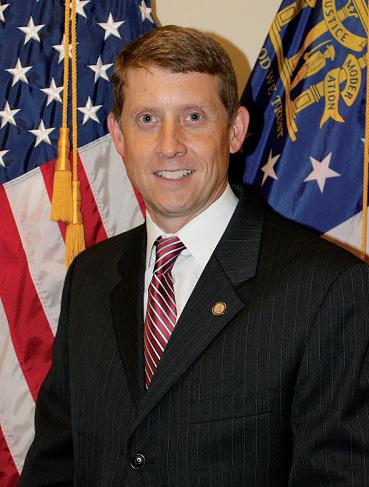
Both of my maternal grandparents died before I was born, and my father assisted my mother with their funeral arrangements. My parents were so impressed with the two funeral homeowners—husband and wife—that afterwards, my mother encouraged my father to open a funeral home, which he did in 1969. We now have two locations. One in Fort Gaines and one in Georgetown.
Why should someone consider a career in the mortuary business?
The funeral industry is one that allows a multitude of personalities to flourish. Individuals that are outgoing would enjoy being a funeral director, working with families in their time of need. Individuals that enjoy working alone may enjoy working in the embalming room; helping make the last vision of someone’s loved one a very pleasant and memorable one.
What surprised you the most about TCSG?
I was surprised that there were 22 colleges across the system and how well each college caters to the needs of the business community in their service delivery areas.
What would you tell other business leaders about TCSG?
I tell them that Georgia cannot grow without TCSG. Our colleges empower individuals to realize their dreams without needing to go to a four-year college. TCSG is building the middle-class right here in Georgia.
Carvel Lewis is funeral director for Lewis Mortuary and represents Georgia’s 2nd Congressional District on the State Board of the Technical College System of Georgia
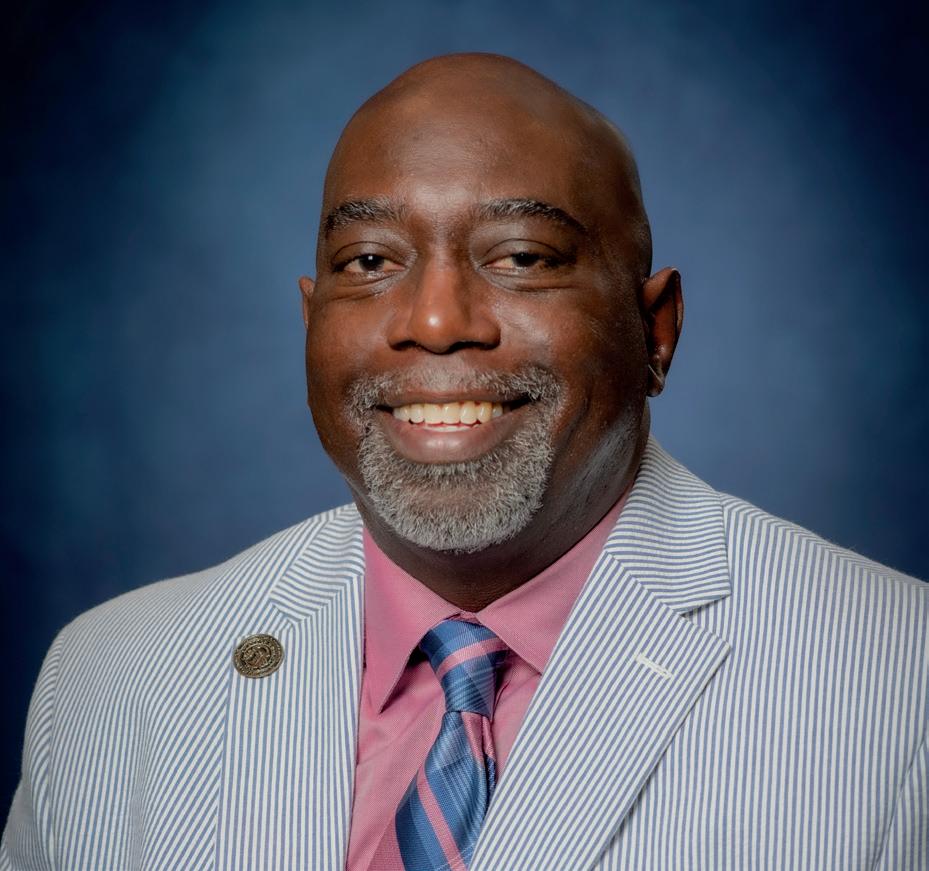
What do you think TCSG does best?
TCSG helps individuals realize their dreams. If someone wants to earn a certificate, a degree, or to enhance their skill sets, we provide all the tools necessary for someone to succeed.
What is your favorite book?
The Bible. The Bible is a love story, a drama, and a comedy. All aspects of life can be found in the Bible.
Favorite movie?
“The Color Purple.” No matter who you are or where you are in life, “The Color Purple” shows that you can overcome obstacles and regain a sense of self-worth and self-pride.
Favorite song?
“Don’t You Worry ‘bout a Thing.” I like the version by jazz fusion group, Incognito.
Any words of wisdom that you live by?
When I was at the White House in the early 1990s, former President George H.W. Bush asked me what I wanted to do in life. I told him that I wanted the dash between my date of birth and my date of death to be worthy of living. He said, “When you go home, become a part of the community.” So that’s what I did. I think if more people truly became a part of their community and cared about their community, we wouldn’t have half of the problems we have today.
























TCSG is proud to recognize the exceptional achievements of its students and instructors in the field of technical education. In 2023, four outstanding individuals stood out for their dedication, talent, and commitment to excellence.
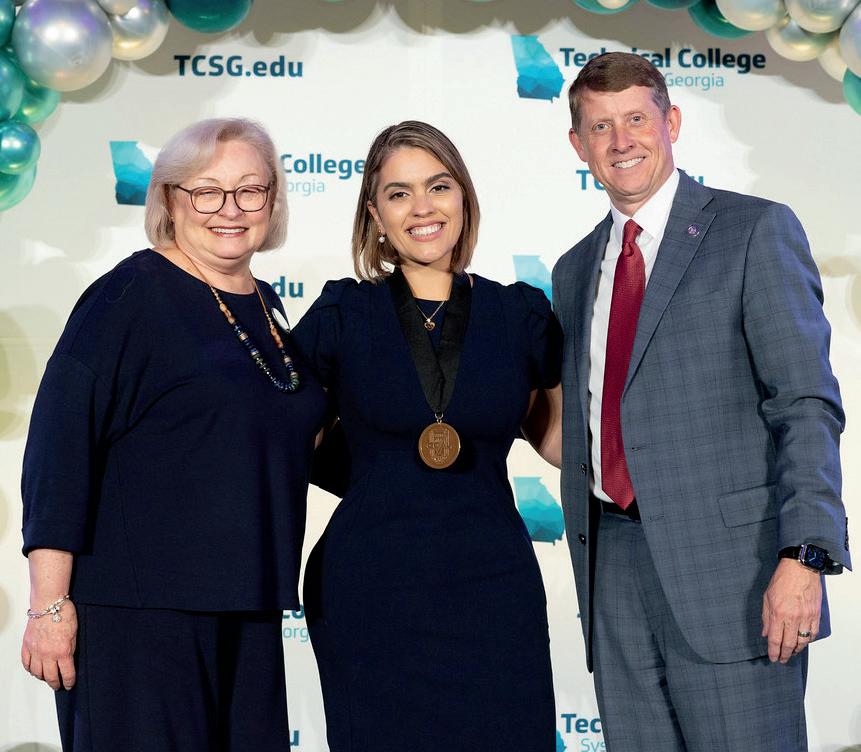

Baldwin, a mathematics instructor, received the prestigious Rick Perkins Award for Excellence in Technical Instruction. Kayla Hill and Tara Jenkins were honored as the Adult Education Student and Teacher of the Year, respectively.
Janette Velez, a student at Columbus Technical College, emerged as the GOAL winner, exemplifying exceptional leadership qualities and academic excellence. Her dedication to the field of esthetics, coupled with her strong work ethic, earned her this prestigious recognition. Janette’s passion for helping others and her commitment to learning have made her a standout student. Through her studies, she has developed the necessary skills to excel in her chosen field and contribute to the thriving beauty industry. Janette’s success serves as an inspiration to aspiring students, highlighting the possibilities that technical education offers.

The Rick Perkins Award for Excellence in Technical Instruction was bestowed upon Adrienne Baldwin, a mathematics instructor at Chattahoochee Technical College. Adrienne’s commitment to her students’ success and her innovative teaching methods set her apart as an exemplary educator. Through her dedication, she has fostered a love for mathematics in her students, making a traditionally challenging subject accessible and engaging. Adrienne’s passion for teaching and her ability to inspire students have left a lasting impact, shaping the minds of future professionals in technical fields.

Kayla Hill, a student at Lanier Technical College, was named the 2023 Dinah Culbreath Wayne Exceptional Adult Georgian in Literacy Education (EAGLE) Award winner for outstanding achievement in the state’s adult education program. Despite facing personal challenges, Kayla demonstrated resilience, determination, and a thirst for knowledge. Her commitment to self-improvement and lifelong learning has propelled her towards success. Through adult education, Kayla has gained valuable skills that have empowered her to pursue her career goals and overcome obstacles. Her story serves as a testament to the transformative power of adult education and the immense potential within each individual.
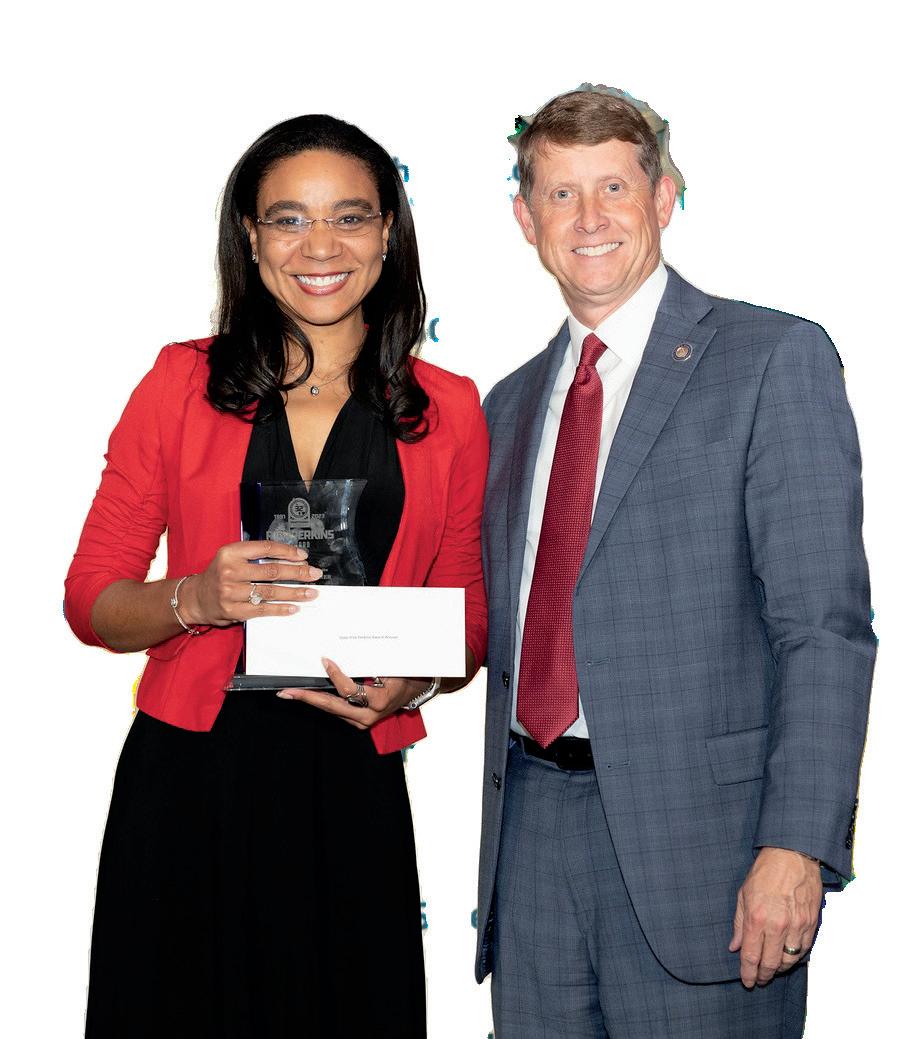

Tara Jenkins, an esteemed teacher at Augusta Technical College, was awarded the 2023 Outstanding Adult Education Teacher of the Year. Tara’s passion for teaching, coupled with her dedication to her students’ growth and success, makes her a true asset to the field of adult education. She demonstrates a deep understanding of
her students’ unique needs and implements innovative teaching strategies to cater to their diverse learning styles. Tara’s ability to inspire and motivate her students has helped countless individuals achieve their educational goals, opening doors to new opportunities and a brighter future.

 Central Georgia Tech nursing students Eddie Reese, Tanya Jones, Talisha Dorminey (l to r)
Central Georgia Tech nursing students Eddie Reese, Tanya Jones, Talisha Dorminey (l to r)
TCSG is tackling the nation’s nursing workforce shortage through community partnerships and innovative ideas
By Christy SimoIf you’ve ever spent time in a hospital, you no doubt remember the nurses who cared for you or your loved one. Doctors pop in from time to time, but it’s the nurses who check your vitals, help you to the restroom, and generally make sure you’re recovering OK.
But Georgia – and the entire country – is facing a future where nurses, the very people who care for us at our must vulnerable, will be in severely short supply unless something is done now to increase their numbers.
“If you ask 100 healthcare providers at the hospital level, all 100 would say to you, the No. 1 problem right now is the workforce shortage around nursing,” says Central Georgia Technical College (CGTC) President Dr. Ivan Allen. “The shortages are everywhere. They’re from your bedside nurse all the way through ICU.”
And that was before the pandemic, which prompted many nurses to change careers or retire. Now, according to the Health Resources and Services Administration, Georgia alone will have a shortfall of 6,700 nurses by 2025.
“We were aware of the nursing shortage prior to the pandemic, but the pandemic brought an awareness at a more urgent time that we need to do something innovative, something now to address the nursing shortage,” says Albany Technical College President Dr. Emmett Griswold.
Luckily, the Technical College System of Georgia (TCSG) is addressing this challenge with innovative ideas and solutions that are immediately ramping up the pipeline.
“Across the board, there is no area of nursing that’s ‘at capacity,’” agrees Dr. Jermaine Whirl, president of Augusta Technical College. “So, we’re doing everything we can to try to fill that workforce need.”
From creative partnerships with local healthcare systems to add more faculty and classroom space to study abroad programs and introducing the field to younger students, TCSG is moving at lightning speed to provide the state’s healthcare systems with quality, dedicated nurses who are committed to providing the best care.
In rural Southwest Georgia, there is no shortage of students interested in becoming nurses. Albany Technical College currently offers 15 different healthcare programs, including nursing, practical nursing, and phlebotomy. But space was tight, and the college required more room to grow and expand. Plus, the main healthcare system in the area, like hospitals everywhere, needed more nurses.
Some 85% of Albany Tech’s nursing graduates are hired right out of college by Phoebe Putney Health Care System, which on average needs about 300 more nurses at its facilities.
“We really needed to have a big play here in Southwest Georgia to increase capacity,” says Scott Steiner, president and CEO of Phoebe Putney Health System.

To address that shortage, Albany Tech committed to increasing its nursing graduates from its existing 40 students a year to 200 by 2024 as the first phase of its Living and
Learning Initiative. But in order to do that, they needed more space.
“They just didn’t have the teaching space to accommodate that,” Steiner says. “So, we said we will make a major investment.”
The healthcare system provided $40 million to build a new nursing school for Albany Tech on its campus. It’s the second phase of the initiative.
When completed for fall 2024 classes, the 130,000square-foot facility, located in the historic Albany High School across the street from the main hospital, will feature 47,000
square feet of teaching space, including telehealth-enhanced classrooms and a health career education center. The second and third floors will feature 80 one-bedroom furnished apartments to provide affordable housing for nursing students. In all, the space will quadruple the number of nurses graduating from the school.
In middle Georgia, CGTC, which welcomed its first class of nursing students in 2016, recently expanded its Associate of Science in Nursing program. A new cohort of 40 students started at its Milledgeville campus in fall 2022. It’s also renovating existing facilities to accommodate more students. “So now we’ll go from zero a few years ago to 120 pretty quickly,” Allen says.
On the east side of Georgia, Augusta Tech faced similar challenges. Its nursing program was busting at the seams, and classrooms were a hot commodity. But the process to construct a new building on campus is typically a lengthy one that involves approval from the state legislature.
“If you’re successful, you would get design money in year one, construction money in year two, then funds for equipment and technology and furniture in year three,” Whirl says. “So, you’re looking at 2024, 2025 before you can even attempt to get a larger space to deal with the issue.”
“We really needed to have a big play here in Southwest Georgia to increase capacity.”
- Scott Steiner, president and CEO of Phoebe Putney Health SystemScott Steiner, President and CEO of Phoebe Putney Health System
Across town, Piedmont Augusta was looking for a way to use its Summerville campus. The 231-bed acute-care facility had served the Augusta area since 1952, most recently as an overflow space to care for COVID patients during the pandemic. But now it was sitting idle – and it was perfect for the college’s needs. So, when Whirl reached out to the Piedmont Augusta Foundation to see if there was anything they could do to help, a new home for Augusta Tech’s School of Health Sciences was born.
The hospital invested $1.8 million to convert the campus into a teaching space. The medical office building was transformed to house classrooms, faculty offices, a library, and more. The hospital was re-envisioned as a place where students can do their hands-on clinical rotations.
In January 2023, Augusta Tech cut the ribbon on the new facility, which now houses 23 programs of study, from surgical technology and respiratory care to radiologic technology and nursing.

“The students started showing up the next Monday,” says Laurie Ott, president of Piedmont Augusta Foundation. “Our hospital that we purchased out of bankruptcy is now filled up and a dedicated campus to Augusta Tech’s allied health sciences. It’s really exciting.”
Typically, nursing students practice in a space that simulates a hospital or inpatient environment. But this is a real hospital that only a few years ago was treating patients. Students can work with millions of dollars’ worth of current technology and equipment and can move through the different spaces of a real hospital just like they would on the job.
“We can have our EMT students back up the truck into the emergency room. They can take a mannequin off the back of that truck, roll ‘em in the hospital, check them in. Take them to an operating room, take them to a nursing station and a nurse. … You can’t simulate that.”
Whirl says that type of environment is virtually unheard
of in higher education, where every one of the students can move through real time and interact with other allied health students in different disciplines, working together as team. “It’s such a cool experience,” he says. “Our students know what that will look like once they go to work. And that will make the student’s [experience] so much more seamless, because it’s an interdisciplinary education.”
Even with all the new space to welcome new nursing students, if there aren’t enough faculty to teach those students nor financial support to encourage students to get their degree, a nursing program can’t grow.


To address those issues, Georgia’s healthcare systems are stepping up to support TCSG’s efforts to increase its faculty and student numbers through new marketing, recruitment efforts, and financial support.
This is especially crucial in nursing schools, as the student-faculty ratio is set by the Georgia Board of Nursing at 10/1 to ensure the safety for all involved.
In Middle Georgia, Houston Healthcare is offering its nurses the opportunity to gain hours as instructors when CGTC nursing students come to the hospital. The Dedicated Education Nurses (DEN) program combines 180 hours of clinical work by students with the supervision and mentoring of professional nurses volunteering their time to teach in a hospital environment.
“It broadens the opportunity for more nurses to get the practical training they need here in our hospital,” says Charles Briscoe, CEO. “When we’re able to bring in additional nurses in the hospital setting, we’re able to provide more clinical training slots in the hospital.”
In Southwest Georgia, Albany Tech is looking outside its coverage region to draw high-quality faculty to Albany. Phoebe Putney Health System is footing the bill, hiring a recruiter specifically to seek out new nursing faculty and providing financial support to boost pay once they are hired.
“We have to give opportunities for others to relocate to Southwest Georgia to become educators,” says Griswold of Albany Tech. “Phoebe has also offered to pay a relocation package for those individuals who want to come here and teach. So, they’ve been a tremendous partner with us.”
Augusta Tech, too, is investing in new faculty, with plans to add eight more nursing teachers over time. “That will allow us to go from 60 students to serving over 200 students,” Whirl says. “Within five years, we want to be able to graduate 200 nursing students a year.”

And while there’s no shortage of students wanting to become nurses, it’s important that everyone who wants to become a nurse has that opportunity.
The state’s HOPE Career Grant already offers 100% free tuition to students pursuing a degree in practical nursing and other allied health degrees, but there are still many students who need assistance.
“If there’s somebody who has a desire and the aptitude to be a nurse, there shouldn’t be any barriers,” says Ott of the Piedmont Augusta Foundation. “We’re not in a position where we can say, well you want to be a nurse but it’s just financially not possible, so sit on the sidelines. The pandemic proved that we can’t have people sitting out a career if they want to contribute.”
To ensure every student who wants to get a nursing-related degree at Augusta Tech has the chance to do so, Piedmont Augusta Foundation established a scholarship fund with support from donors in the local community. By the end of 2022, they had raised more than $1 million, and the first two recipients are already getting support to cover their nursing school tuition fees and books at the beginning of 2023.
“We’re going to take somebody who otherwise would have a barrier to nursing education and create a member of the healthcare workforce,” Ott says, noting the strong partnership between Augusta Tech, its president and deans of the health sciences school and nursing programs to make this happen. “It is so important for us to have partners like that who understand the urgency and want to do everything
possible to make this partnership not just survive but thrive.”
As part of the scholarship requirements, the students agree to work with Piedmont Augusta at one of its facilities for a set period of time.
“In exchange for covering their expenses, they basically have a guaranteed job after graduation with Piedmont,” Whirl says. “The beauty of that is for the student, they come out with no debt [and] a guaranteed job.”
Whirl notes that 95% of Augusta Tech’s graduates stay in the area, and the average age of a nursing student is 26. “They’re raising families here, they want be here in Augusta,” he says. “So that’s a big win for them, to be able to have a local employer to make that investment where that they know they can have a long-term career.”
Augusta Tech’s partnership with Piedmont Augusta is just one of many innovative ideas Georgia’s technical colleges are dreaming up to tackle the nursing shortage from all sides.
They’re also partnering with other colleges on study abroad programs to enrich a student’s experience and connecting with Georgia’s career academies to show kids the careers you can have in healthcare at an earlier age.
This year, CGTC welcomed its first study abroad program in the Caribbean. Thirteen students spent 10 days in St. Vincent and the Grenadines in partnership with Trinity Healthcare. Students volunteered at the local hospital and healthcare clinics, trained local healthcare workers in best practices, and obtained crucial community outreach skills. This type of service-oriented learning opportunity is rare – CGTC is the only technical college in the state to offer something like this.



“If there’s somebody who has a desire and the aptitude to be a nurse, there shouldn’t be any barriers.”
Laurie Ott, Piedmont Augusta Foundation PresidentHouston Healthcare President and CEO, Charles Briscoe Central Georgia Technical College nursing student Tanya Jones
“You just don’t see that in a typical technical college setting often, if ever. And Central Georgia Technical College is out there doing that kind of training,” says Houston Healthcare’s Briscoe, who traveled with the first cohort of students earlier this year. “It was just a wonderful experience to share some knowledge with that country, but also expose those students to a healthcare system different from ours, just to get a little more perspective on life and on the opportunities of the career they’re pursuing.”
“The hope is with the training we’re doing, especially in healthcare and in other areas around the world, we are preparing students who can not only go anywhere, apply their trade, understand cultural barriers, and overcome them to be successful in their own careers,” Allen says, “but also to lift others in communities around the world.”
CGTC is stretching the pipeline even longer by partnering with several career academies around the region to show kids in high school the potential that lies in a nursing degree.
Since 2007, Georgia has established more than 50 career academies around the state. The schools are designed to offer high school students access to accredited college-level courses and technical certification programs. Through its Scrubs program, CGTC invites high schoolers to one of its campuses to see demos, walk through the lab and teaching areas, and talk with nursing faculty.
“We’re trying to get those 9th, 10th, 11th graders interested,” Allen says. “We are educating the next generation on all the opportunity in these healthcare careers.”
“That’s the wonderful thing about Central Georgia Technical College – Dr. Ivan Allen and his staff. They’re always looking at creative ways to get a goal achieved,” Briscoe says. “Even if it’s a goal that people say will never happen, that team seems to find a way.”

Through all these efforts, Georgia’s technical colleges will be adding hundreds of new nurses to the state’s healthcare system. And that bodes well for not just the hospitals, but also the communities they serve.
“To have true workforce development and true community progress, all facets of a community’s infrastructure must work. That includes the education system, and it includes the healthcare system,” Allen says. “It’s a concerted community effort.”

 (From top): Albany Technical College President Dr. Emmett L. Griswold, Central Georgia Technical College President Dr. Ivan Allen, Augusta Technical College President Dr. Jermaine Whirl
(From top): Albany Technical College President Dr. Emmett L. Griswold, Central Georgia Technical College President Dr. Ivan Allen, Augusta Technical College President Dr. Jermaine Whirl
“The hope is with the training we’re doing, especially in healthcare and in other areas around the world, we are preparing students who can not only go anywhere, apply their trade, understand cultural barriers, and overcome them to be successful in their own careers, but also to lift others in communities around the world.”
Dr. Ivan Allen, President, Central Georgia Technical College
More than 1 million adults in Georgia lack a high school diploma or equivalency, according to the American Community Survey 2021 five-year estimates. To help bring those numbers down, TCSG’s Office of Adult Education (OAE) provides the resources and tools adults need to earn their high school equivalency diploma. In addition to high school equivalency preparation, Adult Education programs throughout the state also offer English as a Second Language (ESL) instruction, civics education, family literacy programs, and workforce training. The following stories represent a few of the countless ways Adult Education programs are changing the lives of Georgia families and helping adults build a bridge to success to fill critical workforce needs.
At the age of 18, Katherine Ballard applied to college but was turned away because she did not have a high school diploma. Katherine was home schooled and learned that her high school diploma was not accredited. She enrolled in the Adult Education program at Lanier Technical College (LTC) and after six months of diligent study, she earned her GED high school equivalency diploma. After being named the 2018 Exceptional Adult Georgian in Literacy Education (EAGLE) state winner, Katherine began her postsecondary journey by enrolling in LTC’s nursing program.
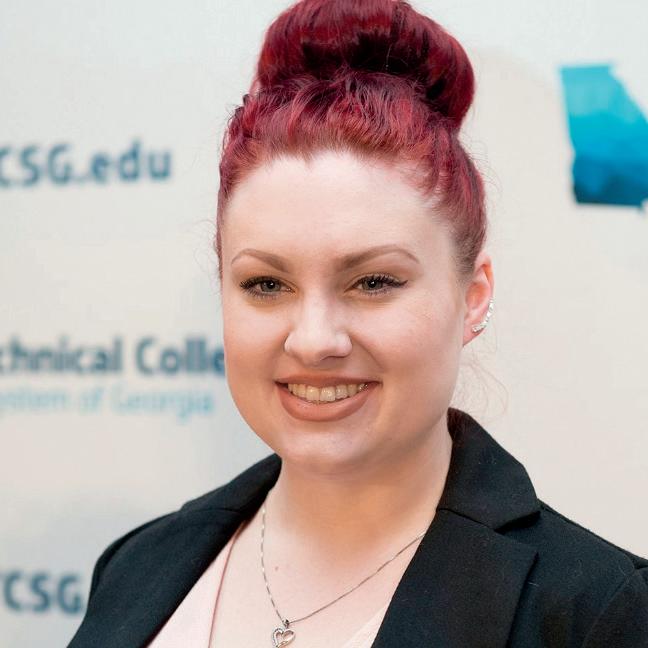
Katherine first earned a technical certification of credit (TCC) as a certified nursing assistant from LTC. Very quickly, she decided to return to school and completed LTC’s first Associate of Science in Nursing program and earned her license as a registered nurse (RN). Currently, she is working as an RN at Northeast Georgia Medical Center Braselton, while also being a mother to her four children.
Katherine believes that the Adult Education program at LTC played a significant role in her success. The program helped her prepare for the GED test, pursue higher education, and opened doors to greater financial opportunities. Before the Adult Education program, Katherine mostly worked at fast food restaurants and grocery stores. During that time, she and her husband struggled to make ends meet and often had to subsist on rice due to their financial situation. However, thanks to the education and training she received, Katherine is now a registered nurse and can provide a better life for her family. She hopes to inspire her children to pursue their education and achieve their dreams as well.
In high school, Clifford did not have the right role models and ended up leaving school to pursue work. “When I realized I could get hired without a high school education, I just kept working, but that was only minimum wage.” As he started his journey in Adult Education at Albany Technical College, he learned about the Career Plus program. The Career Plus program offers students the flexibility to enroll in college even if they did not finish high school and pursue high-demand career pathways. Wanting more for himself and his family, he decided to enroll in Career Plus where he earned his high school diploma and two Diesel Mechanic technical certificates of credit at the same time.

In September 2021, Clifford was one of the first students in Georgia to earn his Career Plus diploma and he now earns a family-sustaining wage working as a diesel mechanic. “I actually plan to take this degree and use it as a stepping stone so later down the line I can have my own shop, my own business.”
Manuel Bueno came to America after growing up in Mexico where educational opportunities were limited in his hometown. He was working late hours, especially on the weekends, and decided he wanted to find a better job so he could spend more time with his family. In 2004, Manuel enrolled in the English as a Second Language (ESL) program at Gwinnett Technical College (GTC) because he knew his first step toward a better career was to learn English. He later enrolled in GED preparation classes to earn his high school equivalency (HSE) diploma—all while continuing to work full-time.
As he was close to finishing his HSE, GTC offered him an opportunity to participate in Training on the GO, a workforce training program where he could earn his welding certificate and finish his HSE diploma at the same time. Manuel appreciated the hands-on opportunities to practice the job while finishing his diploma, and after completing the two-month program, he already had three job offers.
Upon completing Training on the GO and graduating with his HSE diploma and welding certification, Manuel began working as a welder at Porter Steel. In addition to supporting his family financially, Manuel is now able to be there for his children when they need him and enjoy the special moments, like watching his son play baseball on the weekends. “I personally thought I was too old, but obviously, it’s never too late to learn.” Manuel continues to advance his career by learning additional welding specialties and participating in leadership development training sponsored by his company.

The HOPE High School Equivalency (HSE) Examination Grant can help Georgians finish high school for free! Signed into law by Gov. Brian P. Kemp, the HOPE HSE Examination Grant provides eligible Georgians with an award not to exceed $200 to cover the cost of a state-approved HSE exam. The grant is available to all Georgians who qualify and is currently available for the GED test.
Adult Education providers across the state also offer free classes with flexible schedules to help Georgians prepare for their HSE test. The new HOPE HSE Examination Grant has removed additional financial barriers to enable more Georgians to earn their high school equivalency diploma.
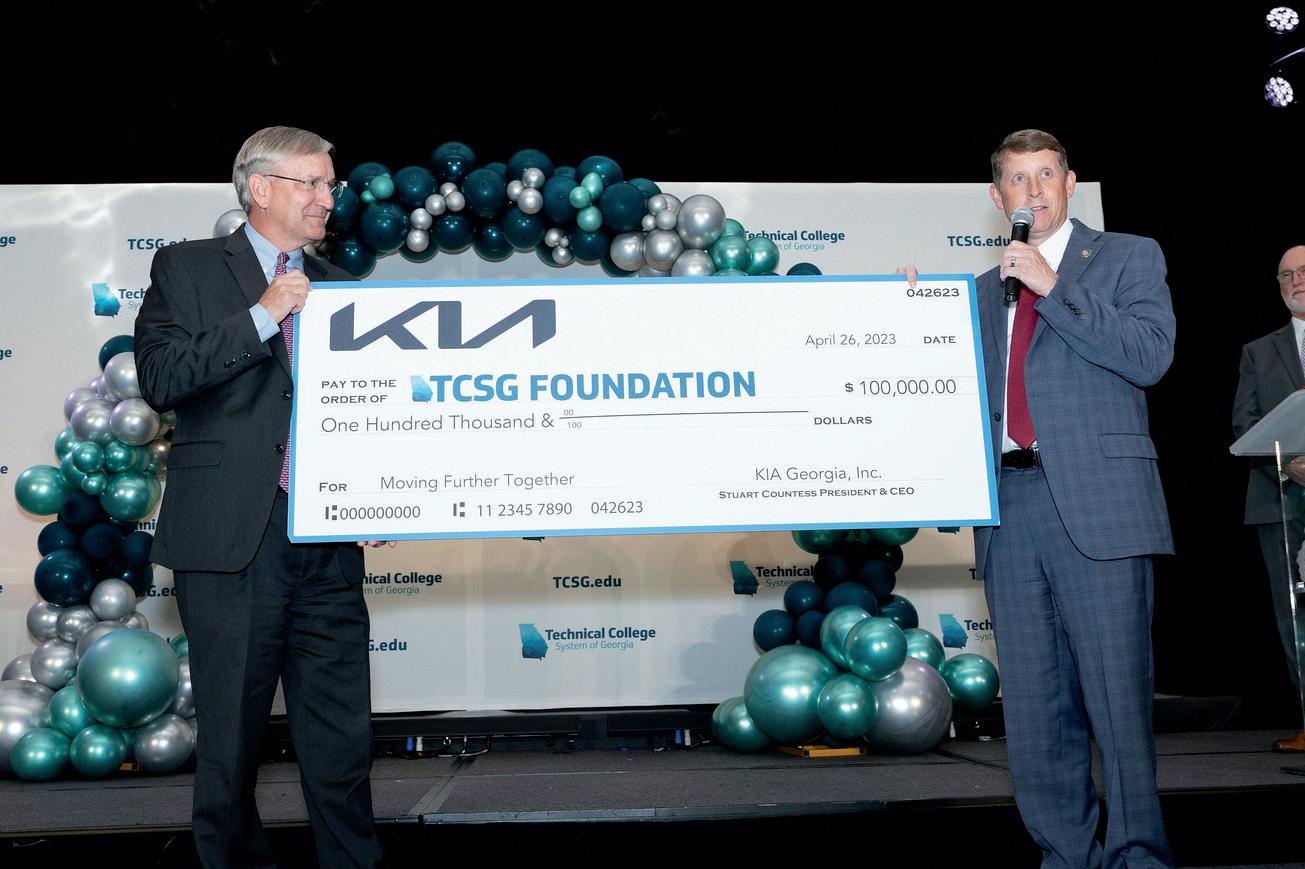
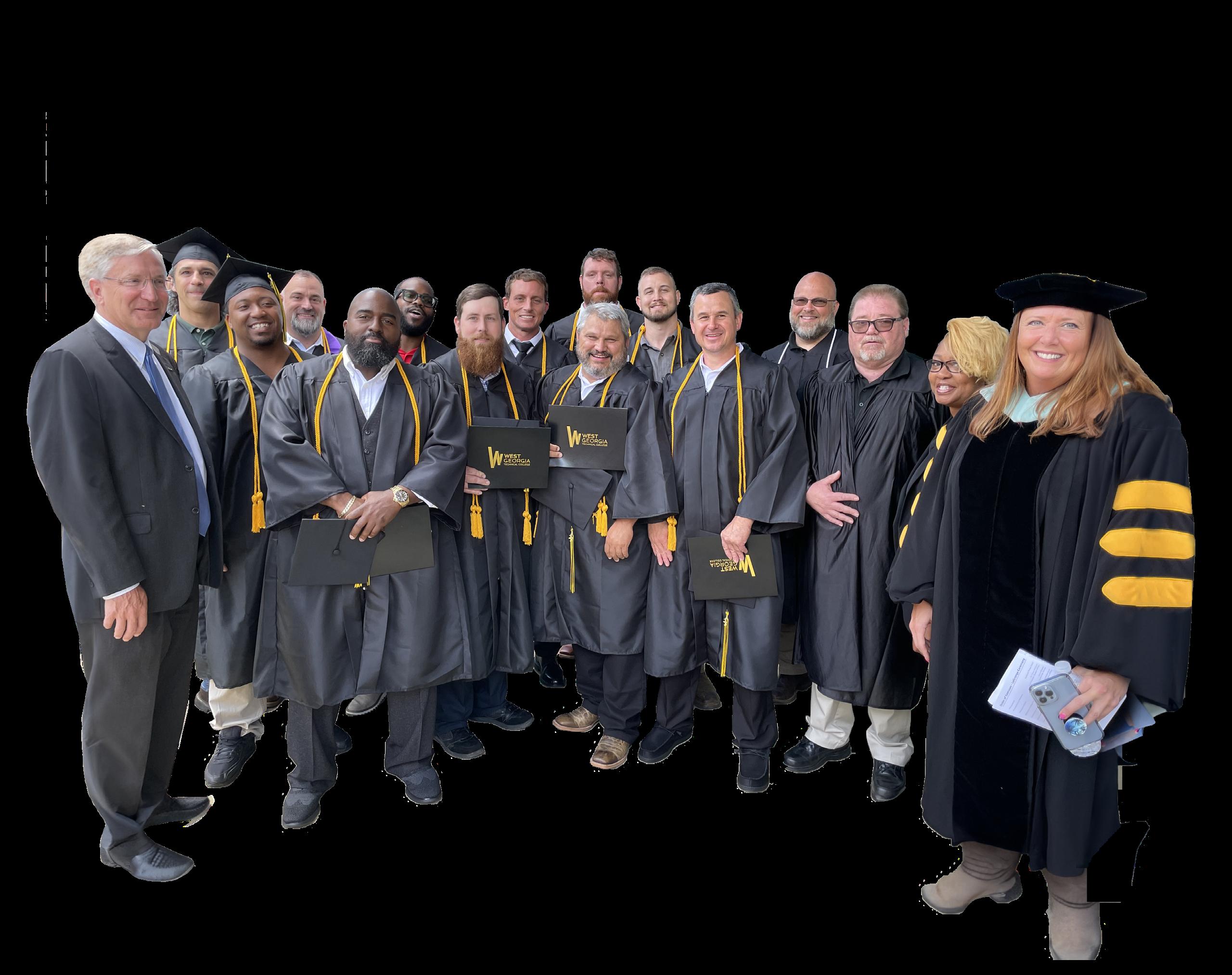
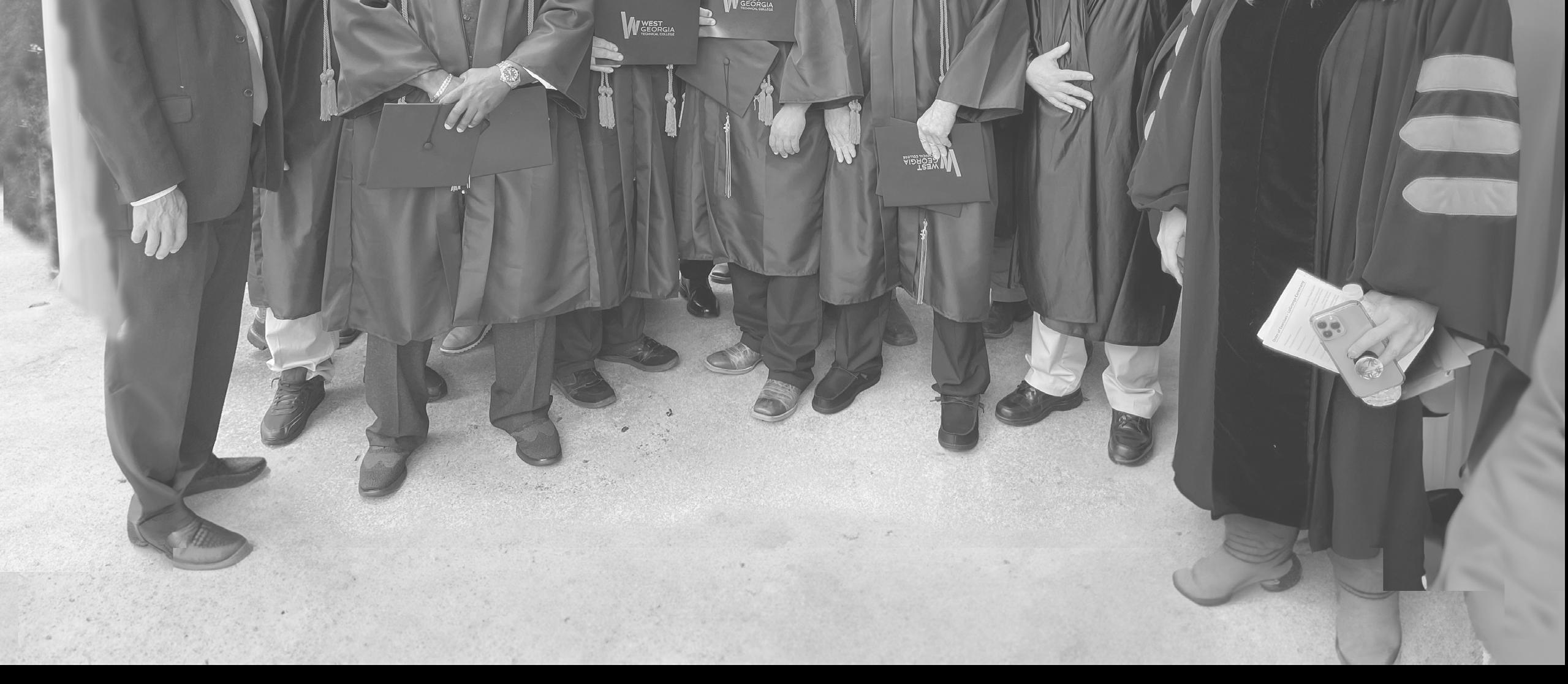
Kia Georgia recently demonstrated its unwavering commitment to education and workforce development by presenting a generous donation of $100,000 to the Technical College System of Georgia (TCSG) Foundation. This significant contribution was announced at a prestigious event in Atlanta, where TCSG’s top students and instructors were honored. The donation not only symbolizes Kia Georgia’s dedication to fostering a skilled workforce but also exemplifies its commitment to supporting the growth and success of Georgia’s technical college students.
At the annual Georgia Occupational Award of Leadership (GOAL) and Rick Perkins Awards banquet in Buckhead, Stuart Countess, president and CEO of Kia Georgia, took the stage to present the $100,000 check to the TCSG Foundation. This act of generosity underscores Kia Georgia’s recognition of the immense value that technical college education brings to the state’s workforce.
Since 2016, Kia Georgia has been a steadfast partner in the pursuit of educational excellence. The company has provided funding to award the state GOAL winner with a brand-new Kia vehicle as the grand prize. This year’s winner, Columbus Technical College’s Janette Velez, drove away in a 2023 Kia K5, a testament to Kia Georgia’s commitment to investing in the future of Georgia’s students.
Kia Georgia’s $100,000 donation goes beyond paying for the grand prize vehicle. The remaining funds of more than $72,000 are allocated to The Last Mile Fund, which serves as a vital resource for over 131,000 technical education students within TCSG. This Fund provides financial assistance to students who are at risk of dropping out of college due to the inability to pay tuition or fees to their respective college.
Technical College System of Georgia Commissioner Greg Dozier expressed gratitude toward Kia Georgia, acknowledging the company’s invaluable partnership and commitment to the state. He highlighted the lasting impact that Kia’s donation would have on technical college students, as it enables them to acquire the skills needed for successful careers in various industries.
Kia Georgia has consistently partnered with TCSG to foster growth and provide unique opportunities for students. One notable collaboration is the Maintenance Certification Program, developed in conjunction with Quick Start. This program aims to upskill production team members at Kia Georgia to perform maintenance tasks on the company’s state-of-the-art production equipment.
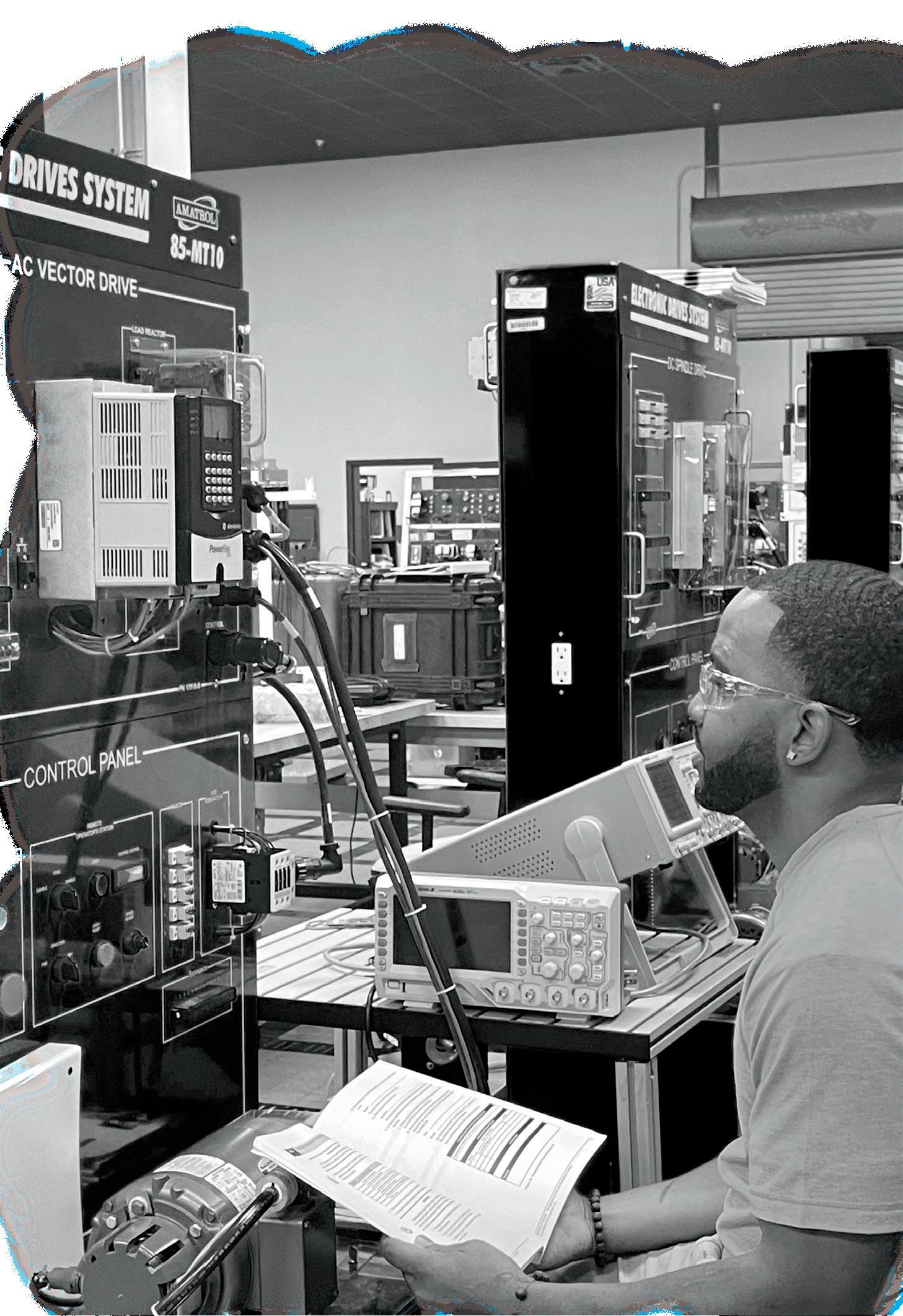
The success of this program prompted its expansion to West Georgia Technical College, where it was integrated into the college’s standard offerings. By equipping students
with in-demand maintenance skills, the program not only addresses Kia Georgia’s own workforce needs, but also caters to the broader requirements of local manufacturers. This collaboration serves as a prime example of Kia Georgia’s commitment to creating a skilled workforce that meets the evolving demands of Georgia’s industries.
Through its manufacturing facility in West Point, Kia Georgia has not only made a significant economic impact on the state but has also showcased its commitment to cuttingedge technology and sustainable practices. The company’s investment in advanced manufacturing and the upcoming production of the Kia EV9 in Georgia further cements its position as an industry leader in innovation.
Kia Georgia’s visionary leadership, embodied by Countess, has set a remarkable example for corporate citizenship. The company’s contribution to technical education will not only create opportunities for students, but also enhance the overall competitiveness of Georgia’s workforce.
This collaboration serves as a prime example of Kia Georgia’s commitment to creating a skilled workforce that meets the evolving demands of Georgia’s industries.
TCSG

Imagine a training program that is customized down to the person, while also being specifically designed for your business. A program that provides on-thejob technical skills to someone who is committed to working at your business long-term. All with financial support to make it happen.
Sound like a dream situation? Here in Georgia, it’s happening right now through dozens of apprenticeship programs at Georgia’s 22 technical colleges. “An apprenticeship gives an opportunity for someone to gain immediate employment at a lower salary, then get into a formalized training program so they can grow into their future job at their company,” says Tim McDonald, president of Lanier Technical College, which serves a seven-county area in Northeast Georgia. “It’s a great opportunity for someone who is looking for immediate employment, but still wants to get the training to increase their skills and knowledge to have upward mobility on the job.”
In an apprenticeship, a business partners with the Technical College System of Georgia to train one to several people on the job for a specific skill set. The company pays a wage that increases through the apprenticeship, and the employee also commits to taking classes related to their apprenticeship.
“Everybody’s looking for talent across the state,” says Dr. Irvin Clark, president of Southern Crescent Technical College, which covers an eight-county area south of Atlanta. “Apprenticeships are a proven model to resolve that issue because it allows employers to look within their organizations to upskill an employee … for a high demand sector job that they’re having a hard time recruiting externally. But it also allows a company to attract talent into an organization. A lot of people want to attend college, but they also want work.”
The concept of apprenticeships is nothing new – they’ve been an important way of learning a trade since the Middle Ages. But with the increased emphasis on a fouryear college education during the late 20th century, their popularity dipped.

With the current job market, however, many are discovering that apprenticeships are a viable way to gain an education and start a high-paying career without incurring a ton of student debt. And employers are also finding that in today’s hiring climate, hand-picking future employees and providing them an education that is tailor-made to the culture and needs of their own company is a successful avenue for both long-term employee loyalty and business growth.
“It presents this opportunity for industry to really grow their talent,” says Dr. Clark. “It contributes to retention of that employee. It allows for a business to really be innovative in terms of how they provide workforce training for their employees. And it engages this synergy with the local technical college.”
According to the most recent statistics from the U.S. Department of Labor, there have been more than 2 million new apprentices nationwide since 2012, a 64% increase over the past decade. Here in Georgia, in 2021, there were 9,380 people participating in apprenticeships, 2,828 of which were new. And that number continues to increase every year.
There are several reasons why the workforce training model is gaining in popularity. For one, it allows apprentices to earn a wage while they learn a trade on the job. Then there’s the rising cost of college tuition, which may encourage some students to seek out alternative paths to high-wage work. Plus, there’s the growing demand for people who have the technical skills needed for specific jobs in Georgia’s in-demand industries.
Georgia’s technical colleges have offered apprenticeships for some time, in partnership with the U.S. Department of Labor, and are the state’s largest network of registered apprenticeship sponsors. Now, thanks to support from both the Georgia legislature and the governor, the number of apprenticeships offered in Georgia is growing exponentially.
Last year, Gov. Brian Kemp and TCSG established the
Southern Crescent Technical College apprentices, Jadon Williams (r) and Amari Reddingfirst-ever state-funded apprenticeship expansion program. The $1 million High Demand Career Initiative (HDCI) Program awards up to $50,000 ($10,000 per apprentice) in funding to Georgia business to train students and upskill existing workers through registered apprenticeships in 11 high-demand fields like healthcare, advanced manufacturing, and construction, creating 120 new apprenticeships.
Also in 2022, a $4.2-million Apprenticeships for Economic Recovery Grant was established to create apprenticeships for industries critical to Georgia’s economic recovery post-pandemic. This will support more than 900 new apprentices in strategic industries like healthcare, logistics, and broadband. The Apprenticeship State Expansion Grant will support an additional 685 apprentices and 127 Georgia employers.
Anyone can become an apprentice – current TCSG students, existing employees, high schoolers over the age of 16, even someone who is not attending college but wants to launch their career in a specific industry.
“We have apprentices who are young, who are just getting into the workforce and taking advantage of an opportunity,” says Cory Addison, director of business and industry for Lanier Tech. “We have apprentices who have been in the workforce for five+ years, and they’re going back and continuing their education and taking advantage of those opportunities that are out there.”
“It’s a great opportunity for someone who is looking for immediate employment,” McDonald adds, “but still wants to get the training to increase their skills, increase their knowledge to have upward mobility on the job.”
Georgia has been named the top state to do business for several years in a row, and that translates to a lot of companies coming to the state – and a lot of existing businesses looking to grow. An apprenticeship program can help many employers do just that.
“We have so much growth in our area, and manufacturers are very desperate to hire new individuals. But we’re also learning that they’re just as desperate to upskill their existing workforce,” Addison says. “So, for businesses in our area, there’s such value when our apprentices are coming through and gaining that additional training. It’s helping to close the skills gap.”
PeterBilt of Atlanta is one such company that turned to TCSG and its apprentice programs to grow its workforce. The truck manufacturer needed more diesel technicians, so Southern Crescent Technical College (SCTC) put together a special career day just to recruit apprentices for PeterBilt.
“We had a great turnout that night,” recalls Lemuel Mercado, dean of academic affairs.
Anyone interested in an apprenticeship with PeterBilt – whether SCTC students, existing PeterBilt employees, or someone just interested in starting a career in diesel mechanics – was invited to attend. The school’s admissions and financial aid teams were there to assist with registration and financial support as needed, and each person interviewed with the PeterBilt staff.
“Two days later, they sent me the names of the five candidates they selected, and then they became apprentices,” Mercado says. That group is currently working through their two-year apprenticeship at PeterBilt.
“It’s going very well,” says Scott Pearson, president of PeterBilt of Atlanta. “The neat thing about it is we get exposed to young people as they enter the trade. We can
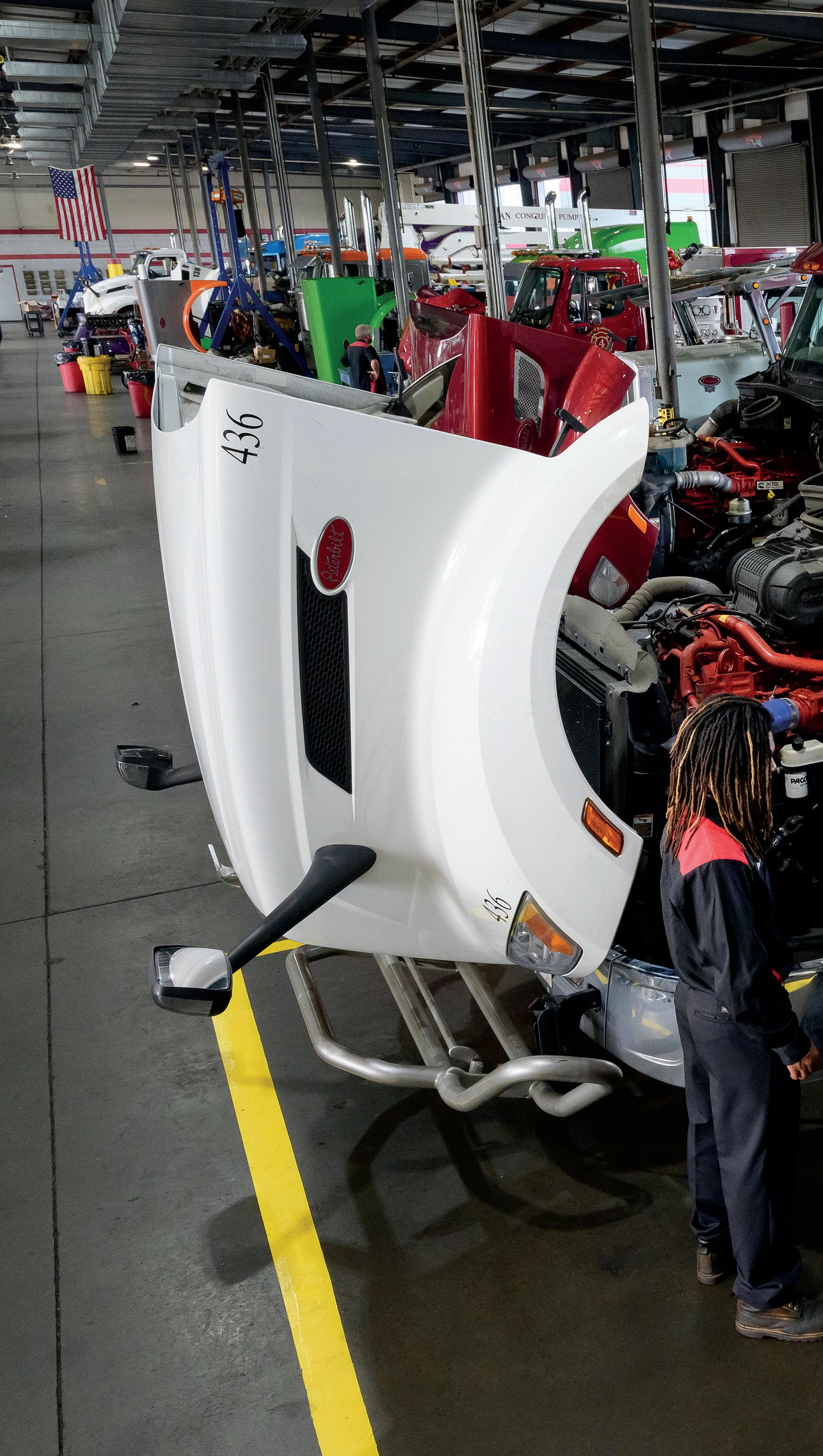
see their performance, how well they do what they’re doing. We get the opportunity to get them on board quickly and help them understand our culture while they’re learning their skill set.
“It goes beyond just classroom or hands-on in a laboratory,” he adds. “They’re learning what it’s like to be in a shop environment. It’s a production environment. You’ve got customers waiting on their truck. … So, you’re building their skill set and their knowledge with an understanding that this is a true profession, not just further education.”
Like with PeterBilt, each apprenticeship is tailored to the company and its needs.


“When we do apprenticeships, what’s happening is the company is selecting the specific courses they want their
employees to take, a lot of times in the order they want them to take them so that they can match it up with their in-house or on-the-job learning opportunities,” McDonald says.
“That’s the piece that makes the apprenticeship so powerful. We work with the company to match the technical training or the technical instruction up to the on-the-job learning and the competencies that they’re mastering on the job.”
Apprenticeships help with employee retention, too.
“When companies invest in these apprenticeships, they tend to have less turnover,” says Addison. “Because the apprentice knows that the companies are investing in them.”
continued on page 28
What is a registered apprenticeship program?
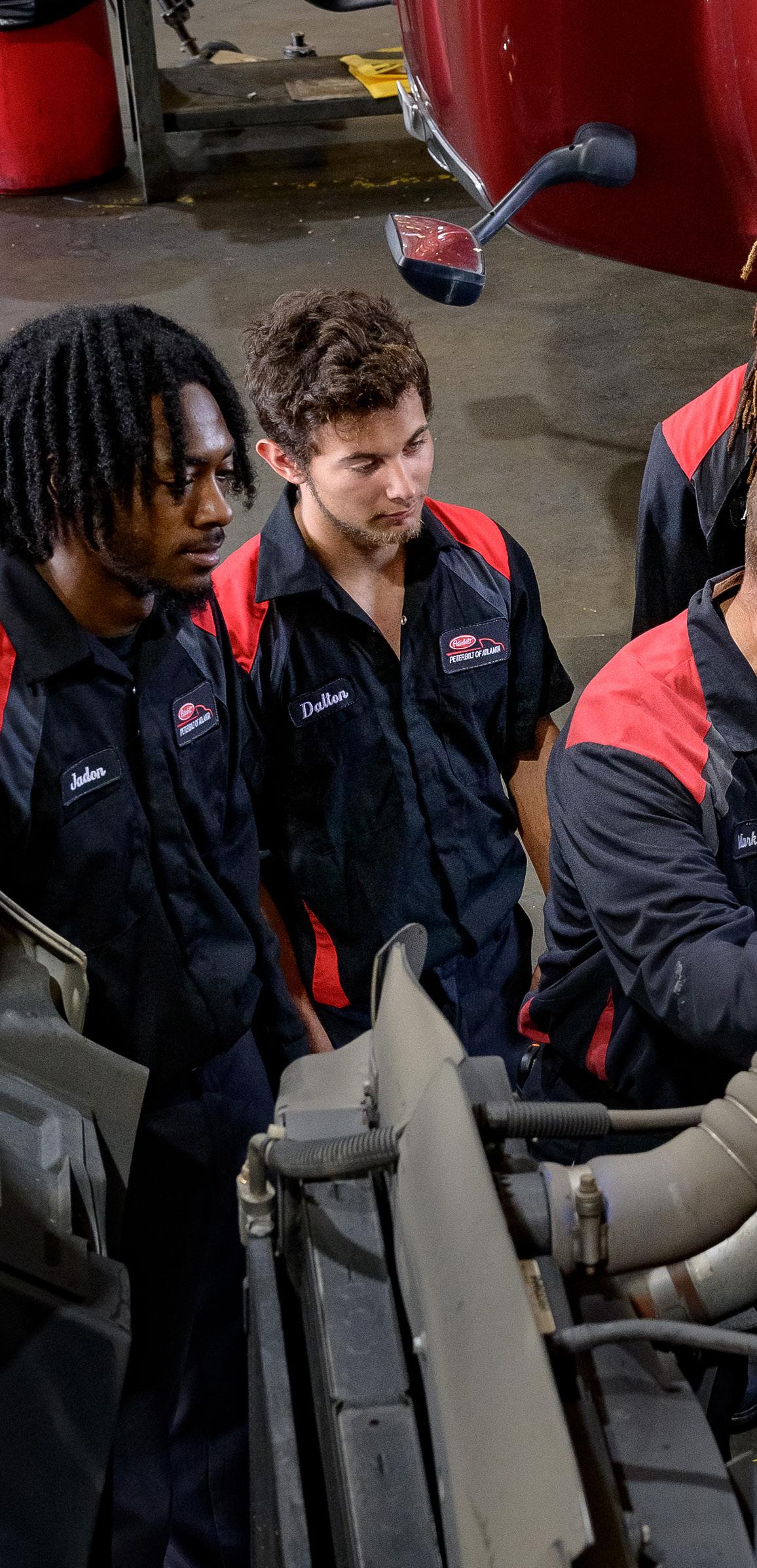
A training model that is registered with and follows the U.S. Department of Labor guidelines
Requires at least 2,000 hours of on-the-job training
Requires 144 hours of classroom instruction
Is completed in 1 to 5 years (typical length is two years)
Must be 16 years + to participate
The state of Georgia offers several grants to businesses and students participating in an apprenticeship program in Georgia. For more information on these opportunities, visit tcsg.edu/ worksouce/resources-for-practitioners
Provides funding up to $4,400 per apprentice to offset the costs of tuition, training fees, books, supplies, and assessments for eligible apprenticeship programs in occupations critical to the economic recovery of the state post-pandemic, including manufacturing, healthcare, and transportation, distribution, and logistics.
Provides funding of up to $10,000 per apprentice (5 apprentices/$50,000 max) directly to employers for the successful completion of apprenticeships. Program occupation must be included as one of the High Demand Careers for Apprenticeship. (See tcsg. edu/HDCI for list.)
Combined with other apprenticeship-funding opportunities, this grant, which provides free tuition in 19 qualified programs of study, can fully cover the cost of an eligible apprenticeship program Related Technical Instruction (RTI).
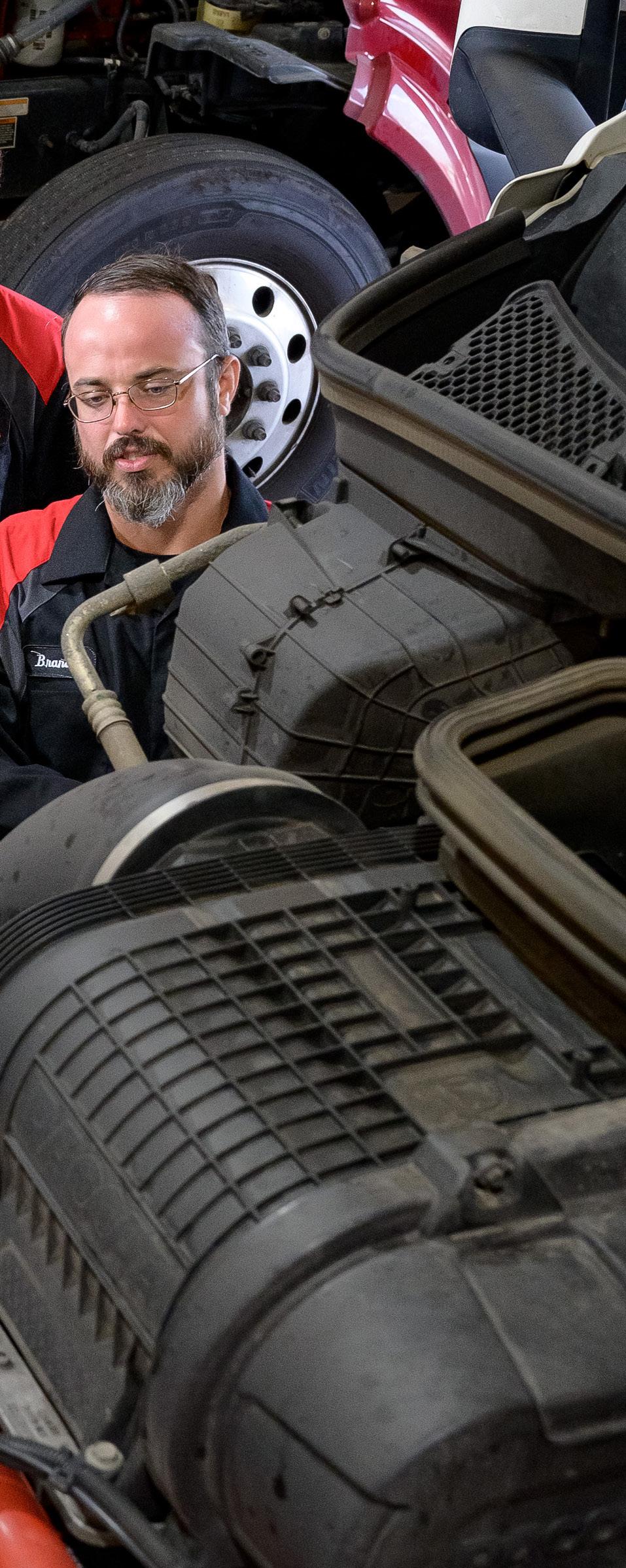
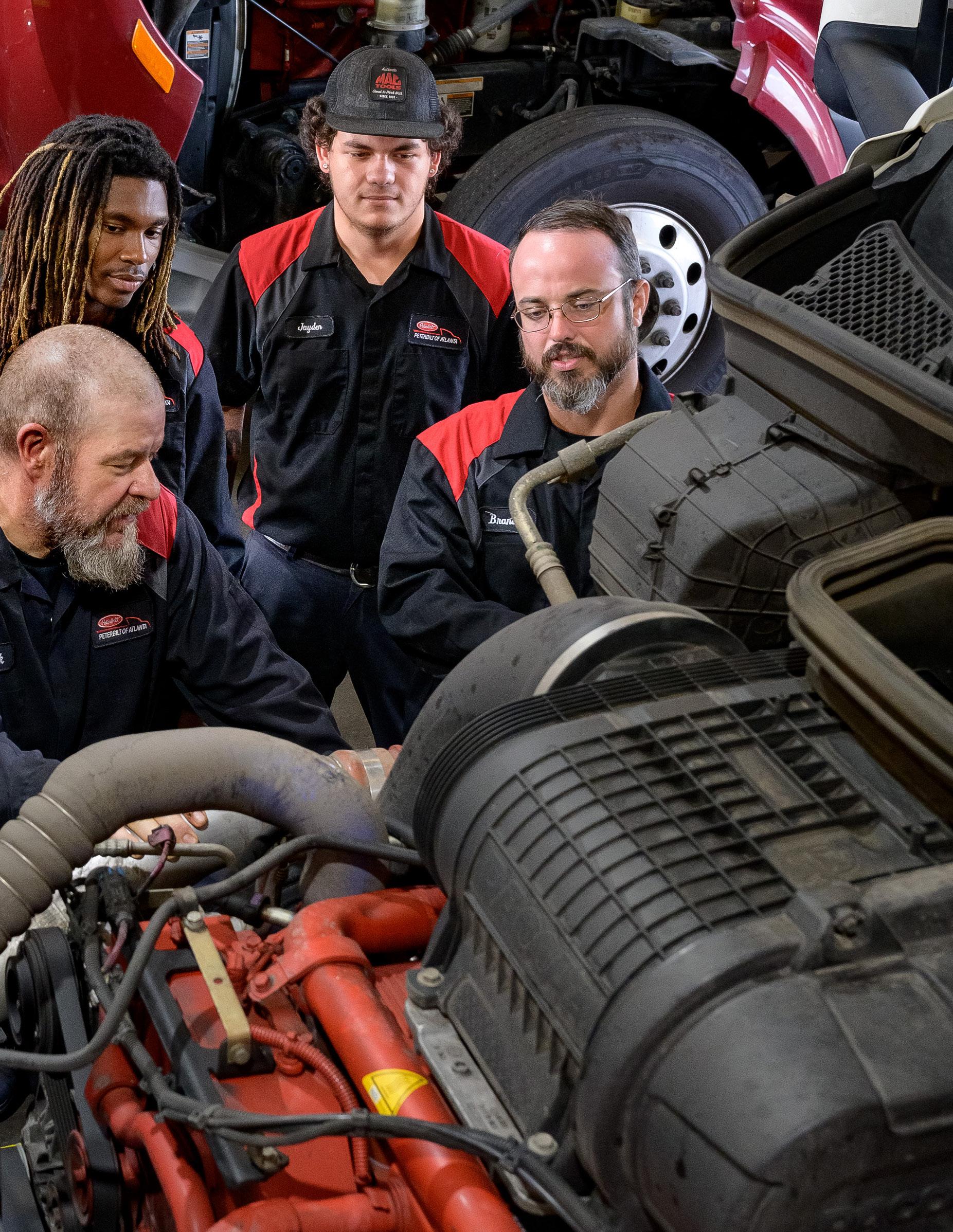
WorkSource Georgia administers this funding to support underemployed and unemployed individuals with skills training and other career services, typically by covering the cost of tuition, classroom materials, and supplies. The funding also supports Georgia businesses with upskilling new and existing workforce, covering a portion of apprentice wages for on-the-job learning, and employer training costs associated with upskilling existing employees.
The thought of taking on even one apprentice can seem daunting to some companies. After all, you need an existing employee to mentor them while they are on the job, which often requires more hours and increased pay. Then there’s the paperwork required – apprenticeships are registered with the U.S. Department of Labor and require 2,000 hours of on-the-job training and 144 hours of study before the person completes the apprenticeship. And it requires a commitment – an apprenticeship can take anywhere from one to five years to complete, although the average time is two years.
Partnering with a TCSG college, however, makes the whole process easier.
“We take care of the paperwork piece of it. We make sure that all the documentation is in place and in order,” Addison says. “We just make the process easier for the employer for that apprentice to get that journey worker certification.”
For custom plastic injection molding company Murray Plastics, participating in several apprenticeship programs has brought in new clients and cost savings. Most recently,


an existing employee, Cristy Norris, was interested in taking on a new role with the Gainesville-based company right when Lanier Tech was offering a two-year apprenticeship program in Quality Control. Norris completed the apprenticeship this past February.

“It was a great program,” says Danielle Perkins, COO. “The quality control itself has increased the number of jobs that we’re able to quote and new jobs that we’re able to bring in.”
Perkins notes that the apprenticeship more than paid for itself since it allowed the company to take on new types of clients it couldn’t take on before they had a quality control manager in place.
“During her quality control apprenticeship, we started getting calls and requests for quotes, and we were like ‘oh, we can say we can do this now,’” Perkins says, adding that the company gained a new client soon after the apprenticeship started. “It was really good because she got the hands-on experience, we had a customer willing to walk through all the big steps with us, and she was learning it in class as well. So, it really helped us step up to that next level.”
Addison with Lanier Tech agrees that businesses often find unexpected value when bringing on an apprentice.
“Not only are the students learning and on the job, but they’re also bringing value to the employer during that time,” he notes, “and coming up with new ways and ideas to save the employers money and to make them more productive.”
TCSG also ensures that those future employees obtain some of the soft work skills related to appearance, communication, teamwork, and respect.
“There’s so many other ancillaries of what goes into the job besides just the technical learning of how to repair or fix a truck,” PeterBilt’s Pearson says. “It’s how to work with the tools, how to work with your co-associates out there,
how to clock in and manage a time clock, how to manage the computer system and write up and report details in terms of a warranty repair. They learn all that from the ground up.”
“That’s the neat part about it,” he adds. “As they build their technical skills, they’re also building their knowledge base of how to work for a company.”
Setting up an apprenticeship program requires a financial commitment, but there, too, TCSG can help assist both businesses and students to obtain grants (see page 27) to defray the cost of setting up or participating in an apprenticeship program.
Ultimately, apprenticeships are yet another tool in the TCSG economic development kit. They’re a way for people to learn a trade and get a job, contribute to the economy, and help businesses grow and thrive.
“As companies look to expand in Georgia, one of the first things they look at is the available workforce,” Lanier Tech’s McDonald says. “That’s why it’s so important that we increase the number of young skilled technicians we have, because that’s what’s going to attract companies to continue to grow or locate in Georgia.”
It was a great program...The quality control itself has increased the number of jobs that we’re able to quote and new jobs that we’re able to bring in.”
- Danielle Perkins, Murray Plastics, COODanielle Perkins, COO of Murray Plastics
Tell us about Kids World in Statesboro.

Kids World Learning Center in Statesboro is a 3 out of 3-Star Quality Rated program in the state of Georgia. Our program is also NAEYC Nationally Accredited. We are a Language and Literacy Endorsed program from Gov. Kemp and a Pre-K Mentor site for the state. We have four buildings, provide childcare for 197 families, and employ 40 team members.
Why did you decide to attend a technical college?
I enrolled in technical college at a time when teachers in the childcare industry were required to have at least a Technical Certificate of Credit (TCC) in Early Childhood Care and Education. I wanted to know exactly what my teachers were required to know. I wanted to assist them in their studies, know what they were learning, and how it was applicable to their job assignments. Once I started the program, I continued learning in the field until I received my associate degree.
Why were you interested in the Early Childhood program at Southeastern Tech?
I already owned a childcare program and wanted to have the degree that supported my passion.
How did your program prepare you for your career?
I owned my childcare program prior to enrolling into technical college. The Southeastern Tech program validated the systems we had in place and allowed me to learn new strategies to improve my business. I could also walk the path that my teachers needed to complete; therefore, setting an example for them to gain as much knowledge as possible about our industry.
How did your college prepare you to become a business owner?
I am familiar with the saying “You don’t know what you don’t know.” College allowed me to learn the things I didn’t know and grow my business from 69 families and one building to 197 families and four buildings.
What do you wish more people knew about technical education?
I wish more people knew about all the benefits of technical education. Overall, technical education offers individuals a pathway to gain valuable skills, secure employment, enjoy higher learning opportunities, and find personal fulfillment. It provides practical and focused approaches to education, aligning individuals with the demands of the job market and equipping them to contribute to our society effectively.
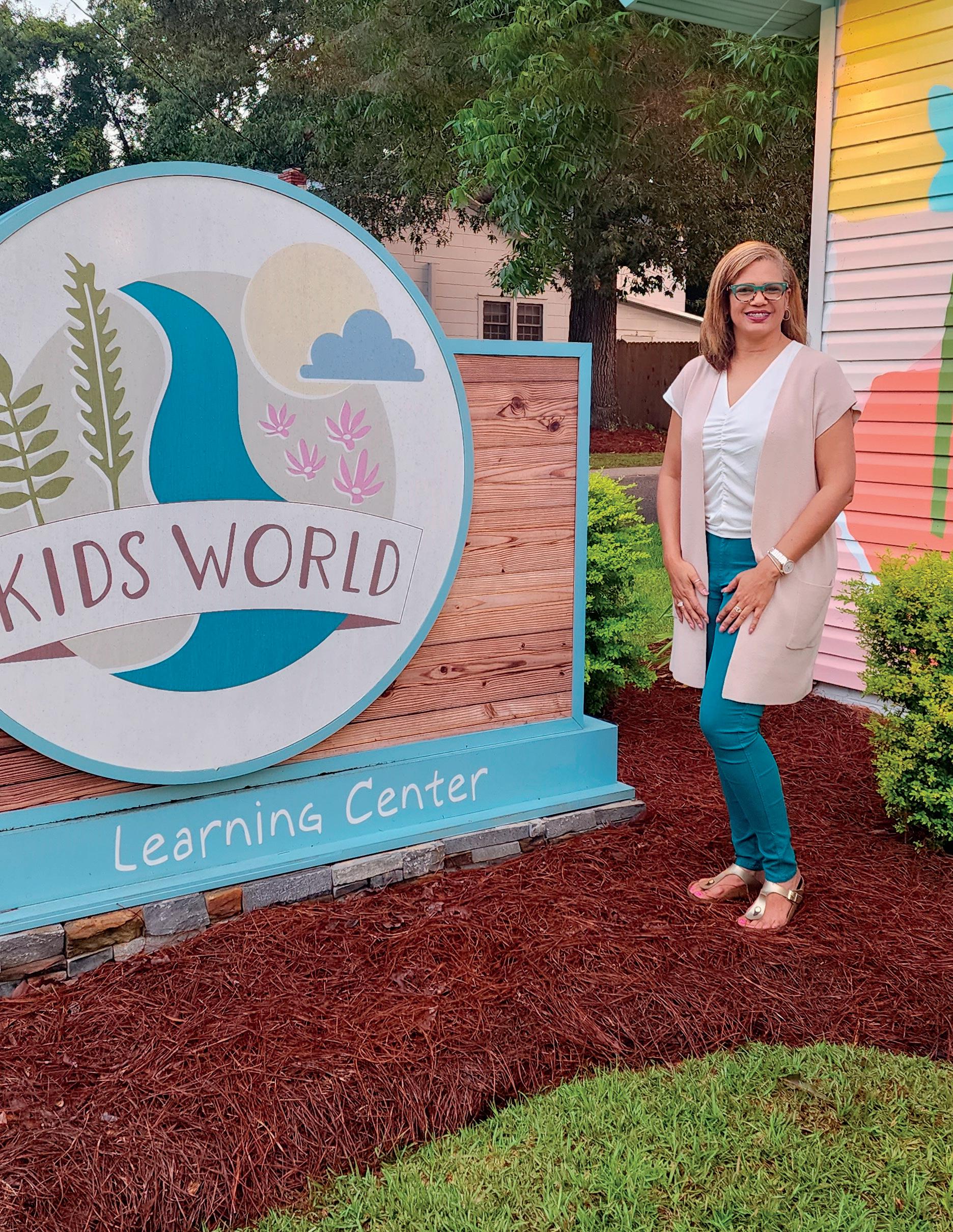
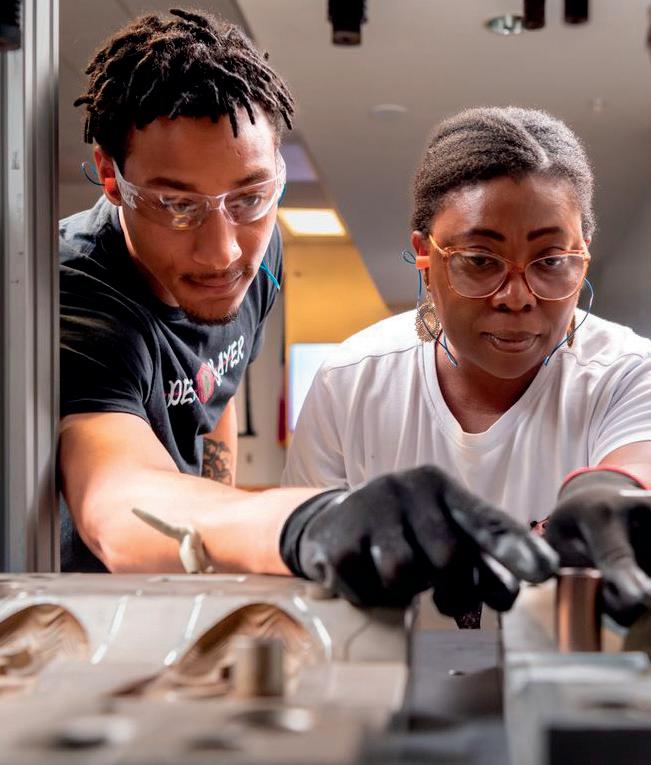
When Georgia Quick Start needs to do specialized training, its team often has to invent and build tailored trainers to meet the goal. Quick Start recently built custom trainers for three diverse manufacturers, including a shoe company, a specialty fiber company, and an electric vehicle battery company.
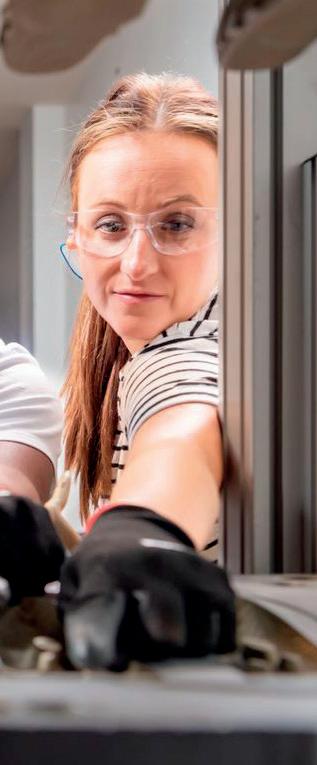
The unique hands-on trainers have mimicked the training new hires need to understand and learn their new jobs. One trainer taught new employees to thread polymer filament through rollers for Dixie Specialty Fibers in Trion, another taught new hires how to correctly handle special film and build battery cells at SK battery America in Commerce.
A third custom trainer showed trainees how to clean shoe molds and remove debris from newly formed shoes. Quick Start works with company engineers and produc-
tion supervisors to make sure the custom trainers work in a way that will benefit the company and the trainees.
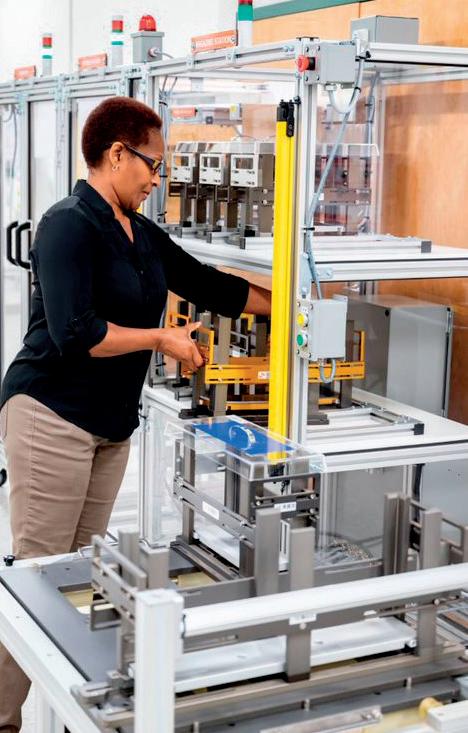
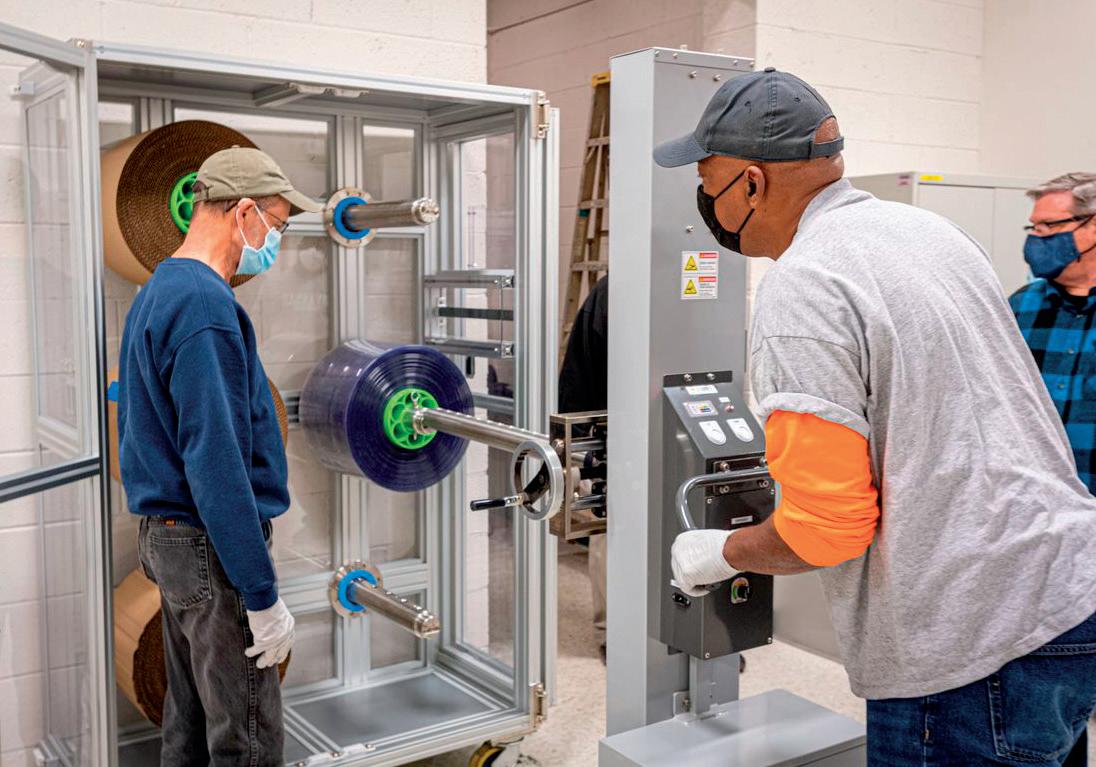
Quick Start not only creates custom trainers, its creative services and media teams also create videos that help illustrate training. At Hyundai Transys Georgia Powertrain in West Point, trainees can see a short video demonstrating the next steps in transmission assembly. Likewise, Kia Georgia, also in West Point, trainees can refer to training videos for vehicle assembly tasks.
Quick Start also has created videos for companies like Okabashi Brands in Buford and Starbucks to assist with recruitment.
“In today’s labor market, it is important to effectively communicate a strong company culture and value system to potential team members,” says Okabashi Brands CEO Sara Irvani. “Collaborating with Quick Start, we put together a video for our website on what it is like to work at Okabashi.”
At Starbucks’ roasting plant in Augusta, Quick Start’s video, which includes live action and animation, is used “for both external visitors and other partners visiting from corporate” a company spokeswoman says. “Just about everyone sees it.”
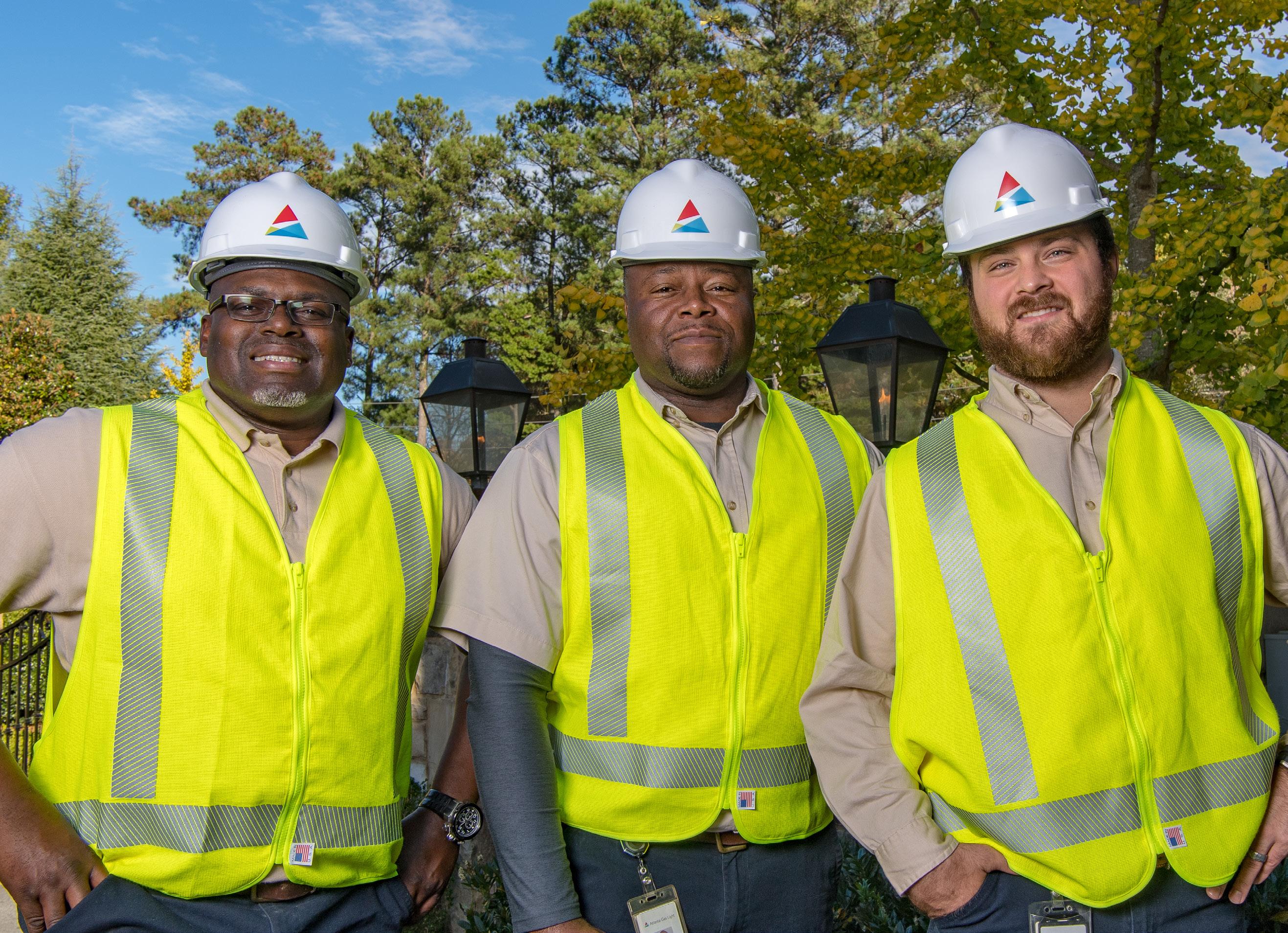

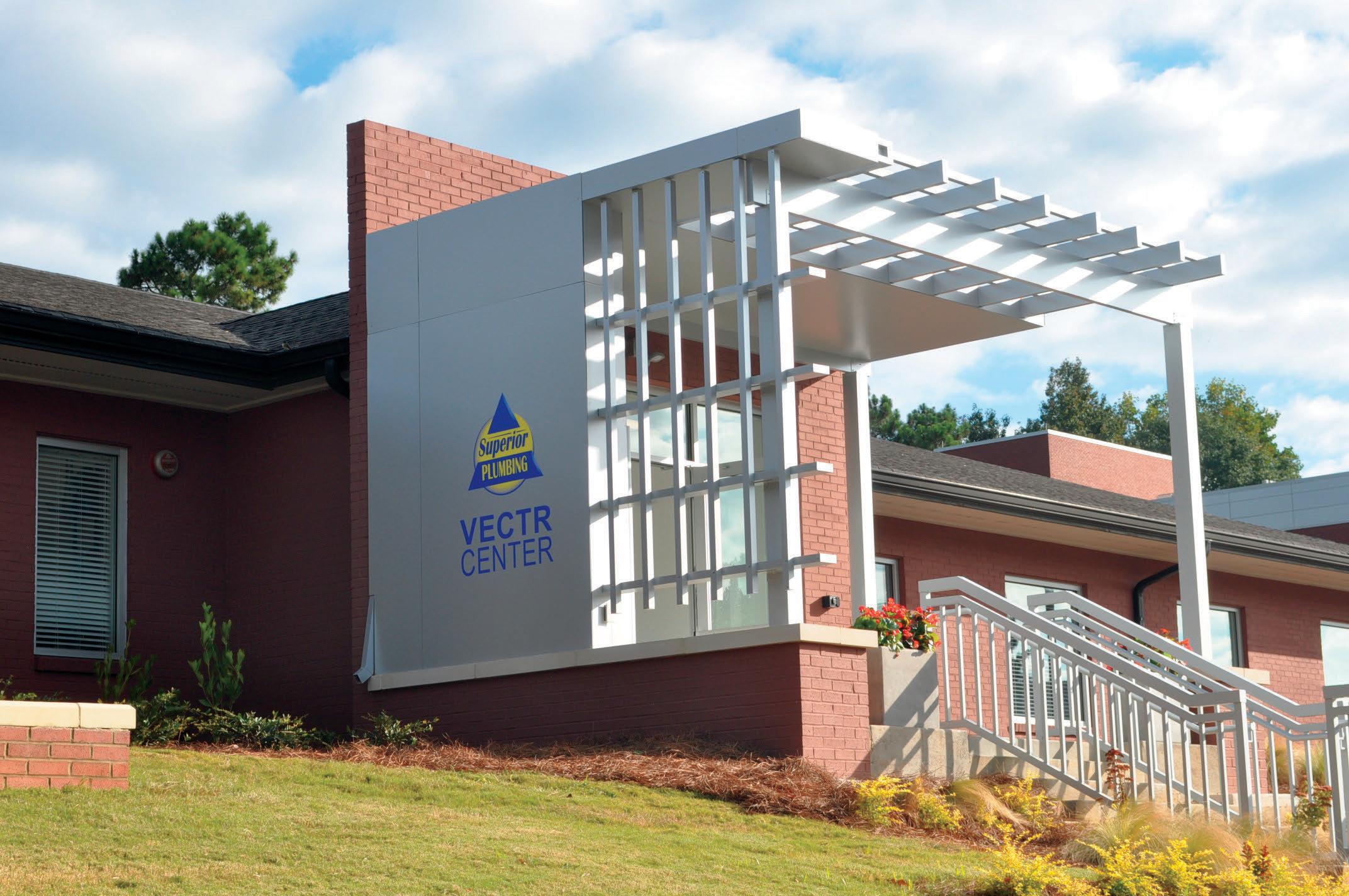


n an innovative effort to enrich student potential, Albany Technical College (ATC) has launched a new initiative to increase dual enrollment opportunities for high school students. This dual enrollment program is a unique opportunity for high school students to amplify their education and career training by simultaneously earning college and high school credits.
As part of this new endeavor, Albany Technical College is also launching a program named Essential 18. This initiative encourages high school districts within the college’s service area to enroll all eligible high school students for at least 18 transferable college credit hours during their 11th and 12th grade years. Along with 18 transferable college credits hours, students will earn an Early College Essentials technical certificate of credit from ATC. The program is open to all eligible high school students with at least a 2.0 grade point average, regardless of their academic or Designed for students in the 10th through 12th grades attending participating Georgia high schools or approved home study programs, the dual enrollment program offers a broad spectrum of courses. These range from academic core courses that can be transferred to TCSG colleges or universities within the University System of Georgia to occupational and career courses that serve as a springboard to jumpstart a career.
“Our goal is to maximize the potential of our students, providing them with opportunities that will help bridge the gap between high school education and college readiness,” said Kenneth Williams, director of enrollment at Albany Technical College. “We’re thrilled to offer this unique dual-enrollment initiative that we believe will greatly contribute to their growth and advancement.”
“We understand the importance of maximizing student potential and are thrilled to offer such an opportunity that will enhance the growth of high school students and create a work-ready pipeline of workers for potential employers,” said
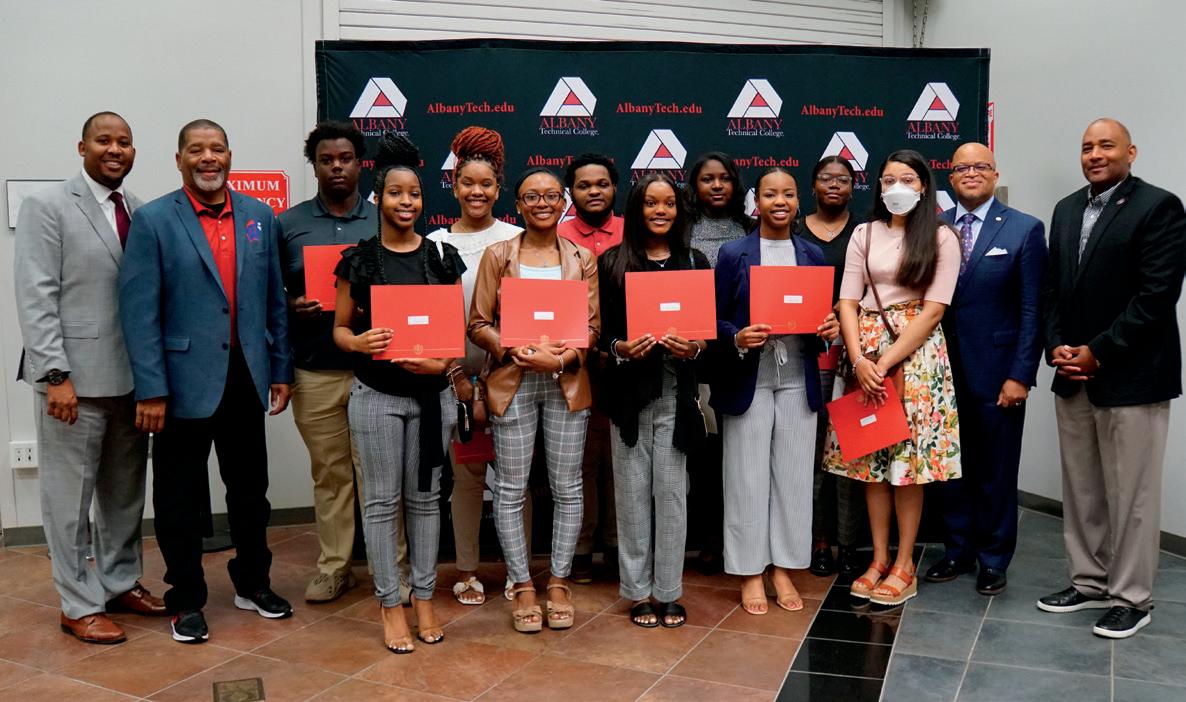
Dr. Emmett Griswold, president at Albany Technical College. “This initiative reinforces our commitment to bridging the gap between high school education, college readiness, and workforce development.”
One of the key attractions of the program is full tuition coverage, along with most fees and textbook costs. This comprehensive financial support greatly eases the economic burden on students and their families, making higher education more accessible and affordable.

“The Essential 18 program is a testament to our dedication to providing a well-rounded, practical education,” said Barbara Brown, vice president of student affairs/enrollment management at Albany Technical College. “We believe that by promoting this initiative, we can help more students reap the benefits of dual enrollment and create a seamless transition from high school to higher education or career.”
With this new initiative, Albany Technical College has set the stage to empower more students by


providing opportunities to accelerate their academic progress and cultivating a robust talent pool for current and future workforce needs. The college continues to seek innovative approaches that will enrich the educational landscape for students and shape an abundant and bright future for all students. Albany Technical College’s dual enrollment program is available throughout the year across fall, spring, and summer academic semesters.
Albany Technical College released a spring 2023 special edition of ACCESS Magazine , highlighting the successes of 124 spring 2023 high school graduates who successfully earned a degree, diploma, or technical certificate and the positive impact that dual enrollment had on former graduates.
Athens Technical College’s (ATC) satellite campuses have recently expanded academic programs, adding agricultural science and conservation law enforcement associate degree programs at the Elbert County Campus and associate of science in nursing at the Walton County Campus in Monroe.
The Tom McCall Agriscience Complex, named in honor of the former state representative from Elberton, includes two new buildings, which totaled over $8.5 million funded by the state legislature. They include labs for horticulture, poultry science, animal science, agricultural mechanics, and wildlife conservation spanning over 27,000 square feet. A separate greenhouse complex was built for horticulture instruction.

The facility includes multiple office spaces, a conference room, and outdoor patio overlooking the pond for students to gather and study. The arena, which held its first dairy show in January, will serve as a community space for many young people including 4-H and Future Farmers of America (FFA) participants.
The arena also held a dedication ceremony and ribbon
“Georgia needs well-trained people to enter agriculture –people who understand both the science and business sides of agriculture and have the hands-on skills necessary to hit the ground running. These new buildings will help us to meet those needs.”
-Chris Morgan, Program Chair, Agricultural ScienceTom McCall cuts the ribbon with the help of his grandsons on the new agricultural complex named in his honor
cutting on March 31 in honor of McCall, with speakers including former Gov. Nathan Deal, Agriculture Commissioner Tyler Harper, Technical College System of Georgia (TCSG) Commissioner Greg Dozier, Rep. Rob Leverett, and Rep. Houston Gaines.
“Tom has always taken our needs under consideration and assisted us in meeting workforce needs,” says ATC President Andrea Daniel. “He understands our important role of educating the workforce in an applied way. I believe that is because he is wise, a farmer, and a passionate supporter of technical education.
Graduates from the associate degree program are prepared to enter management positions or start their own companies. Some have been employed by companies and agencies such as Centurion Poultry, Pilgrims, the United States Department of Agriculture, James Greenhouses, and many more. Other graduates have started their own businesses to meet local food needs.
“Georgia needs welltrained people to enter agriculture – people who understand both the science and business sides of agriculture and have the hands-on skills necessary to hit the ground running. These new buildings will help us to meet those needs,” says Program Chair Chris Morgan, who started the program nearly a decade ago at the Athens campus. “I’m excited about the future of Georgia, the opportunities for Georgia agriculturalists to meet the needs of a growing population, and the multitude of career prospects our students will have.”
Alongside the agriculture program, a new associate degree program was created last year that combines criminal justice and wildlife courses to train budding technicians and public safety officers.
“The facilities allowed us to create a new program in conservation law enforcement, which was specifically requested by the Georgia Department of Natural Resources,” says Daniel. “This unique program prepares graduates to meet the demand for DNR officer positions throughout the north region.”
Alexia Goodman is the conservation law enforcement chair and instructor. The program will have its first grad -
uate this fall. The interest for the program has been strong with over 20 students enrolled in the second year.
Meanwhile, about 60 miles away, the first cohort of nursing students at the Athens Technical College’s Walton Campus began classes in August 2022, and a ribbon cutting for the new facility was held in December.
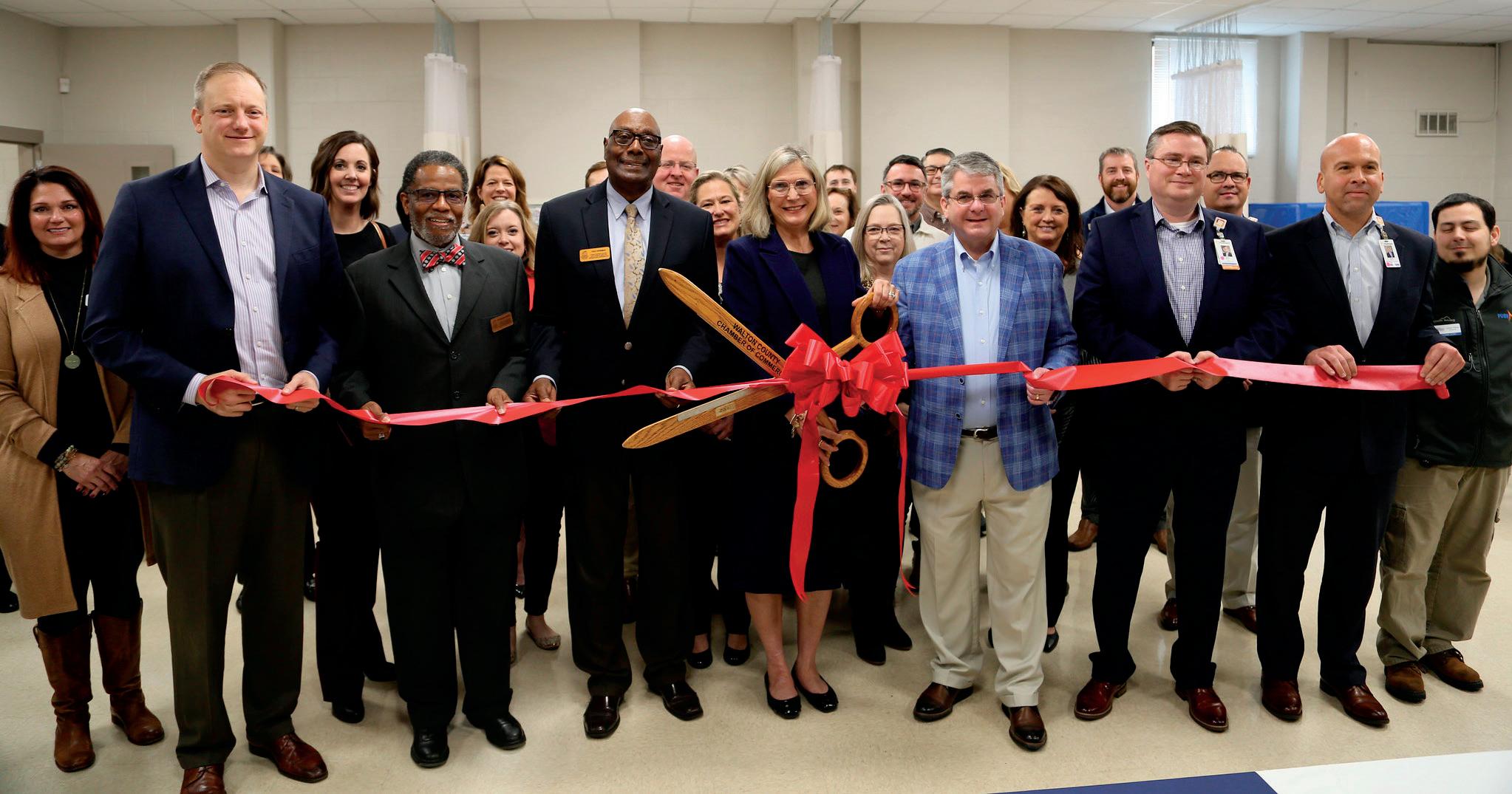
Renovation of existing space included new classroom and simulation labs with the latest technology to
help with interactive teaching to mirror what is currently on the main campus. Funding for the program came in part from a partnership with Piedmont Healthcare, which hopes to hire qualified graduates from the program in the region.
Instructor and clinical coordinator for the Walton nursing program, Beth Heath, graduated from Athens Tech’s nursing program in 1999. She has a background in hospital nursing and community health, and previously taught at the Athens campus.
“We comment on the number of students that drive from a distance, especially out in this direction,” she says. “It’s great that students won’t have to drive so far, and we’ll bring a great program to more students. With the nursing shortage, any time we can provide qualified applicants the opportunity to enroll in a really great program, that’s a plus. I think geographically it’s a boon for students – we know there are students in this area that want to come to this program and there are more students than we can take at the Athens campus.”
“With the nursing shortage, any time we can provide qualified applicants the opportunity to enroll in a really great program, that’s a plus.”
- Beth Heath, nursing instructor and clinical coordinatorAthens Tech President Dr. Andrea Daniel cuts the ribbon on the new nursing facility at the college’s Walton campus
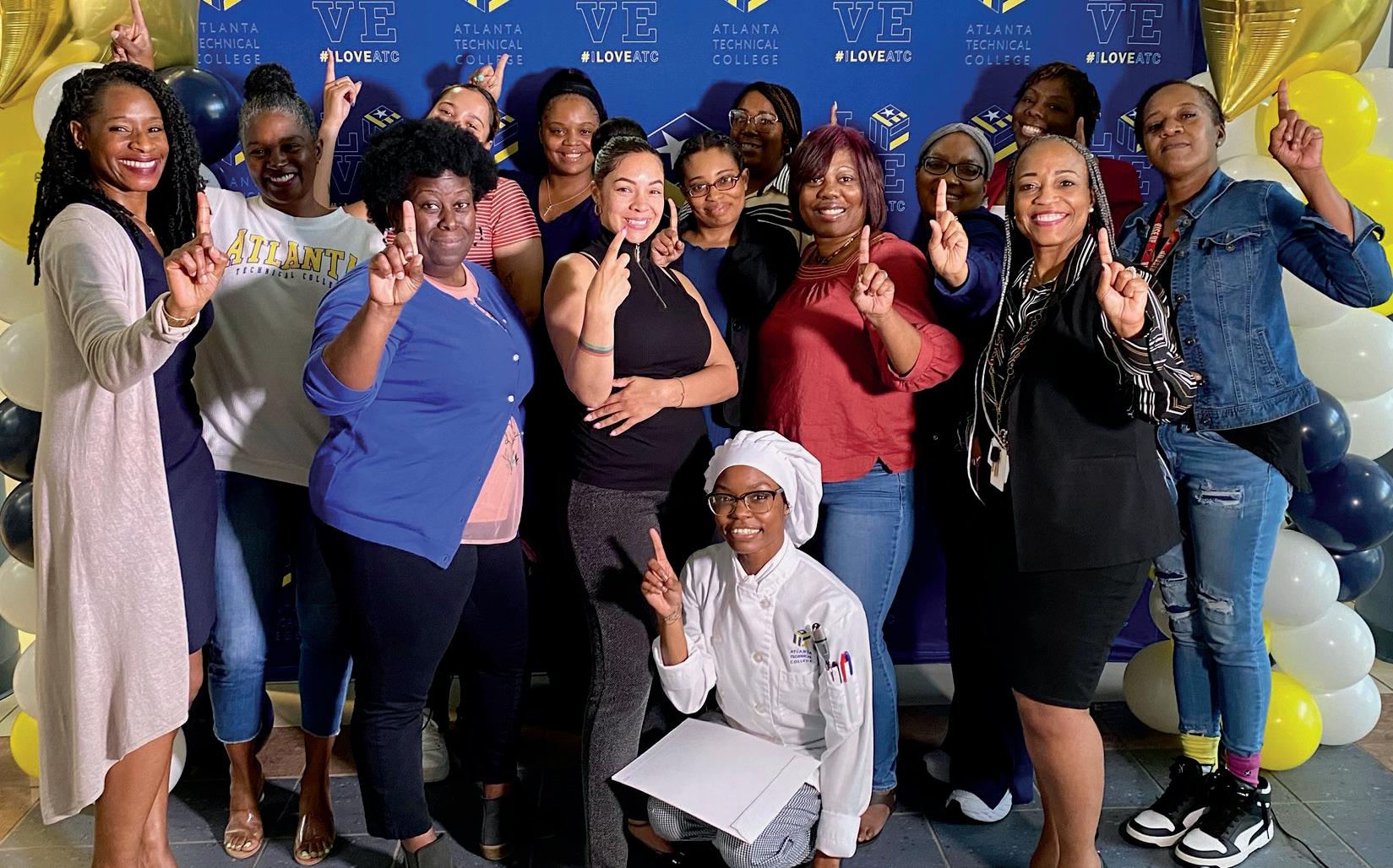
Atlanta Technical College (ATC) has more than 55 years of serving the city of Atlanta, Fulton County, and Clayton County, and provides an exceptional education to a diverse group of students, representing ethnic groups from around the world, younger and older people, high school and college graduates, persons with special needs, and persons with varied backgrounds, academic requirements, and interests. The college has a 99% job placement rate and a documented $201 million economic impact on the region.
Conveniently located between downtown Atlanta and the Hartsfield-Jackson Atlanta International Airport, ATC serves as the hub of opportunity for the metro Atlanta region and especially for communities south of I-20. In reviewing the opportunity divide, it was the obvious choice
“Going to the workshops CWI provided to me, it gave me a lot of insight into workplace integrity and … on being able to carry myself in a better way, especially when it comes to working on a job site. My life has changed drastically.”
- Isaiah Prayor, electrical systems graduate
for the city of Atlanta and the Atlanta Committee for Progress (ACP) to partner with ATC to create a workforce solution to bring together unemployed/ underemployed citizens and open career positions that were plaguing industries. The final convincing factor was the college leadership.
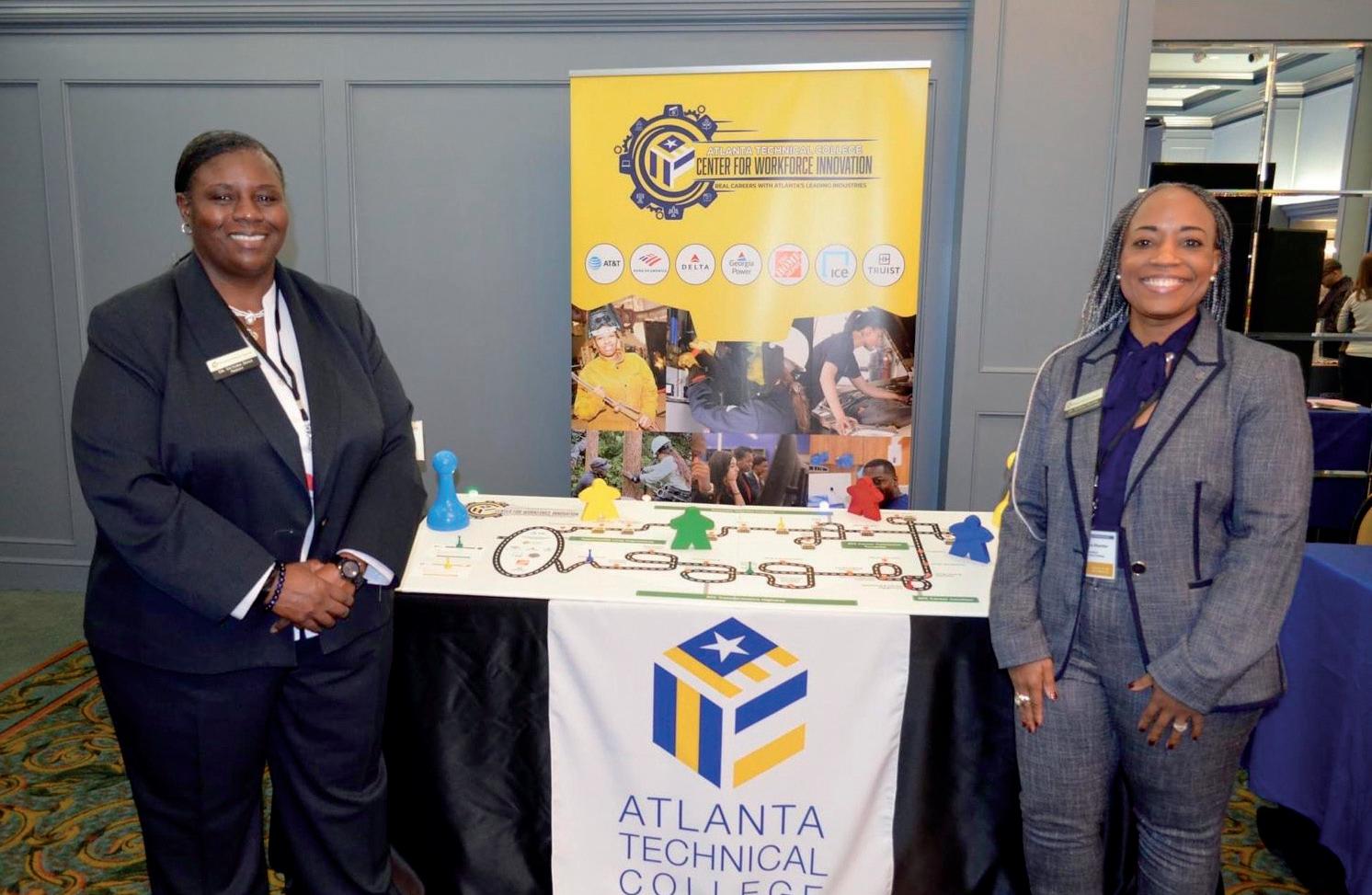
In December 2016, Dr. Victoria Seals assumed the helm as president of ATC. Dr. Seals’ effective leadership and documented experience as a change agent provided the confidence that the Atlanta mayor’s office and the ACP needed to partner with ATC to make the necessary investment to develop and implement the Center for Workforce Innovation (CWI).
“We chose to work with Atlanta Technical College because of the leadership of Dr. Seals,” says Shan Cooper, executive director, ACP. “Atlanta Technical College cares for its students, not just while they’re on campus, but also after they have moved beyond the institution. Our goal is to develop a program where students graduate from Atlanta Technical College having had one of the best learning experiences possible.”
The CWI was designed to provide intensive support, aimed at preparing students to thrive in sustainable careers in growing industries. The intentional model of the CWI, centered on three pillars of recruitment, engagement, and placement, focuses on-campus assessments and individualized coaching; work-based internships, apprenticeships, and career placement; program support by leading industries; and short-term training programs in high-demand career areas.
The initial pilot of the CWI targeted programs in the skilled trades (carpentry, electrical, plumbing, HVAC, welding), IT/coding (IT support, networking, cloud technologies, cybersecurity), and aviation, with film and entertainment, logistics, and supply chain management being added in year two. Also in year two, ATC mapped the plan to scale the CWI model to the entire college and implemented its #ATCLeadStrong Mentorship Program, with mentors from major industry partners like Delta Air Lines, Georgia Power, Siemens, Southern Company, and Cox Business.
ATC supports more than 3,000 jobs and provides students with a 7.5% return on their investment. In fiscal year 2020, despite navigating a pandemic, enrollment (5,800), retention (67.3%), and graduation (70.8%) reached the highest they had ever been in the history of the college. These metrics demonstrate the regional impact of the college, as well as the effectiveness of the CWI model.
The students say it best: “… It should build confidence in students that come to this school, to know that not only will I get my education – I won’t be left to figure it out [on my own]. I will be surrounded by people who are invested in trying to get me work,” says Yasmine Neal, avionics graduate.
“Going to the workshops CWI provided to me, it gave me a lot of insight into workplace integrity and … on being able to carry myself in a better way, especially when it comes to working on a job site. My life has changed drastically,” says Isaiah Prayor, electrical systems graduate.
In recognition of the scaling of the CWI and student success, the college was awarded the prestigious 2023 Bellwether Award for Workforce Development and Best in Showcase. In February 2023, The Bellwether College Consortium hosted its 29th Annual Community College Futures Assembly (CCFA) in San Antonio, Texas. ACT’s presentation centered around how the CWI addressed a recent regional study that revealed individuals born into poverty in certain zip codes only had a 4% chance of elevating their economic position through their entire lifetime.
Dr. Seals, Vice President of Student Engagement Dr. Katrina Hunter, and Executive Vice President of Academic and Student Affairs Caroline Angelo represented the college, which competed as one of 30 national finalists. It was the first time that a single institution was presented with three awards in the CCFA 29-year history.
“Atlanta Technical College cares for its students, not just while they’re on campus, but also after they have moved beyond the institution. Our goal is to develop a program where students graduate from Atlanta Technical College having had one of the best learning experiences possible.”
- Shan Cooper, Executive Director, Atlanta Committee for Progress
In January, Augusta University President Brooks A. Keel and Augusta Technical College President Jermaine Whirl officially launched the new Augusta Advantage initiative with a ceremonial agreement signing and logo unveiling in the Jaguar Student Activities Center Roscoe Williams Ballroom on the Augusta University campus.
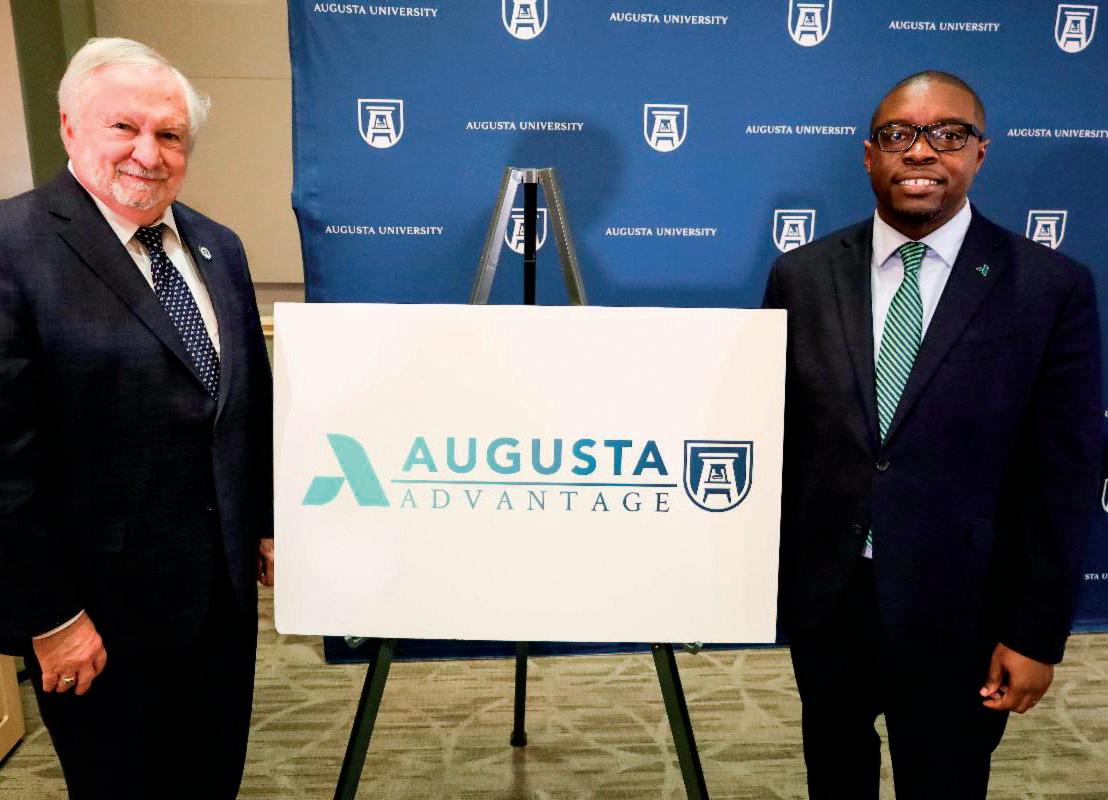
Students in this program will have the opportunity to earn their associates degree at Augusta Technical College, then receive accelerated admissions to transfer all those credits into eight possible pathways at Augusta University to earn their bachelor’s degree. Students who are part of Augusta Advantage can easily transfer core curriculum credits up to the first 60 hours in the areas of business administration, communication, computer science, dental hygiene, kinesiology, nursing, political science, psychology, respiratory therapy, and social work, all of which are important to Georgia’s current and future workforce needs.
The Augusta Advantage program is open to all students seeking both an associates and a bachelor’s degree, which includes dual enrolled high school students. Eligible students will also be able to use Georgia HOPE scholarship awards at both institutions.
With this collaboration students gain:
• Guaranteed admissions to Augusta University for Augusta Technical College graduates (select programs at Augusta University have additional admissions requirements and/or admit only a select number of students each year)
• Joint admissions coordination for Augusta Advantage students
• Augusta Advantage brings together two leading public education partners to build a stronger Augusta community. This collaboration ensures student success at all stages of the college experience, from application to transfer to graduation.
The benefits include:
• Clear course pathways to stay on track for a degree
• Dedicated transfer guidance from an Augusta University counselor on site at Augusta Technical College
• Eligible students may utilize Georgia HOPE scholarship awards at both institutions
To ensure student success at all stages of the college experience, from application to transfer and ultimately to graduation, and to provide as many resources as possible to give students an easy transition through the program, April Byrd will serve as the Augusta Advantage transfer admissions counselor.
Augusta Technical College has been proud to partner with Augusta University since 2015 for a Cybersecurity to Information Technology Pathway that has proven to be a successful and valuable program for students seeking degrees in this field. The new Augusta Advantage pathway program will truly be Augusta’s competitive advantage in ensuring the region has the workforce it needs today and for years to come.
For healthcare students and faculty in Central Georgia Technical College’s (CGTC) first service-learning, technical-focused study abroad program to St. Vincent and the Grenadines in January, every experience connected with the industry at home and built toward their career.
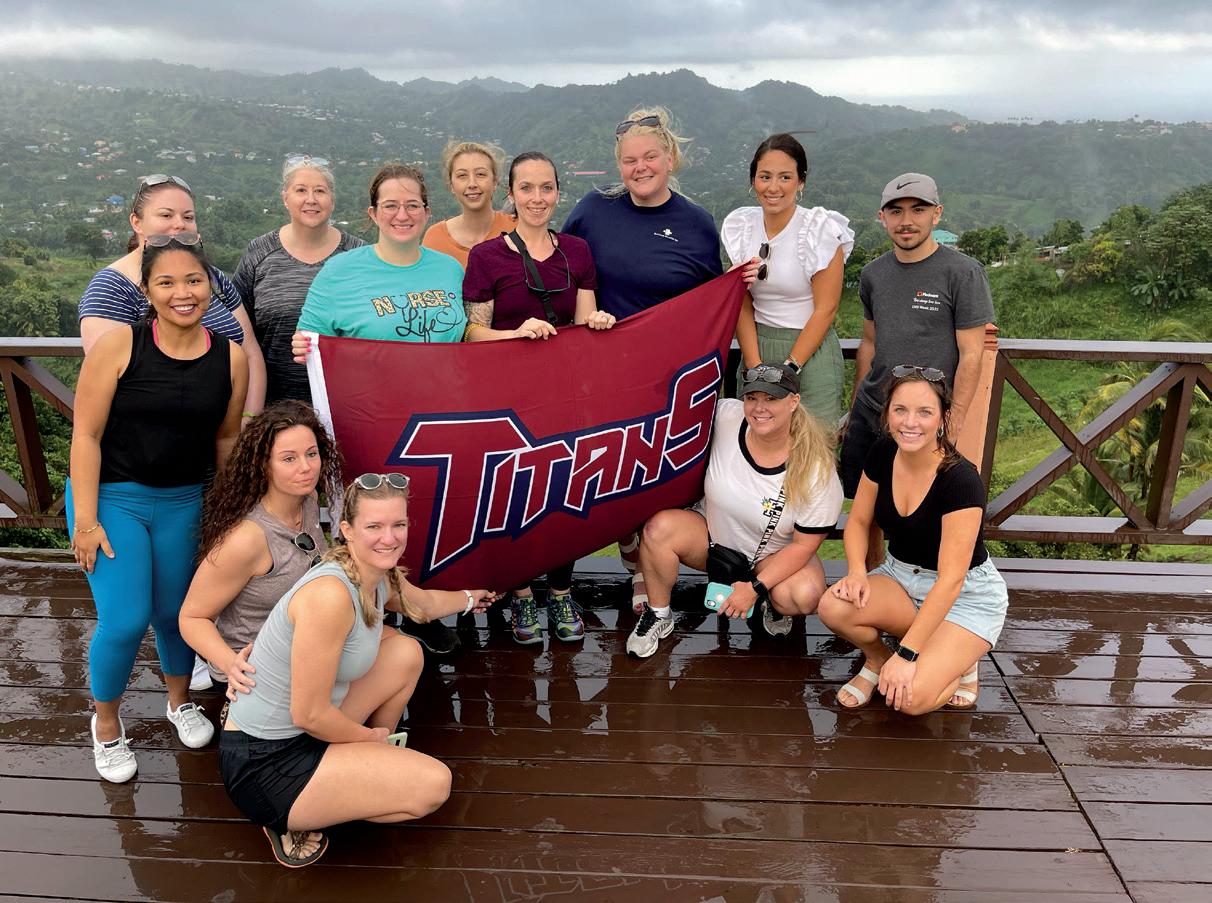
“We saw many things we haven’t experienced before in healthcare and culture,” says Hilary Bretz, a nursing student who, as the spouse of an active-duty military member, received the college’s first Gilman-McCain Scholarship from the U.S. State Department for study abroad. “Studying abroad is a great opportunity to see things you have never seen. I feel like I would have never gotten the opportunity to visit St. Vincent if it weren’t for CGTC, and it has been really cool.”
The 2023 Health Sciences Study Abroad in St. Vincent and the Grenadines is a first-of-its kind program for the CGTC Office of Global Initiatives. Development of this innovative program began in 2022 through a collaboration between the CGTC Division of Health Sciences and Trinity School of Medicine, on the island.
Health sciences curriculum regularly requires students to engage in volunteer healthcare as a response to community challenges. It was a logical fit to create outlets for this service addressing areas of need in St. Vincent and the Grenadines. Dental hygiene, paramedicine, and registered nursing students attended the service-learning trip.
The coursework emphasized learning opportunities and outcomes that provide a global competency framework for students to gain international cultural perspectives alongside professionals on the island and strengthen a partnership with Trinity that mutually benefits interprofessional development between healthcare disciplines that improve patient outcomes.
The college’s health sciences faculty works to equip a skillful, well-rounded, and empathetic healthcare professional, to carry with them a strong worth ethic and passion
for patient care. Developing outlets, domestic or abroad, for students to work on their skills and become excellent healthcare providers speaks directly to the mission of the college to produce an educated workforce for Georgia.
“You know it’s one thing to have a study abroad program in a place as beautiful as St. Vincent and the Grenadines; the country and culture alone offer so much to study and learn from,” says CGTC Director of Nursing Jessica Willcox. “But I think more than anything, giving our students an experience where they can volunteer their skills, learn alongside the islands professionals, and open their minds and hearts is innovative and life changing.”
For her work on this project, Willcox earned international recognition and cemented CGTC’s work in healthcare into a larger global education conversation.
In February, the Community Colleges for International Development (CCID) awarded Willcox the 2023 Faculty Innovation in Global Education Award.
CGTC and its Office of Global Initiatives look forward to a continued partnership with organizations domestic and abroad to benefit global healthcare sustainability, education, and workforce for each community.
“...giving our students an experience where they can volunteer their skills, learn alongside the island professionals, and open their minds and hearts is innovative and life changing.”
- Jessica Willcox, director of nursing, CGTCCentral Georgia Tech nursing students in St. Vincent and the Grenadines
This year marks the 60th anniversary of Chattahoochee Technical College opening its first campus. The college began with one building in 1963 for 120 students at the college’s current 980 South Cobb Drive location in Marietta.

Originally known as Marietta-Cobb Area Vocational Technical School, the school was established through the joint efforts of the Marietta City Board of Education and the State Board of Vocational Education. Marietta furnished the land, half the cost of the building, and the equipment needed for the new building. The state board was responsible for paying teacher salaries and the remaining half of the building cost. Excavation began in 1961 for this new facility, which was completed at a cost of $636,000. When the building opened on Sept. 3, 1963, the programs of study included electronics, electricity, machine drafting and design, practical nursing, radio and television repair, machine shop, cosmetology, and business education.
The evolution of Chattahoochee Tech over the past 60 years has been grounded in dynamic enrollment for programs of study designed to meet Georgia’s workforce
“Chattahoochee Tech has a strong history of preparing students with the workforce skills and experience they need to achieve successful careers.”
- Chattahoochee Tech President Dr. Ron Newcomb
needs. To help accommodate growing student enrollment in its early years, the college added classroom space at the Marietta campus. The college then established additional campus locations in South Cobb, Paulding County, and East Cobb. The college’s South Cobb campus opened in 1995, followed the next year by the opening of the Chattahoochee Tech Paulding campus. In 2000, the college opened its Mountain View campus in East Cobb. Between 1987 and 2000, the college was known as Chattahoochee Technical Institute until the Georgia legislature converted the names of all accredited technical institutes to technical colleges.
One of the most significant milestones in the 60-year history of Chattahoochee Tech involved the 2009 merger with two other colleges – Appalachian Technical College in Pickens County and North Metro Technical College in Bartow County. Appalachian Technical College had been established in 1967 as Pickens Area Vocational Technical School in Jasper. North Metro Technical College had been established in 1989 as North Metro Technical Institute. With the merger of the three colleges, representatives from the board of directors of these colleges adopted the name of Chattahoochee Technical College for the single.
A unit of the Technical College System of Georgia (TCSG), Chattahoochee Tech is now the largest technical college in the state. In addition to the Chattahoochee Tech campuses in Bartow, Cobb, Paulding, and Pickens counties, there are two campuses in Cherokee County. One in the heart of downtown Woodstock and the other in Canton.
The Canton campus opened in January 2011 at the Bluffs at Technology Park. This 62,500 square-foot facility is located on 25 acres within The Bluffs, a 700-acre mixedused development. The Woodstock campus sits on the site of the former Woodstock Elementary School. This property was leased from the Cherokee County Board of Education in 2004, then deeded in 2013 by the board of education to the state for use by Chattahoochee Tech. Built in the 1930s, the Chattahoochee Tech Woodstock campus underwent an extensive, $5.3 million renovation in 2013 and reopened for the fall semester in 2015.
An additional Chattahoochee Tech campus is currently under construction in Paulding County for the college’s Aviation Training Academy. Specific programs of study planned for this 55,000 square-foot facility include aviation maintenance technician-powerplant, and aircraft structural technology. Airframe and powerplant (A&P) mechanics repair, service, and maintain parts of an aircraft that include the engine, landing gear, brakes, and air-conditioning systems.
Recent college highlights include the opening of the 20,001-square-foot Center for Advanced Manufacturing at the college’s North Metro campus in 2022. Chattahoochee Tech also celebrated the opening of the Superior Plumbing Veterans Education Career Transition Resource (VECTR) Center at the Marietta campus in 2022. In 2020, Chattahoochee Tech celebrated the opening of its newly constructed, 71,716-square-foot Health Sciences building at
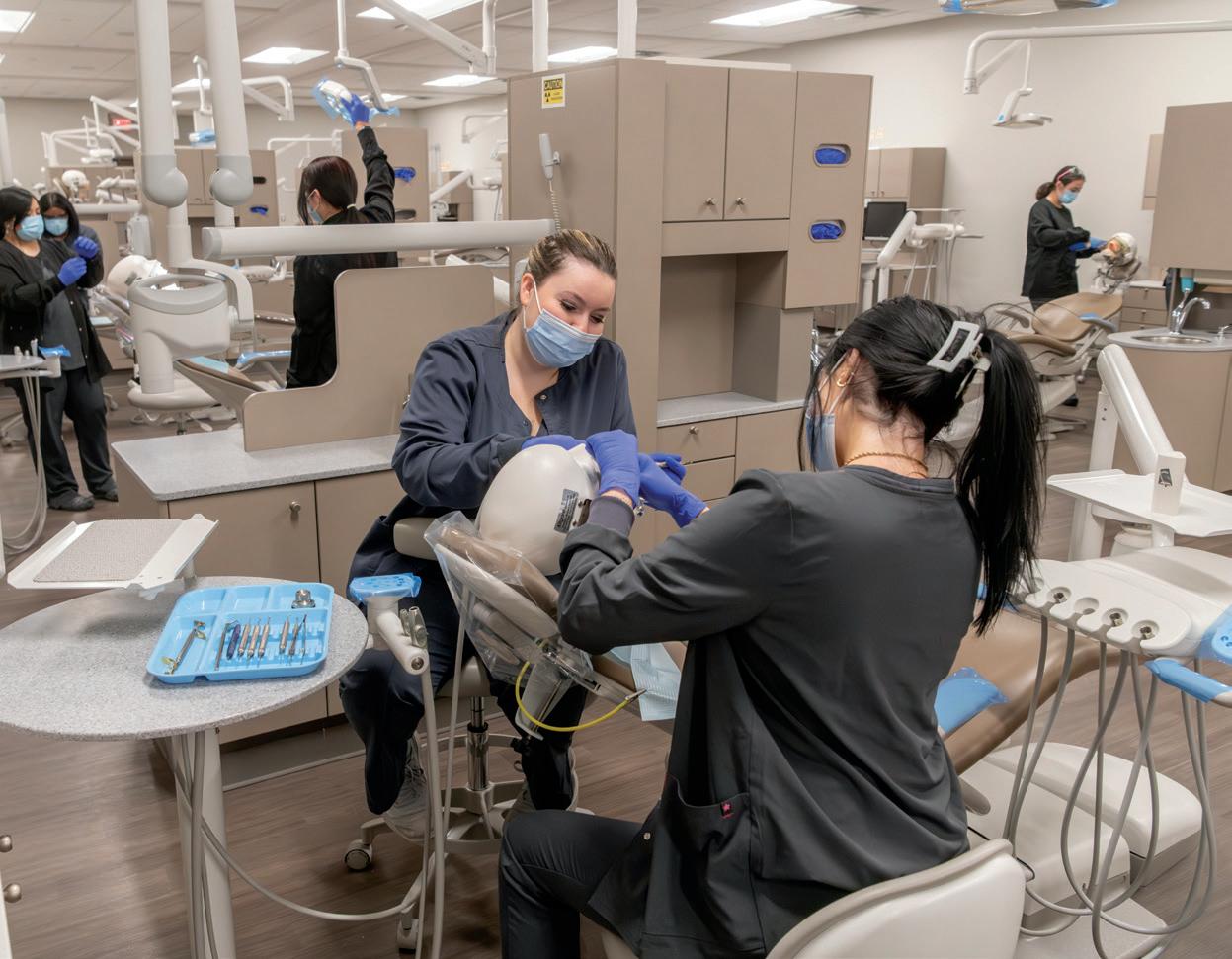
the Marietta campus.
For 60 years, Chattahoochee Tech has been helping students gain the skills and experience they need to become ready for the next step in their professional careers. The college awards associate degrees, diplomas, and certificates in programs of study linked to the state’s fastest growing, high-demand career fields.
“Chattahoochee Tech has a strong history of preparing students with the workforce skills and experience they need to achieve successful careers,” says Chattahoochee Tech President Dr. Ron Newcomb. “We are very proud of the fact that our graduates are meeting the demand from local employers for highly skilled employees to fill well-paying jobs available in our community.”
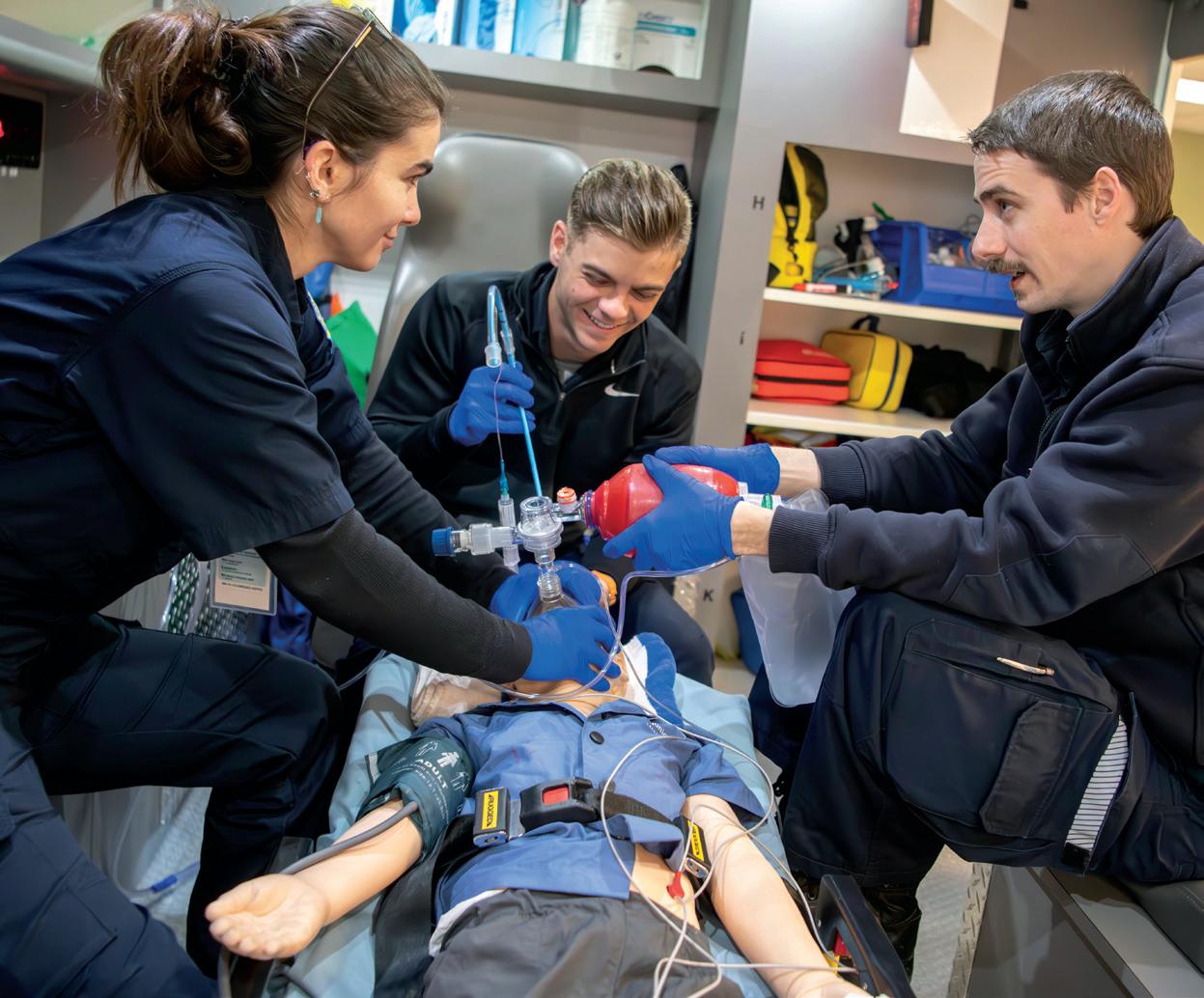
Creative Financial Group

was founded in 1988 and headquartered in Atlanta, GA. We provide financial planning services to high net-worth individuals and their families, and specialize in serving as a preferred provider to company executives. Creative Financial Group has been a division of Synovus Securities, Inc since 2001 As of July 2023, CFG hosts over $2 billion in client assets under management (AUM).

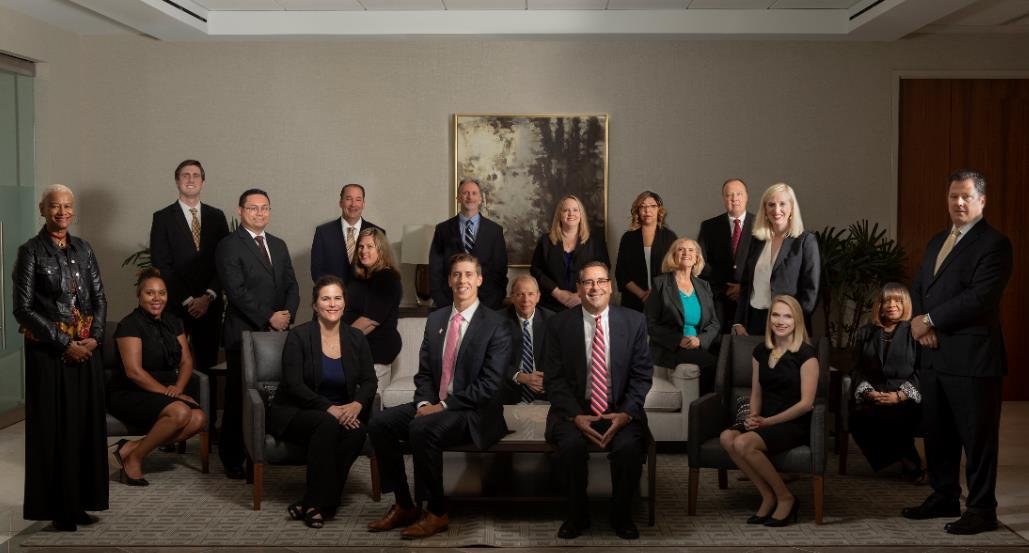

Contact Us Web | Cfgltd.com
Phone | ( 770) 913-9704
Available Services
Available Services
▪ Retirement Planning
As

individual, you are faced
and
As a high-net-worth individual, you are faced with complex short-term and long-term objectives in your life. These decisions are critical elements to your financial plan, so our planners become experts in your situation. Working through the intricacies of your plan alongside you, we aim to provide a sense of security surrounding your life; our insight can help take the extra load off your hands that allows you to focus fully on your work, your family, and your leisure. We take pride in supporting our clients and guiding them towards personal and financial well-being.
Retirement Planning
▪ Income Tax Planning
complex
objectives in your life. These decisions are critical elements to your financial plan, so our planners become experts in your situation. Working through the intricacies of your plan alongside you, we aim to provide a sense of security surrounding your life; our insight can help take the extra load off your hands that allows you to focus fully on your work, your family, and your leisure. We take pride in supporting our clients and guiding them towards personal and financial well-being.
Income Tax Planning
▪ Benefits Consultation
Benefits Consultation
▪ Transition Planning
Transition Planning
▪ Cash Flow Management
Cash Flow Management
▪ Investment Planning & Management
▪
Investment Planning & Management
Estate & Gift Planning
Estate & Gift Planning
Risk Management & Insurance
▪ Risk Management & Insurance
Charitable Planning
▪
Charitable Planning
Since 2009, Trident Refit Facility (TRF), Kings Bay Naval Base, has partnered with Coastal Pines Technical College to establish an apprenticeship program for students to be trained in electrical or maintenance. The program is specifically developed to train students for various submarine refit specialty areas within the refit facility. TRF apprentices work at the TRF shops, Kings Bay Naval Base, for half the day and attend classes for the other half.
The apprenticeship partnership with Coastal Pines Technical College began initially with Altamaha Technical College after they were assigned the service delivery area. The first apprenticeship program began solely as the Naval Maintenance Apprentice Technical Certificate of Credit. In 2013, the Naval Electrical Apprentice Technical Certificate of Credit was developed to expand the opportunities for apprentices.
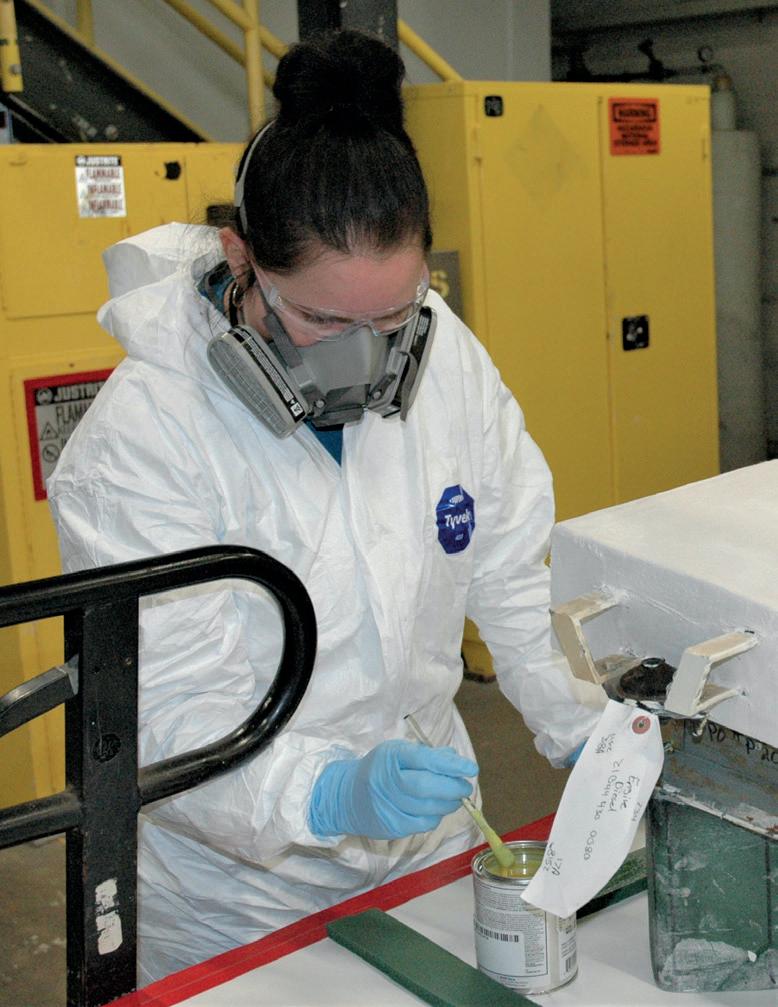
Under the guidance of Dean for Academic Affairs, Technical and Industrial Programs Thomas Wesley, the program has grown to the current enrollment of 185 apprentices, with an additional 63 apprentices added during Spring 2023 and 33 graduates in academic year 2022.
Coastal Pines is committed to the continued growth of the apprenticeship program with TRF, to workforce development, and to building strong pipelines of students for companies within our service area.

This commitment can be seen in the addition of fulltime Apprenticeship Coordinator Kimberly Burgess, who is dedicated to assisting businesses with the apprenticeship onboarding process. Through a comprehensive effort, Burgess is working with employers of all sizes and disciplines
from large companies to smaller family-run businesses.
“There is a need in our local workforce to provide businesses with skilled, trained employees, and apprenticeships are a proven industry-driven training model that provides strong reliable pipelines to meet immediate and long-term needs,” Burgess says.
Coastal Pines continues working on innovative ways to assist the workforce of Southeast Georgia. Covering a 13-county area encompassing 7,433 square miles, there is endless opportunity for growth.
“...apprenticeships are a proven industry-driven training model that provides strong reliable pipelines to meet immediate and long-term needs.”
- Kimberly Burgess, apprenticeship coordinatorTrident Refit Facility Shipwright and Insulator Apprentices from Naval Submarine Base Kings Bay are shown repairing various submarine components as part of the job specific, hands-on learning portion of their apprenticeship.
From high school partnerships to industry placements, Columbus Technical College (CTC) is working to positively affect the landscape of nursing and healthcare in the Chattahoochee Valley and surrounding areas.


Columbus Tech is working to increase the footprint of healthcare programs offered at the institution while simultaneously ensuring that the community receives optimum care.
The CTC leadership team is acutely aware of the growing demand for skilled and qualified healthcare professionals in a field that continues to show trends of being understaffed and under-resourced.
According to a March 2023 article from the Nursing and Health Sciences Journal, average estimates of nursing shortages in hospitals range from 10.2% to more than 20% in some areas. Local news reports estimate that Georgia is one of seven states expected to have a severe shortage of nursing personnel by year 2030.
The overarching desire to produce the workforce of the future has culminated in CTC program expansion efforts directly targeted at meeting growing industry needs. Associate degree nursing cohorts previously only enrolled about 45 students annually. Program parameters are now in place that allow more than 100 students to matriculate through the program each year. This critical expansion is producing
“Here in Georgia, we are committed to meeting the needs of our young people as they prepare to enter our world-class workforce following years of pandemic disruptions, and we are excited to see how this program will make a difference in their lives as it also helps us fulfill a critical workforce need.”
- Brian P. Kemp
the skilled workforce of the future needed at more than twice the previous rate.
CTC’s Division of Health Sciences and Nursing is home to dozens of programs including, but not limited to:
• Dental hygiene and/or assisting
• Paramedicine nursing radiologic technology
• Respiratory care
• Medical assisting
• Medical coding
• Surgical technology
This is the largest division at Columbus Technical College and its students are the beneficiaries of the latest in healthcare technology.
CTC is also helping to prepare incoming students for the workforce. In a partnership with Chattahoochee County Schools’ career academy, Chattahoochee Valley Academy (CVA), CTC has piloted a healthcare program through Gov. Brian P. Kemp’s Georgia Emergency Education Relief (GEER II) Award. The partnership is specifically designed to create a streamlined path for students seeking careers in healthcare.
“Here in Georgia, we are committed to meeting the needs of our young people as they prepare to enter our world-class workforce following years of pandemic disruptions, and we are excited to see how this program will make a difference in their lives as it also helps us fulfill a critical workforce need,” says Kemp.
TCSG chose the partnership between CTC and CVA in conjunction with Magnolia Manor of Marion County in Buena Vista as one of ten pilot programs statewide. The award funding will offset tuition costs of the technical college certified nurse aide program (CNA) and pay for each participant’s CNA exam costs.
“This joint partnership sponsored by the governor’s office and linking strong community outlets from the high school, technical college, and industry levels is strategic alignment at its best,” says CTC President Martha Ann Todd. “Working together to meet the needs of the healthcare industry and to empower pathways for young people in the Chattahoochee Valley area makes us excellent public stewards of the future trajectories of both business and education. Columbus Technical College is excited to
partner and contribute to what has been a 100% pass rate on student CNA exams in this program over the last three years. We believe that the additional support this pilot will provide will serve to put these students on the path to a successful career in healthcare fields.”
Under program guidelines, eligibility will initially be granted to high school sophomore and junior candidates. The overarching goal for this grant is to address current healthcare industry shortages while also assisting students with obtaining career opportunities as quickly as possible.
The diagnostic medical sonography (DMS) class of 2023 achieved a 100% pass rate on two of their three required
American Registry for Diagnostic Medical Sonography® (ARDMS) OB/GYN exams. By successfully completing these exams, the students will graduate from the DMS program and enter the workforce as registered diagnostic medical sonographers. CTC is delighted to have such dedicated students in the program, who will go on to serve the community at such an elevated level of skill and expertise.
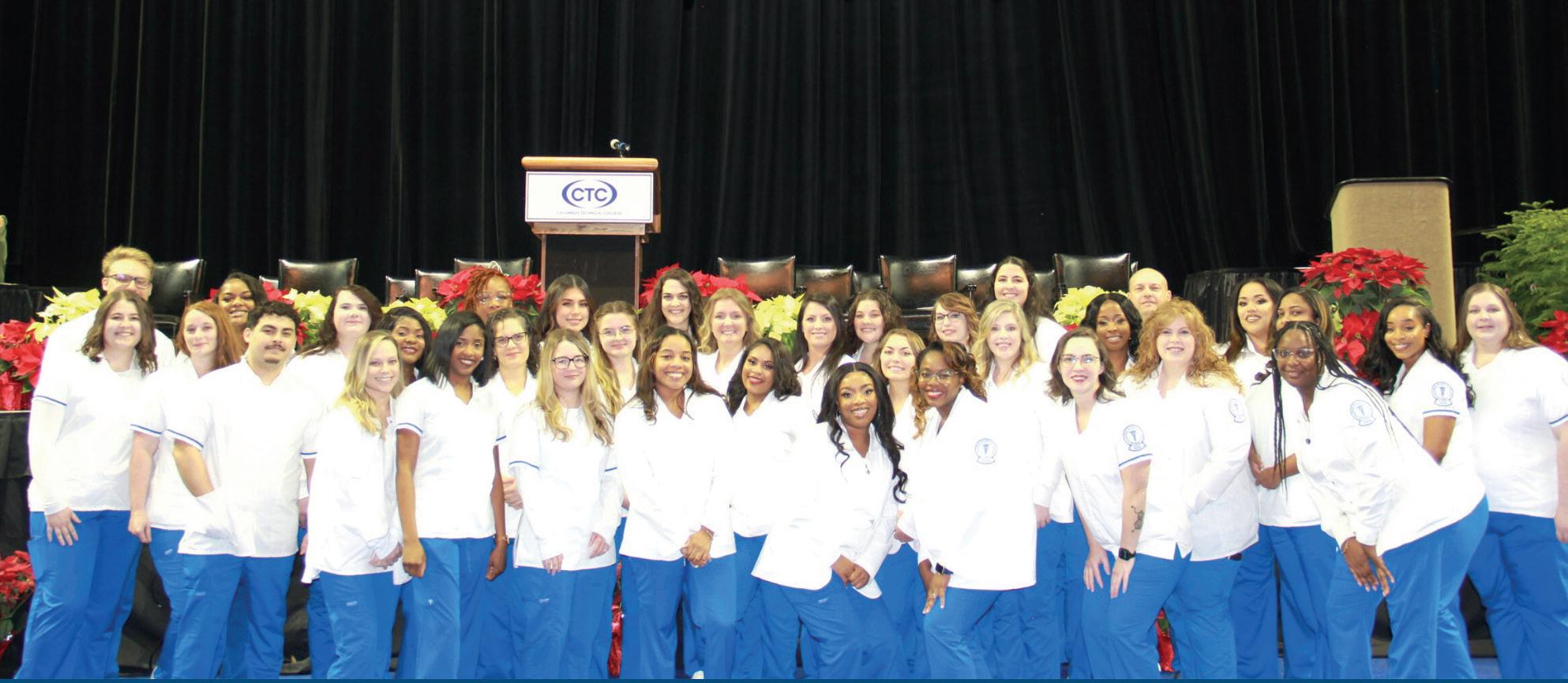
“Working together to meet the needs of the healthcare industry and to empower pathways for young people in the Chattahoochee Valley area makes us excellent public stewards of the future trajectories of both business and education.”
- CTC President Martha Ann ToddColumbus Technical College nursing students
Leaders from Georgia Power joined with officials from TCSG, Georgia Northwestern Technical College (GNTC), and state and local representatives at GNTC’s Polk County campus in Rockmart to announce the newest program in Georgia to support training and education for future line workers.
Through a collaboration between Georgia Power and GNTC, students benefit from a robust training program including line worker organizational principles, workplace skills, line worker automation, and occupational skills. Students also can earn a restricted class A commercial driver’s license (CDL) through the program.

“The partnership between Georgia Power and Georgia Northwestern Technical College’s Polk County campus dates back nearly 15 years,” says GNTC President Heidi Popham. “The addition of the line worker program reinforces Georgia Power’s continued commitment and investment in providing a skilled workforce. Georgia Power has proven to be one of GNTC’s most committed partners. We are grateful for their continued support of GNTC and technical education. It is through partnerships like this that GNTC is able to provide opportunities for students and to meet the workforce needs of the communities we serve.”
During the first cohort, which graduated in October 2022, 18 students experienced a vigorous training program that included donated equipment such as trucks, poles, and climbing equipment, as well as hands-on expertise from
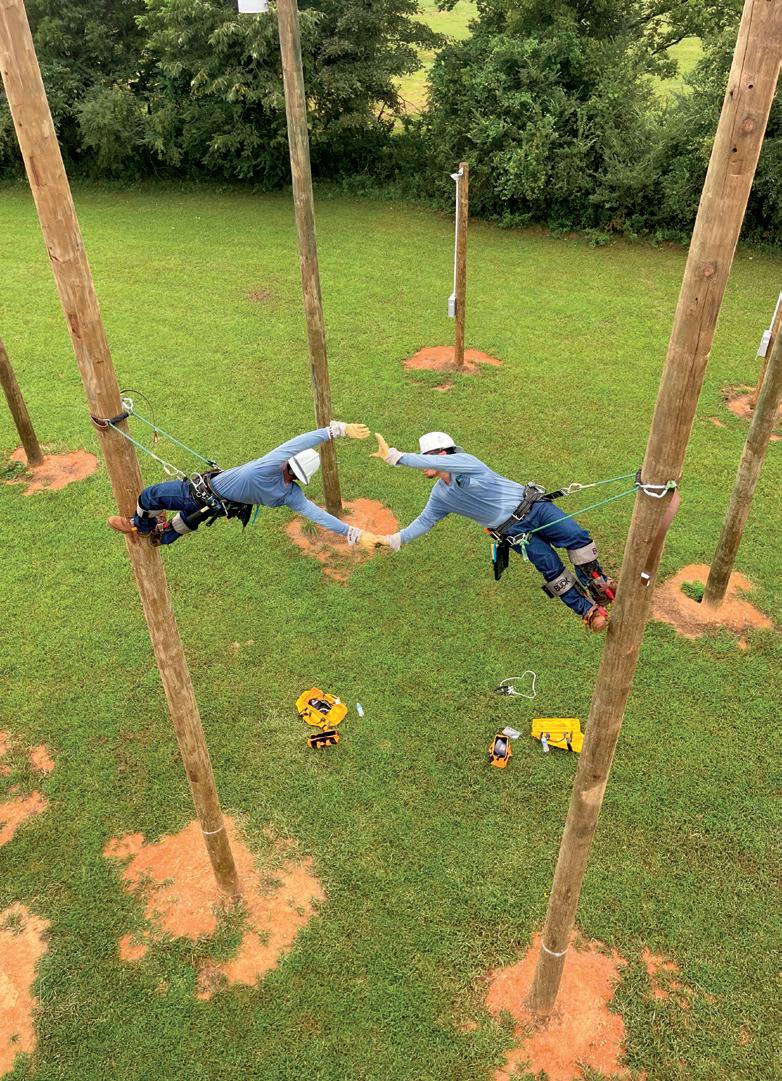
Georgia Power instructors. Upon completing the program, students received four certificates of completion for electrical line worker, CDL, OSHA 10-hour general industry, and an overall certificate verifying 395 training hours completed.
Installing and maintaining electrical line equipment is a highly rewarding career field, but it can also be challenging. Line workers often face tough conditions in the field, especially following severe weather. Robust training and education programs are critical to prepare line workers to work safely in real world conditions as they help ensure reliable electrical service for millions of Georgians.
“We’re proud of our longstanding relationship with the Technical College System of Georgia, and for the positive impact of the programs we have developed to help support our state’s need for highly skilled and well-trained line workers,” says Chris Womack, former chair, president and CEO of Georgia Power. “As we work every day to build Georgia’s energy future, we need workers on the line, delivering for our customers and all Georgians. It truly takes partnerships across the public and private sector to cultivate that much needed pipeline and give our state’s youth a path forward into these critical trade roles.”
In addition to the new program at GNTC, Georgia Power has partnered for years with TCSG to create line worker programs at other institutions including Atlanta Technical College, Coastal Pines Technical College, North Georgia Technical College, South Georgia Technical College, Southern
Regional Technical College, and West Georgia Technical College. In addition, the company supports electric utility technology (EUT) programs at Lanier Technical College and Savannah Technical College.
At the October 2022 graduation ceremony, State Sen. Jason Anavitarte acknowledged the current shortage of line workers and praised GNTC’s electrical line worker program. “I wish we had 20 of these programs across the state,” he said. “And I hope Georgia Power, Alabama Power, and Southern Company will continue to invest in these programs in our technical college system throughout the state.”
All 18 graduates are now employed with companies including DLC Utility Group LLC, Georgia Power, Marietta Power, Pike Corp., and U-TEC Construction.
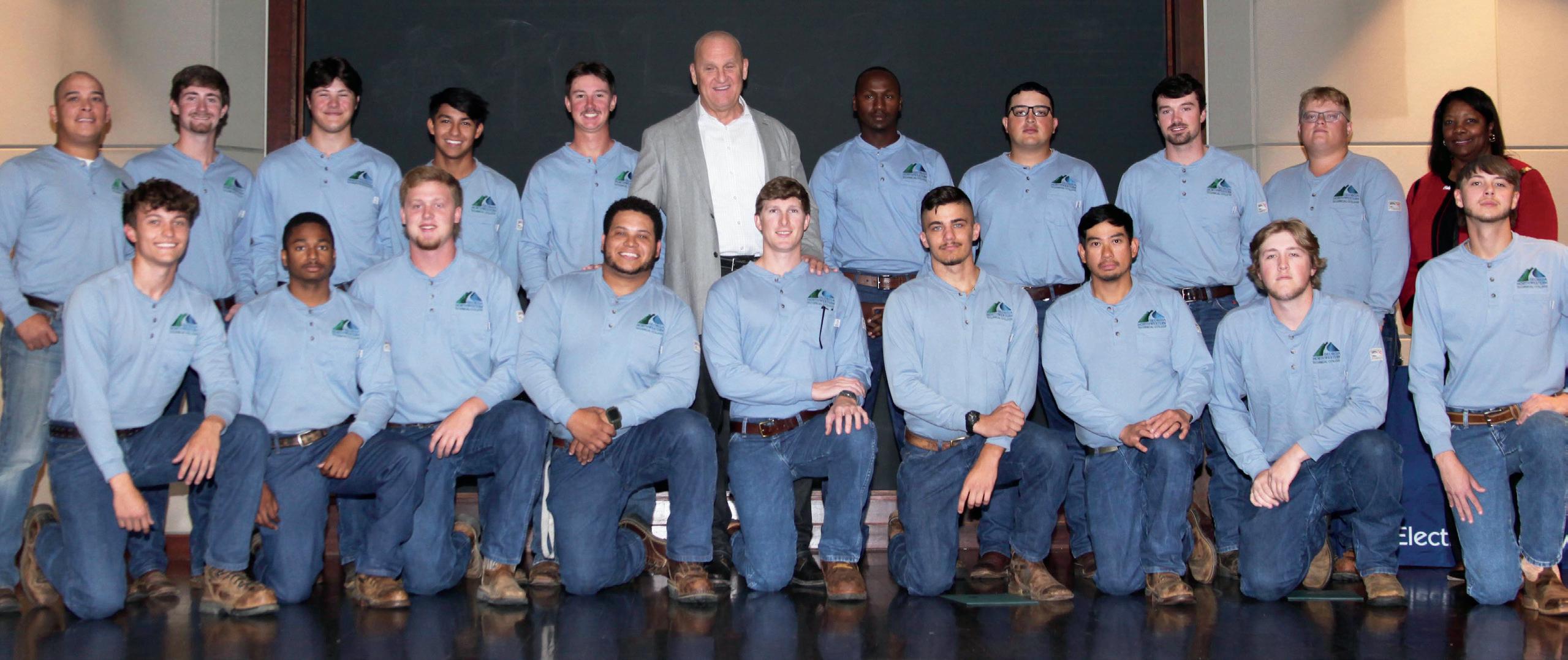
“I was enrolled at GNTC to become an industrial electrician when I saw the opportunity to sign up for the electrical line worker program,” says Salvador Barragan, who graduated in the first cohort and is now an apprentice line worker at Pike Corp. “I saw it as an opportunity to get off night shift.”
The difference in pay from his previous job was also a significant motivator to make the switch. His salary is nearly twice what he earned before, and he has just started in the trade, he says. In his current position, he evaluates the job at hand and anticipates the materials and tools the line worker in the air will need to complete the job.
He praised the program’s instructors for helping him to become adept at climbing poles and to learn how to use and
trust his equipment for a job that is physically and mentally challenging.
“No day is ever the same,” he says. “Working on a good crew really makes the time at work fun and enjoyable.”
“I cannot think of a more selfless job that we have at Georgia Power and across Southern Company than being a line worker,” says Fran Forehand, senior vice president of power delivery at Georgia Power. “Line workers get up in the middle of the night or early morning to restore power after a storm and are always on call.”
“The electrical line worker program is an opportunity to get into a trade that will provide you and your family with a great quality of life,” Barragan says. “It is by far one of the best decisions I have made personally. It’s changed my life for the better in many ways, especially financially.”
“The electrical line worker program is an opportunity to get into a trade that will provide you and your family with a great quality of life.”
- Salvador Barragan, line worker, Pike Corp.(left) Georgia Northwestern Technical College President Heidi Popham with former Georgia Power President and CEO Chris Womack (above) Georgia Northwestern Tech’s first cohort of electrical line worker students
Georgia Piedmont Technical College has big plans for the future that include being the leading provider of a high-tech workforce in the booming nanotechnology and microchip processing world. One major phase of that goal is already underway as the college has teamed up with an international leader in the semiconductor industry, Absolics, a subsidiary of South Korea-based SKC, to provide work-ready education and training for residents in and around Metro Atlanta. To build on the importance of providing an educated workforce in these high-paying, high-demand, hi-tech jobs, GPTC is implementing industry-recognized credentials as well as degrees, diplomas, and technical certificates of credit that will focus on semiconductor technician training and quality control. A memo of understanding (MOU), signed by the two entities in March, cements the commitment to providing education and skills that will lead to invaluable experience for future employees of Absolics.
“To be able to partner with an organization that is so internationally respected as Absolics/SKC is incredible,” says GPTC President Tavarez Holston. “And this is what we do. Georgia Piedmont Technical College prepares its citizenry for a better life. Providing training through our economic development and academic areas for potentially hundreds of people is humbling, and we can’t wait to get started. We know it will be a successful, long-standing working partnership.”
Sung Jin Kim, chief technology officer of Absolics says, “GPTC is a tremendous partner of Absolics, and we are thrilled to be entering into an official relationship through this signing ceremony. Absolics hopes to address workforce development challenges together with GPTC. This partnership will serve to strengthen the U.S. national semiconductor
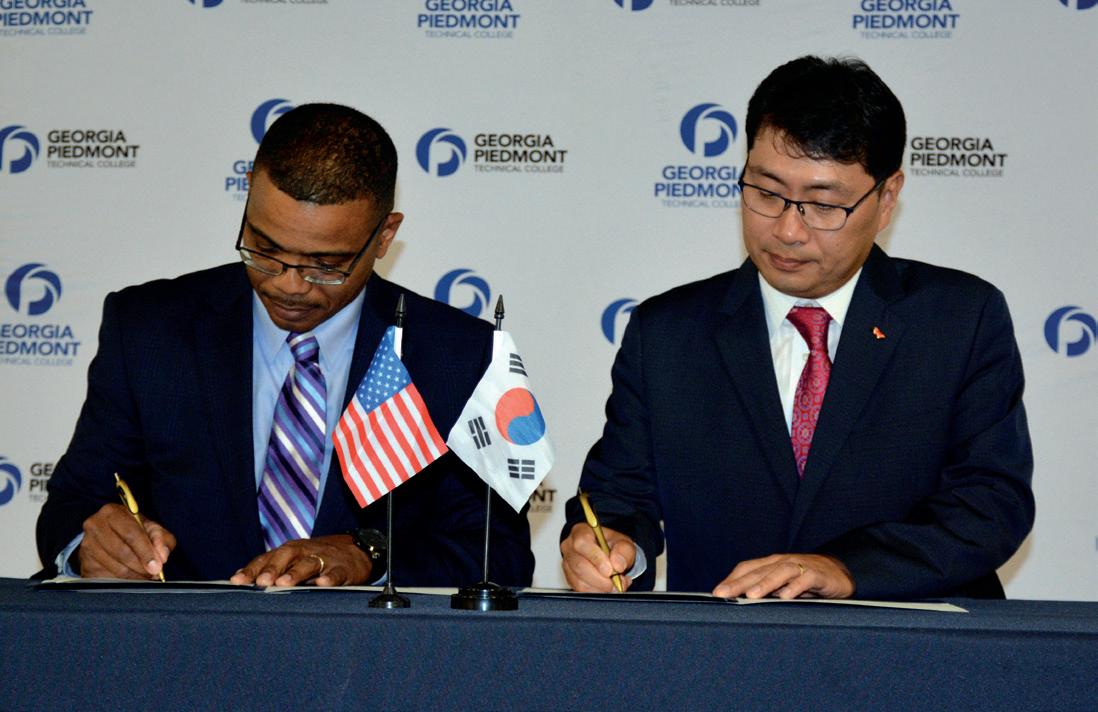
manufacturing competitiveness, accelerate the introduction of a semiconductor ecosystem to the state of Georgia, and vitalize the local economy in the long run.”
The investment has been described as a game-changer, particularly in Newton County. Part of the MOU between Absolics and GPTC includes developing a STEM-focused career pipeline, as well as promoting K-12 campaigns to educate young people about STEM careers. Meanwhile, Absolics is already putting down a prominent footprint in Covington. The company broke ground on a multi-milliondollar manufacturing facility and expects to hire hundreds, if not thousands, of employees over the next several years.
As a surprise announcement after the signing agreement, GPTC unveiled its vision for the future – a hands-on learning and training facility, aptly named the Center for Innovation and Emerging Technology. While the center is still in the conceptual and planning stages, it is expected to measure around 70,000 square feet and will be equipped with the latest in learning environments and laboratories that mirror real-world, on-the-job training. The proposed center will be built in Newton County.
“While the Center for Innovation and Emerging Technology is in the visionary stage, the college is so excited about all the possibilities it can bring,” says Holston. “We expect the center to be ‘the’ place for students and employees to go when it comes to learning and training in hi-tech, high-demand, and high-paying industries like advanced manufacturing, artificial intelligence, bioscience technology, cybersecurity, computer engineering, electric vehicle technology – both land and air – and more.”

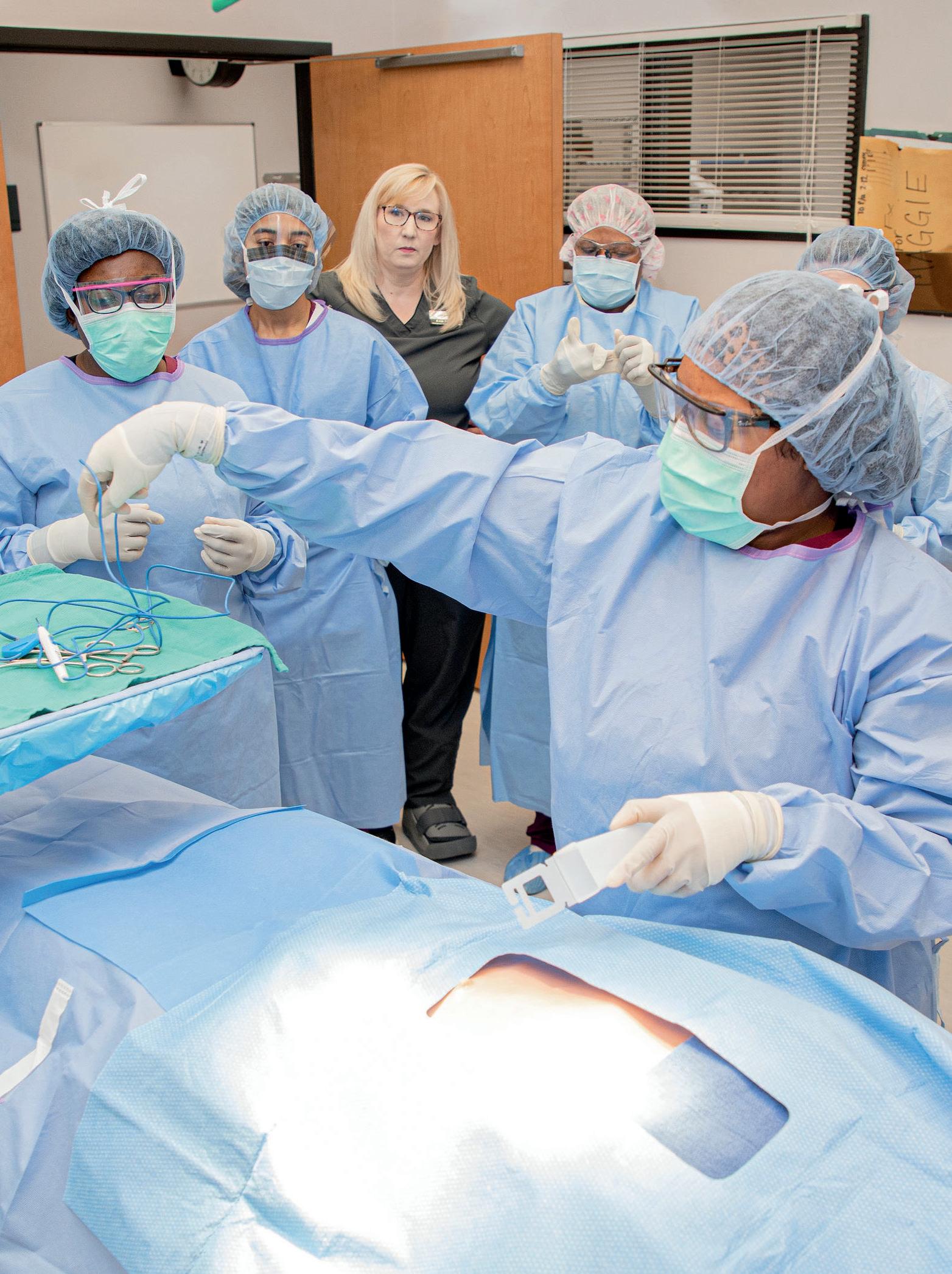
The Gwinnett Technical College surgical technology program serves as a springboard for surgical technicians in metro Atlanta. Since 2012, students in the surgical technology program have consistently earned a 100% pass rate on the national certification boards.
Program Director T.C. Parker says, “Our pass rate is an accomplishment because this gives the student the credential CST (certified surgical technologist), the only nationally recognized credential.”
Surgical technology refers to the specialized area of healthcare that involves assisting surgeons during surgical procedures. Surgical technologists, also known as surgical technicians, are trained professionals who work alongside surgeons, anesthesiologists, and other surgical team members to ensure that surgeries are conducted safely and efficiently. Some of the typical tasks that surgical technicians perform include:
• Preparing the operating room for surgery, including setting up surgical instruments, equipment, and supplies needed.
• Assisting during surgery by handing surgeons instruments, holding retractors, cutting sutures, and performing other tasks as needed.
• Maintaining a sterile environment by sterilizing instruments and equipment, donning sterile gowns and gloves, and ensuring the surgical area remains free of contaminants.
• Monitoring patients’ vital signs during surgery and reporting any changes to the anesthesia provider and surgeon.
• Post-surgery duties include helping clean and restock the operating room, preparing the patient for transfer to the recovery room, and transporting the patient to the recovery room.
According to data from the U.S. Bureau of Labor Statistics, the mean annual wage for surgical technologists in the Atlanta metro area is $49,370. Gwinnett Tech students go on to work primarily in hospitals and surgery centers. However,
more graduates are being hired for non-surgical areas of the hospital, such as cardiology and interventional radiology departments, and by surgical sales companies. In addition, many Gwinnett Tech graduates pursue higher training as surgical first assistants and physician assistants, with many choosing to enter nursing. There are a multitude of avenues that the surgical technology student can springboard into with the education they have obtained through the program.
“Our surgical technology program is a great example of the quality of our health programs and the dedication of our highly skilled, experienced faculty,” says Dr. Glen Cannon, president of Gwinnett Tech. “Our 22 health programs are the foundation the entire health ecosystem is built upon. Our students save lives and are one of the most important factors in the world-class health system that makes Gwinnett and North Fulton one of the best places to live and work in the world.”
Gwinnett Tech partners with local clinical partners to ensure students are prepared for the workforce. These partners include Children’s Healthcare of Atlanta, Emory Healthcare, Grady Memorial Hospital, Piedmont Healthcare, WellStar North Fulton Hospital, and Northside Hospital.
Lanier Technical College’s mission of workforce development hits home for many of the high school equivalency (HSE) graduates who have walked through its doors. Lanier Tech continually serves as a career accelerator for all of the students who seek to graduate from its many programs.
Lanier Tech’s adult education program is designed to prepare students for GED/HiSET testing, English acquisition courses, and basic office skills. Program leaders annually select an Exceptional Adult Georgian in Literacy Education (EAGLE) Student of the Year. This student, who is selected out of their adult education program’s graduating class, is chosen for their dedication to their education and perseverance through challenges to achieve their HSE diploma. Each EAGLE winner from each technical college then competes to become the state-wide Dinah Culbreath Wayne EAGLE Student of the Year.
Kayla Hill, a 2022 GED graduate from Lanier Tech’s adult education program, was first chosen as Lanier Tech’s 2023 EAGLE. Through competitions, interview panels, and speeches, Hill then became the 2023 statewide EAGLE winner. Hill’s rise to statewide recognition had a rocky start as she overcame many challenges to reach where she is today.
“Up until April of 2022, I was a statistic. At age 15, I gave birth to my first child. At age 16, I was a high school dropout. By the age of 22, I was a mother of five kids with no education, no employment history, and in a hopeless marriage,” says Hill. “Around 2016, I turned to drugs and alcohol after receiving bad news about my brother. These habits gave way to six arrests and eventually a felony drug charge. While in a Barrow County prison, a GED program facilitated by Lanier Technical College in 2022 is where I started to turn my life around.”
The GED prison program united Hill and her Adult Education Coordinator Sally Brown. Twice a week Brown
prepared Hill for the upcoming GED tests. Within one month she passed two tests and had a new-found plan to take the prison-sponsored welding boot camp once she had obtained her GED.
“During my last GED examination, I anxiously awaited the test results thinking that I have failed and will need to retest. Suddenly, an officer on duty yelled out ‘Kayla you passed!’ I was in shock, and everyone cheered. After obtaining my GED, the prison-sponsored welding boot camp I was enrolled in became enjoyable. I decided to continue my welding education and applied to Lanier Tech’s welding diploma program. To my happiness, I was accepted.”
Kayla began classes at Lanier Tech in August 2022 and has since passed with flying colors.
“Before beginning my relationship with Lanier Technical College, my life was a literal wreck. Deep inside of me there was a longing for more and adult education helped make that a reality. With the opportunity of the HOPE Career Grant, I have continued with my welding program. I’m in my third semester of the diploma program and I am happy to say that I have earned As.”
Hill’s academic progression did not stop with the welding diploma program. Because of her new title of state EAGLE winner, she was awarded a full two-year scholarship to a technical college of her choosing. Once she completes her welding diploma, Hill will work to obtain an associate of applied science in business degree.
“What a difference a year makes. I’ve had many opportunities to publicly speak to civic organizations about the impact adult education has had on my life,” says Hill. “I’ve had the chance to give back to those who have helped me along the way by proctoring GED exams inside correctional facilities. And to think it all started a little over 14 months ago with earning my GED at Lanier Technical College.”
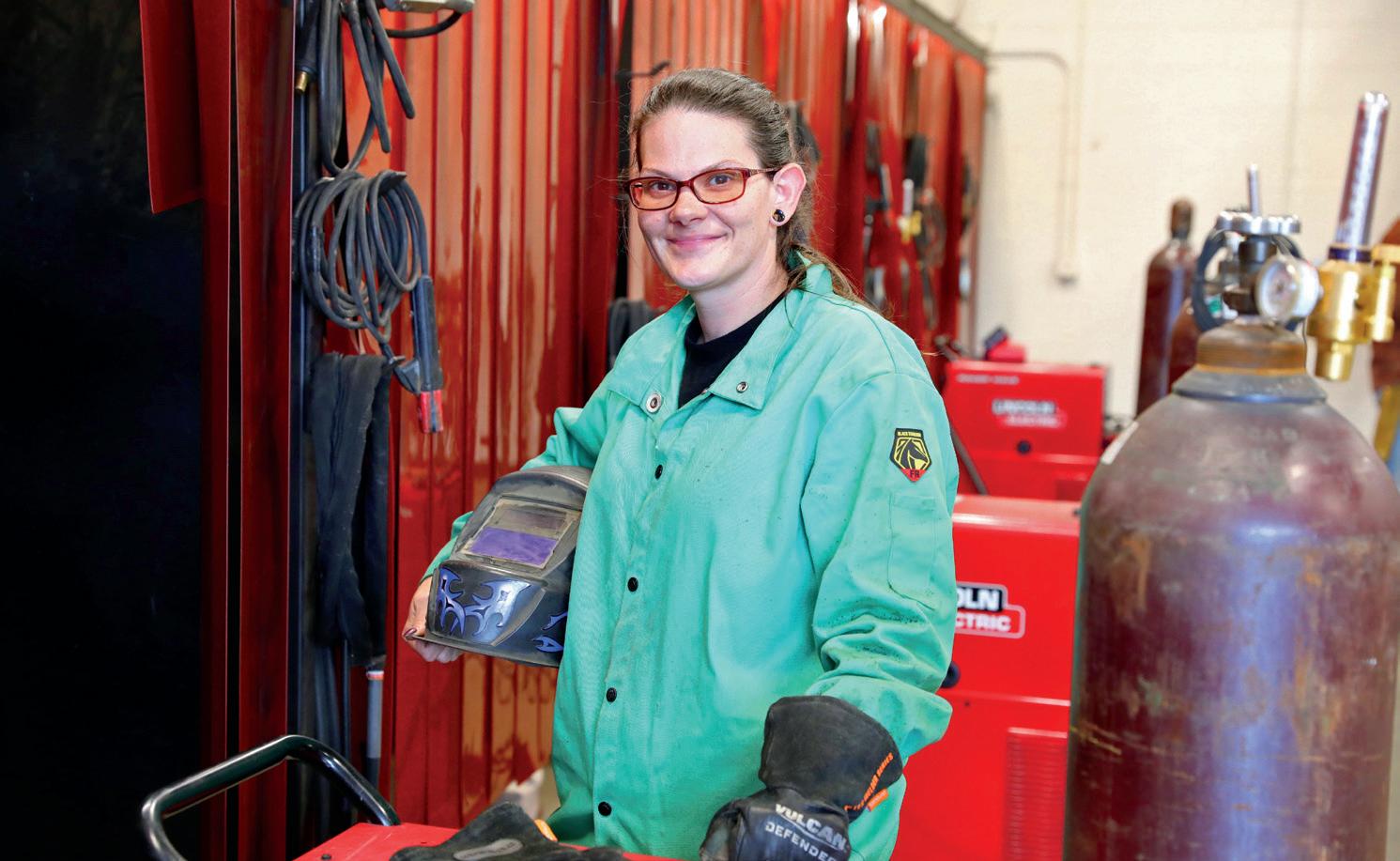
North Georgia Technical College has been approved by the Georgia Board of Nursing to offer a new program bridge pathway from practical nursing (PN) to associate of science degree in nursing (ASN).
The new ASN bridge option program will provide an accelerated, direct academic pathway to registered nursing (RN) for current PNs by using prior learning and previous work experience to reduce the number of courses required to complete the program. The new program would further prepare ASN graduates from the college to pursue a bachelor of science in nursing (BSN).
Registered nursing is projected to have the second highest growth rate in occupations in Georgia and the most annual career openings in metro Atlanta and North Georgia. North Georgia Technical College is implementing the bridge program as a direct result of growing student demand for allied health training, job availability, and projected job growth.
“We are very pleased to offer this new fast track to registered nursing to our community beginning in 2024,” says NGTC President John Wilkinson. “Our college faculty and staff have been very diligent in their efforts to make this a possibility for so many nurses who have requested this option at North Georgia Technical College to advance their careers.”
“The college has received overwhelming support from
key healthcare providers and major influential community leaders within our college service area,” says NGTC Vice President of Academic Affairs Mindy Glander. “Community and workforce partners have indicated support of the PN to ASN program by signed letters of support and clinical agreements for the program’s students to complete clinical requirements at our partners’ facilities. Individuals representing these groups understand the beneficial impact that the additional nursing program at NGTC could have on our community workforce.”
“Our current nursing faculty have been instrumental in the development of the bridge program by bringing their wealth of knowledge, expertise, and experience to the table,” says NGTC Dean for Academic Affairs Christy Bivins. “Stacie Perry, ASN program director, has worked tirelessly to ensure this program meets the needs of the nursing profession and our students. The contributions from both Ms. Perry and our faculty have been critical to the developmental approval of the bridge program, and their commitment to excellence in nursing education is a testament to their dedication to advancing the profession.”
The college plans to offer its first cohort of nursing students in the new ASN bridge option program beginning January 2024.
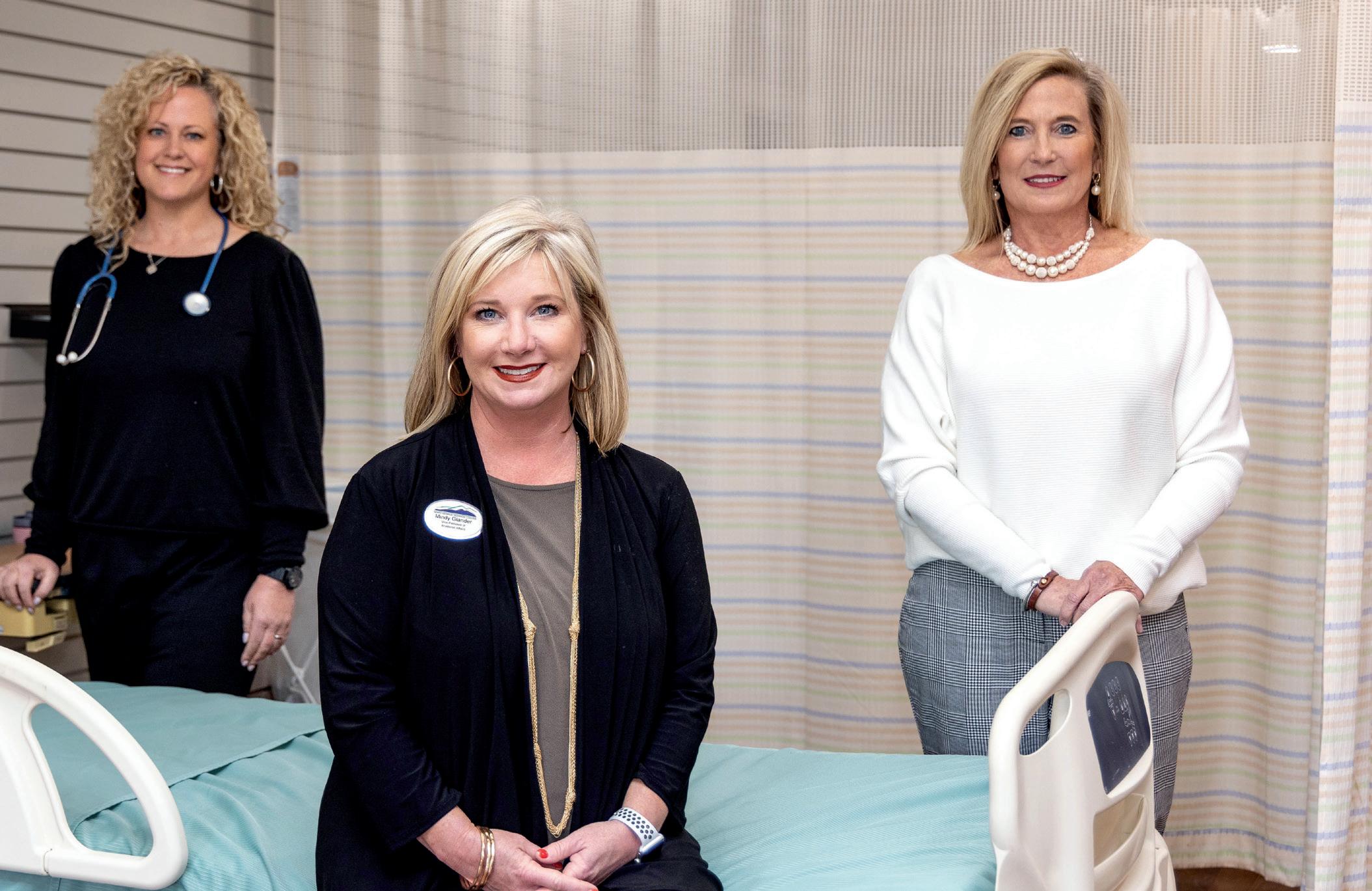
After a season of exponential growth which consisted of acquiring 15 new lumber and oriented strand board (OSB) mills, West Fraser, a diversified wood products company with more than 60 facilities across Canada, the United States, the U.K., and Europe, knew they needed to outsource their qualified millwright and professional leadership development training – key components of the company’s mission to invest in its employees.
That’s when Oconee Fall Line Technical College (OFTC) stepped in to meet the need of local industry.
Because OFTC is conveniently located near several of West Fraser’s Southeastern mills, company leaders reached out to the college to discuss expanding their training partnership to mills in this part of the country.
“Our goal is to create world-class training for the advancement of our employees,” says Bobby Buchanan, who is responsible for corporate maintenance training at West Fraser. “We know that as we invest in our employees, we create an atmosphere of growth as well as see the business benefits of increased production with minimal downtime. We look for community partners who can help us achieve these goals, and OFTC has been that partner for West Fraser.”
After learning of their needs, OFTC partnered with West Fraser to provide internal qualified millwright, qualified electrician, and leadership training for their employees in the Southeastern U.S.

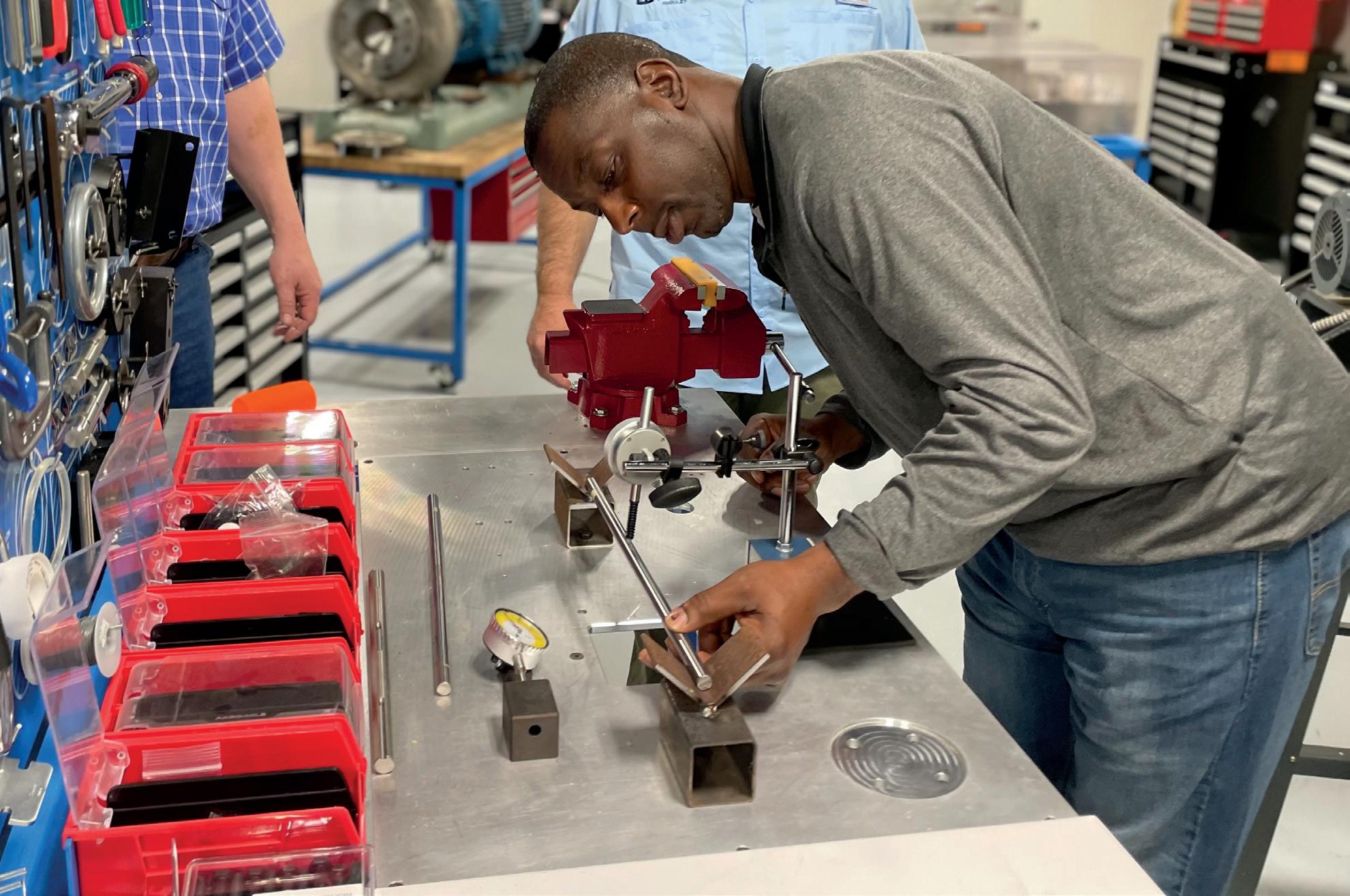
“These customized training pathways were developed by West Fraser and are being delivered by OFTC,” says Kim David, OFTC’s vice president for economic development.
Known for its ability to provide quality customized training for local industry, OFTC pulled together resources to meet the needs of West Fraser.
“We were able to quickly respond to West Fraser’s requests and started training in all areas in a short time frame once we identified our training location and instructors,” David says.
The college used existing qualified staff to teach certain training courses, hired subject matter experts to teach others, and renovated lab space to meet the industry’s training needs.
“Because of West Fraser’s commitment to OFTC and the training partnership, we were able to renovate an existing space in the Dubose Porter Business and Industry Training Center to serve as a flexible lab space,” David says. “This space can also be utilized for training for other industry partners and additional OFTC classes as scheduling allows.”
“Not only was the OFTC Dublin campus easy access for several of our facilities, but their willingness to adapt to our sawmill specific training for millwrights and electricians, along with logistics, made them the best group to facilitate the training we needed,” Buchannan says.
To accomplish the quick turnaround and start training immediately, OFTC utilized the contents of three TCSG mobile industrial systems training labs to provide hands-on learning opportunities for students.
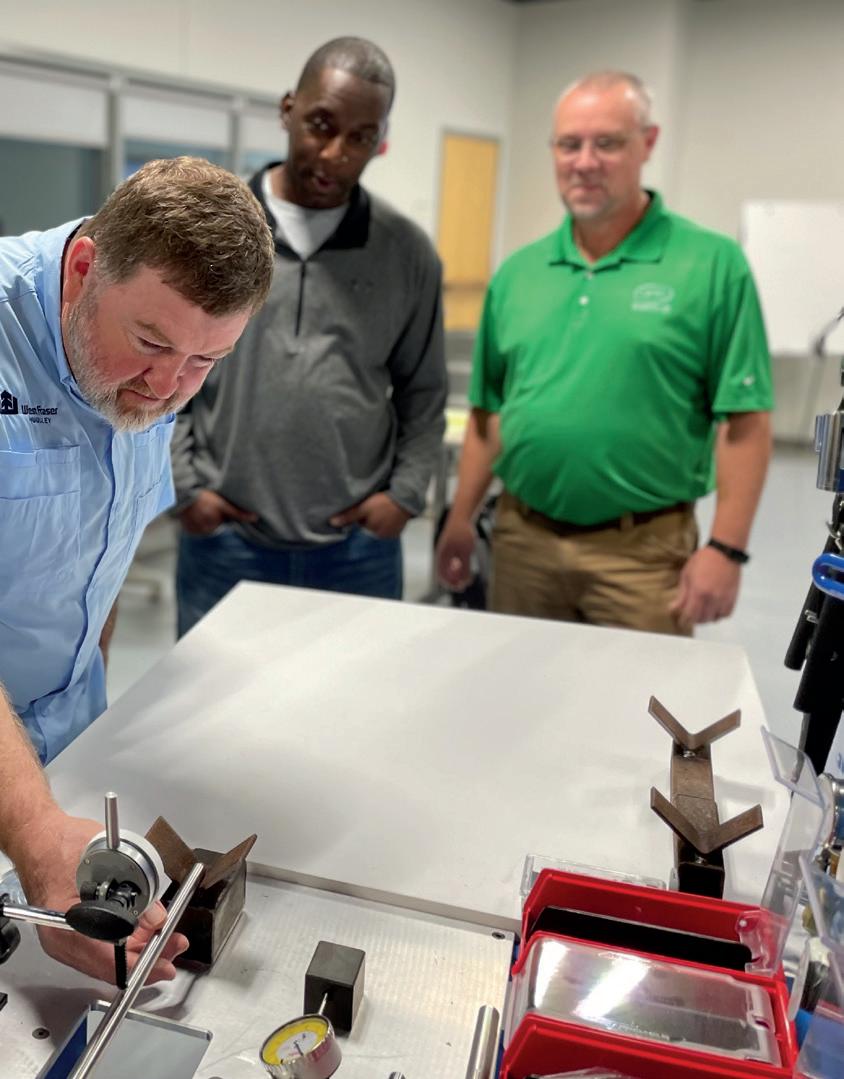
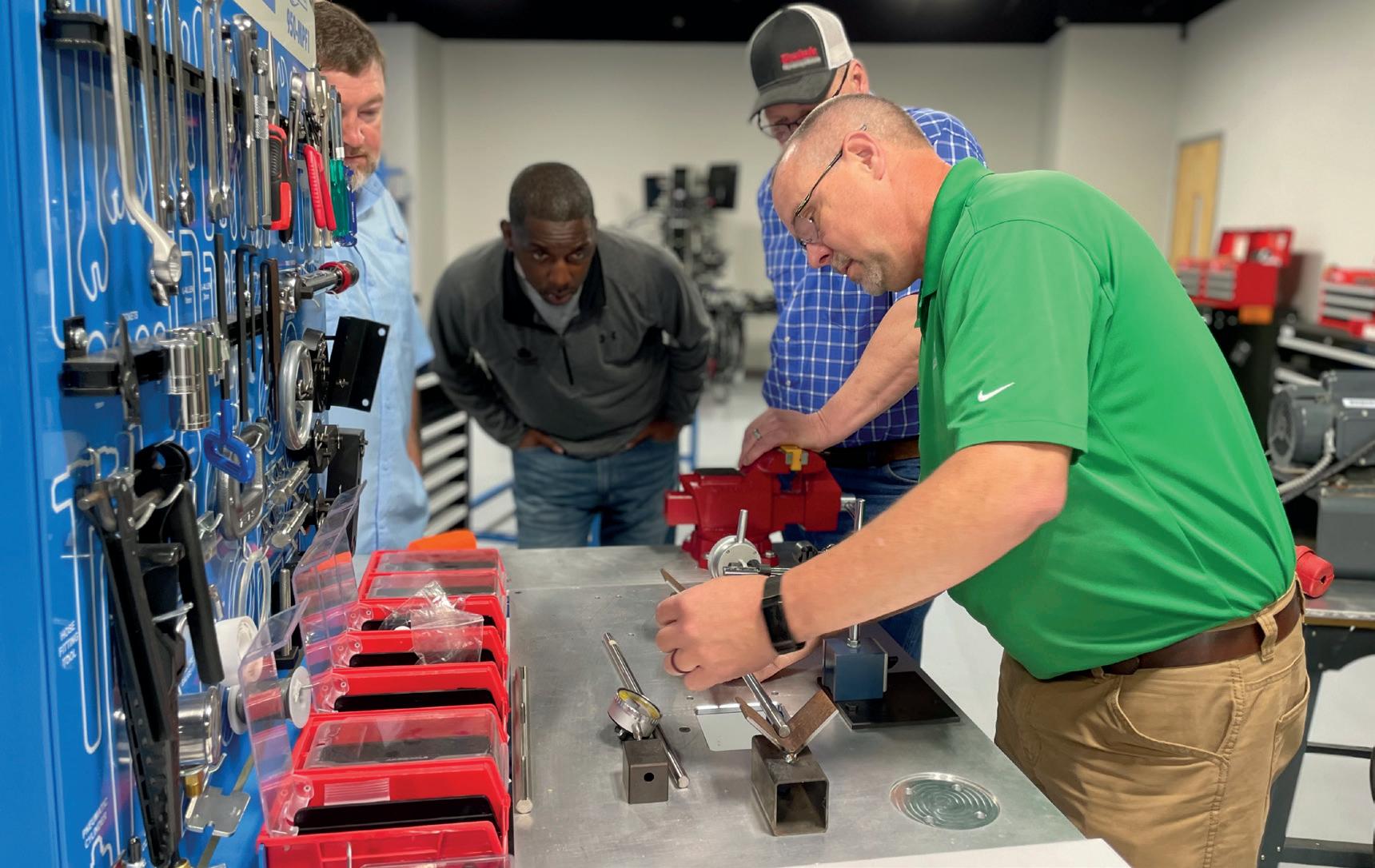
“This training partnership is a perfect example of OFTC’s
economic development department’s ability to be flexible and deliver customized content to meet specific company needs,” David says. “It shows the college’s commitment to assisting a local industry partner with meeting their immediate workforce needs and has allowed us to expand our offerings and expertise and develop flexible training spaces that can meet the needs of a variety of industries in our service delivery area.”
Not only did OFTC meet the needs of local industry, but they’ve done it well, leaving a positive impression on both West Fraser and the students enrolled in the training.
“We regularly collect surveys on class participant experience and OFTC gets high marks,” Buchanan says. “We appreciate the hard work OFTC puts in daily to further our partnership. We view the staff and trainers at OFTC as an extension of our own team, and we look forward to many more years of partnership.”
Echoing his words on partnership, OFTC President Erica Harden commented on the importance of the college’s workforce development mission and how the West Fraser partnership is a prime example of how the college can support local industry.
“We are seeing more companies who are committed to workforce development given the lack of availability of workers in recent days,” she says. “We have several companies participating in apprenticeships and internships while others are investing in customized training like West Fraser. Regardless of the need, OFTC is here to help our local industries.”
The George W. Strickland Jr. Foundation and its board of directors have signed an agreement with the Ogeechee Technical College Foundation to fund an endowment worth $1.5 million. The endowment, the largest in the college’s history, will be used to establish an associate of science in nursing (ASN) degree. The new degree pathway is scheduled to accept its first cohort in January 2024.
“We are incredibly grateful to the Strickland Foundation for once again helping us meet the needs of our community,” says OTC President Lori Durden. “Our healthcare systems are seeing a major shortage of qualified nurses and having the ability to educate and graduate skilled LPNs and RNs is going to have a significant positive impact on the workforce in our region.”
The self-perpetuating endowment was established to provide $150,000 a year for ten years to support staffing needs to launch the ASN degree. In addition to this gift, the Strickland Foundation has supported capital projects like the Jack and Muriel Strickland building in Hagan, Ga., as well as contributions to help retain OTC students through the Strickland Guarantee fund.
George W. Strickland, or “Mr. Jack” as his employees knew him, founded Evans Concrete in 1948. Before his death in 2010, the company’s footprint reached and employed residents from approximately 16 counties in Southeast Georgia.
“Mr. Jack was very specific regarding his vision and purpose for the foundation. He supported education and his community, and he loved his employees,” says Sharon Deloach, George W. Strickland Jr. Foundation board member. “As board members, our only mission is to carry out Mr. Jack’s wishes – to inspire hope, strengthen community through education, and contribute to the betterment of mankind.”
To that end, the new ASN degree will initially accept 24 students in its first spring cohort in hopes to begin closing the nursing shortage in the region. Nurses make up the largest segment of the health profession and the competitive program will allow students to earn their RN credentials and to enter the workforce with the ability to administer medication and treatments and offer educational advice to patients.
“The ASN degree is going to have such a positive impact on not only East Georgia Regional Medical Center (EGRMC), but our entire region. We absolutely love hiring LPN graduates as well as other allied health professionals from OTC’s nationally ranked program,” says Stephen Pennington, CEO of EGRMC. “The OTC grads are well trained and have positive, can-do attitudes. Now, the LPNs can advance their professional and personal lives right here at OTC in Statesboro. The new program will impact our Healthcare Community for years to come.”
“As one of Georgia’s 66 rural hospitals, Evans Memorial is thrilled to partner with OTC on this outstanding program to enhance the professional practice of nursing,” says Bill Lee, CEO of Evans Memorial Hospital. “We continue to experience shortfalls with nursing recruitment and this program will work to ensure a continued pipeline for those interested in a career that involves caring for our community.”
“OTC is poised and ready to provide hospital simulations and hands-on training for students enrolled in the program,” says Michelle Davis, vice president for college advancement at OTC. “Partnering with the Strickland Foundation to provide staff that can help us train future RN’s is a critical piece in making this all come together.”

Hyundai Motor Group Metaplant America (HMGMA) and Savannah Technical College have signed a memorandum of understanding (MOU) that will provide valuable training opportunities for people interested in careers in the electric vehicle (EV) production industry. The first program to be offered through this partnership is the electric vehicle professional certificate, which will equip students with the necessary skills to excel in the rapidly growing field of electric vehicles.
With the global shift toward EV transportation, demand is on the rise. Recognizing this trend, Hyundai Motor Group sought to establish a training program that would prepare students for entry-level employment in their industry. The electric vehicle professional technical certificate of credit, developed in collaboration with Savannah Technical College, focuses on providing students with a comprehensive skill set necessary for success in this evolving field.
The electric vehicle professional certificate is an eight-credit-hour program that covers essential topics related to electric vehicle technology. The curriculum includes three courses:
• Automotive technology introduction: This course serves as an introduction to the fundamentals of automotive technology, including automotive shop operations and maintenance. Students will gain a solid foundation in automotive safety practices and effective shop operations, preparing them for the specialized requirements of electric vehicle production.
• Automotive electrical principles: As electric vehicles rely heavily on advanced electrical systems, this course delves into the principles of automotive electrical systems. Students will learn about electrical components, circuitry, diagnostics, and troubleshooting techniques. Mastery of these skills will enable graduates to work
effectively with the intricate electrical systems of electric vehicles.
• Introduction to EV/hybrid vehicles and safety protocols: This course provides students with a comprehensive understanding of electric and hybrid vehicle technologies. It covers the operation, maintenance, and servicing of EVs, emphasizing safety protocols specific to these vehicles. Students will learn about EV charging infrastructure, battery technologies, and the latest industry standards.
Upon completion of the electric vehicle professional certificate, students will be well-prepared for entry-level employment in the EV production industry. Graduates will possess the necessary skills to work in sub-assembly shops, building critical components for electric vehicles. Additionally, they will be equipped to contribute to the production process by assembling sub-components on the factory floor, ultimately helping to manufacture fully functional electric vehicles.
The collaboration between HMGMA and Savannah Technical College provides a distinct advantage for students pursuing a career in the EV industry. Those who successfully complete the electric vehicle professional program will be given preferred consideration for employment with HMGMA, presenting an exciting opportunity for graduates to begin their professional journey with a renowned automotive group.
This partnership not only addresses the growing demand for skilled EV professionals but also demonstrates Hyundai’s commitment to supporting education and fostering a sustainable transportation future. As the EV market continues to expand, programs like the electric vehicle professional certificate will play a vital role in shaping the workforce of tomorrow and driving innovation in the industry.
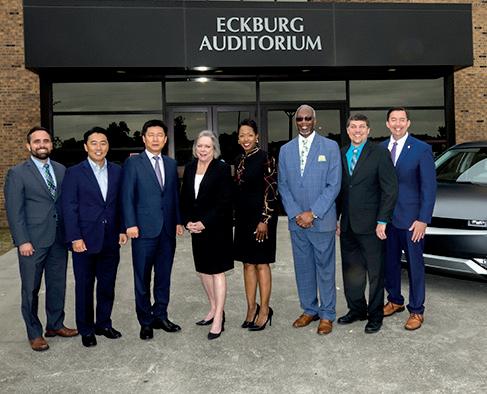
Not only do local franchised dealerships create COMPETITION in the market, they are in every corner of the state, from the mountains to the coast, offering CONVENIENT, reliable service and supporting COMMUNITIES with good jobs and charitable contributions. Looking for



Not only do local franchised dealerships create COMPETITION in the market, they are in every corner of the state, from the mountains to the coast, offering CONVENIENT, reliable service and supporting COMMUNITIES with good jobs and charitable contributions. Looking for an

South Georgia Technical College (SGTC), in Americus, is celebrating 75 years of success as an institution of higher education and 100 years of serving as an aviation maintenance training facility.
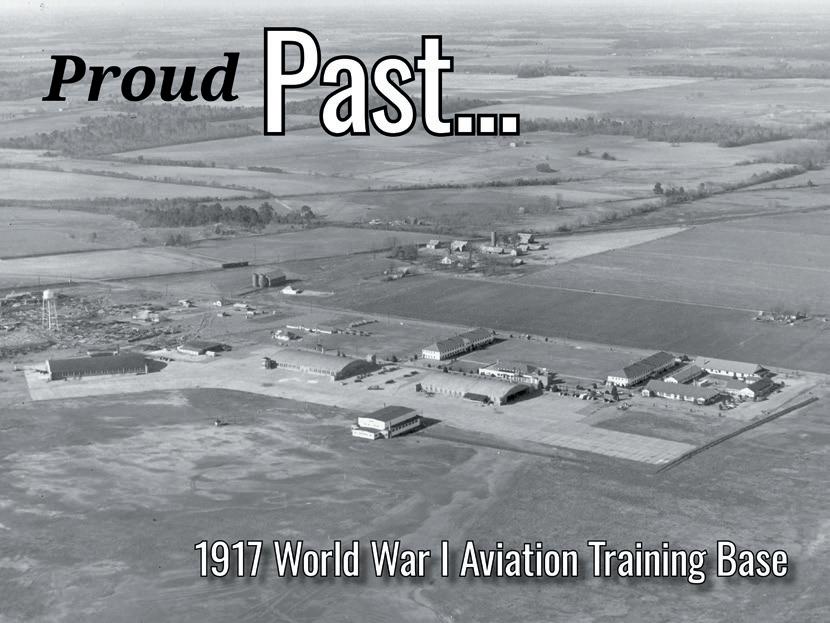
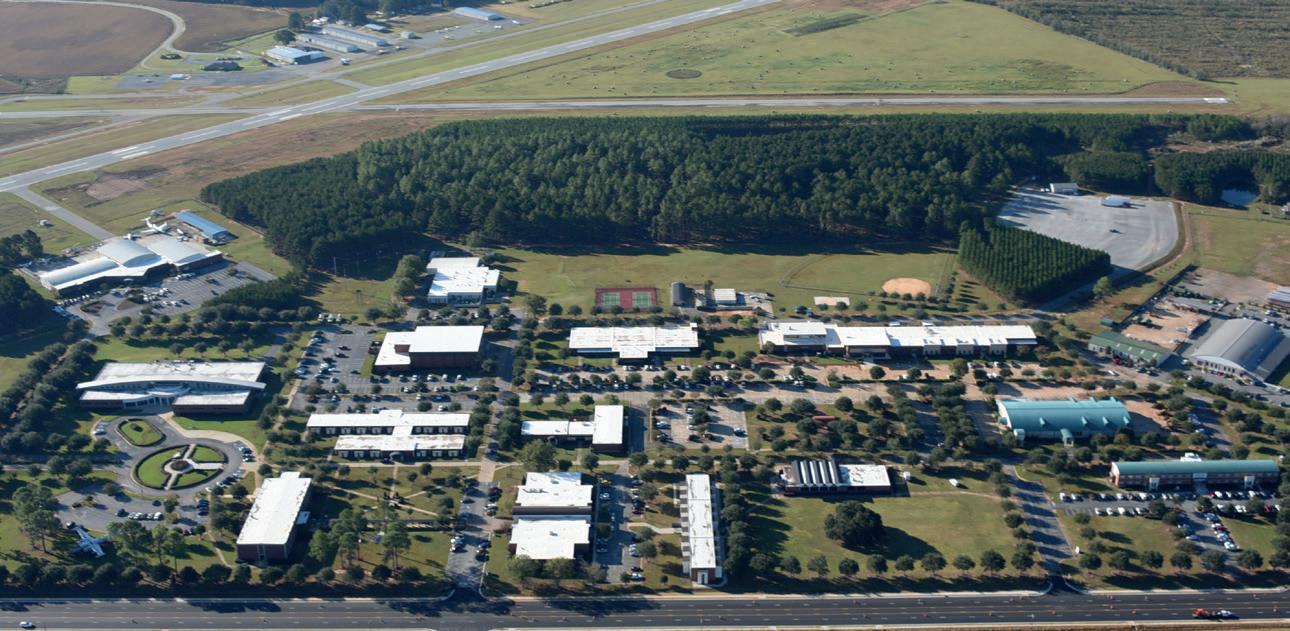
South Georgia Trade and Vocational School opened Feb. 16, 1948, offering upholstering and woodworking, basic radio service communication and code, sheet metal construction, air conditioning, diesel mechanics, automotive mechanics, general aircraft mechanics, and aircraft engine mechanics. Seventy-five students were enrolled in the first term. However, the grounds and infrastructure of the school date back 30 years prior, to 1917, when it began operation as a World War I Army Air Corps training facility. That work continued through World War II.
Versions of those original programs, as well as new educational programs, are still being offered today to provide the workforce training and education needs of businesses and industries throughout Georgia and the southeastern United States.




Today, SGTC offers over 200 different associate degree, diploma, and technical certificate of credit programs including aviation maintenance, air conditioning technology, diesel technology, automotive technology, electronics, practical nursing, electrical line worker training, precision machining and manufacturing, electrical systems technology, drafting, industrial mechanical technology, commercial truck driving, and more.
In addition to top-notch academic programs, SGTC provides students with the “complete college experience” including on-campus housing, a cafeteria, gymnasium, tennis courts, baseball/softball field, outdoor volleyball court, fish pond, and a student center complete with video
games as well as recreational and exercise equipment. The college also has nationally recognized men’s and women’s intercollegiate Division I basketball teams that are members of the National Junior College Athletic Association (NJCAA).
The college has premiere partnerships with employers such as Caterpillar, John Deere, Delta Air Lines, Robins Air Force Base, Thrush, Metro Power, Georgia Power, and other large industries, and boasts a 99% job placement rating for graduates.
The school began using buildings and property developed for the training of aviators in World War I and World War II on what was then known as Southern Field. American aviator Charles Lindbergh, who captured the hearts of the country during his successful non-stop flight from New York to Paris in the Spirit of St. Louis, on May 20, 1927, purchased his first airplane and learned to fly in May 1923 on the grounds of what is now South Georgia Technical College.
In 1948, when South Georgia Trade and Vocational School first opened its doors, Harry S. Truman was president of the United States, a gallon of gas cost 16 cents, a loaf of bread sold for 14 cents, and the technological advances that year included random access storage devices, long playing records, Velcro, and the transistor radio.
“We have come a long way in the past 75 years,” says President John Watford. “Thousands of individuals have attended and graduated from this institution over the past seven and a half decades. We are very proud of those individuals as well as the faculty, staff, and administration who have been crucial to our success. We will be celebrating these successes over the next 12 to 24 months. If you or a loved one attended this institution, we want to document your successes and experiences here.”
The Edwin I. Hatch Nuclear Plant recently donated testing equipment to Southeastern Technical College’s (STC) electronics technology program in Vidalia. The donation of digital controllers, flow transmitters, pressure switches, signal conditioners, and pressure test equipment will be used by STC students to increase their knowledge and proficiency of the equipment, which is used in the nuclear environment.
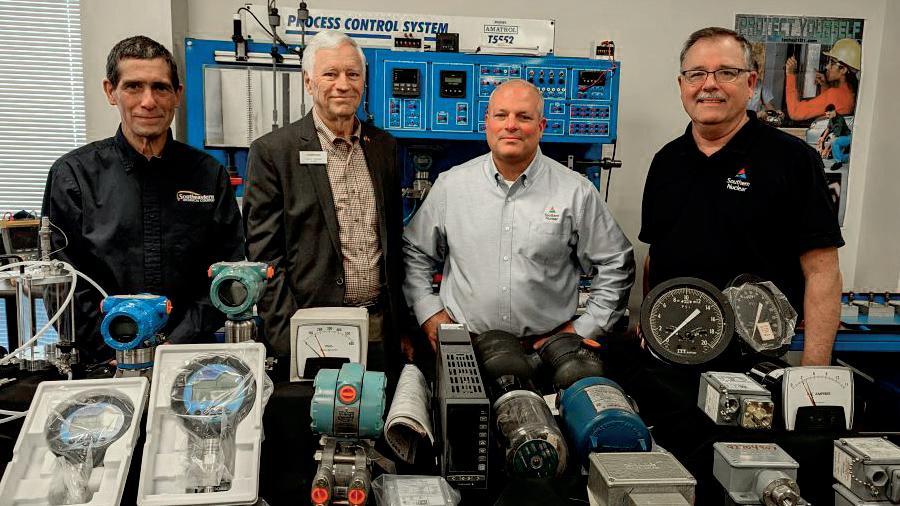
Plant Hatch Site Vice President Johnny Weissinger says, “Through the donation of this equipment, we are strengthening the technical relationship between Hatch and STC’s electronics technology program and helping to better prepare and develop interested students to enter our instrument and controls (I&C) program at Hatch, or even other locations throughout the fleet. This partnership and hands-on preparation with real-world equipment used in the nuclear industry is a win-win for the students, Hatch, and the Southern Nuclear Co. fleet.”
Weissinger engaged Southeastern Technical College President Larry Calhoun and Electronics Technology Program Director William “Chip” Greene to initiate this
partnership and the effort was brought to fruition with the help of Hatch I&C Manager Royce Clark and Senior I&C Technician Ben Campbell.
“This process control equipment donation is greatly appreciated,” says Greene. “The equipment will be immediately incorporated into our existing process controls courses to augment the students’ exposure to current equipment and devices used by our local and regional manufacturers and power industries. This will benefit both our students and employers by reducing the required training time for our graduates as new employees.”
“The equipment donated by Southern Nuclear for the STC electronics program will enable our students to get hands-on with the latest technology being used at Plant Hatch,” says Calhoun. “The modern equipment, along with our partnership, will help make our graduates better qualified for entry-level positions at one of the nation’s leading nuclear power generation operations. We look forward to continuing to grow our workforce development relationship with Southern Nuclear.”
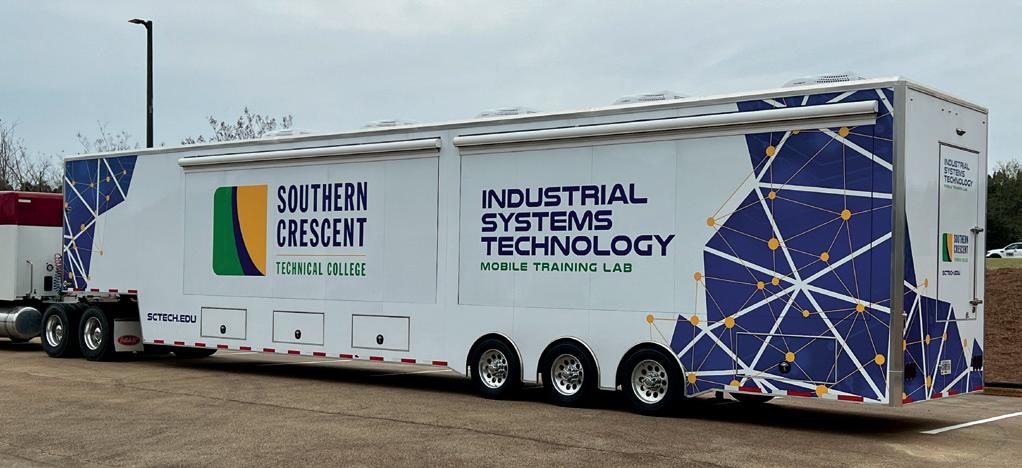
With an aging workforce and the need for skilled workers on the rise, Southern Crescent Technical College (SCTC) has responded to the call and expanded its training capabilities to include a new stateof-the-art Industrial Systems Technology Mobile Training Lab. This mobile lab, currently housed at the SCTC Butts County Center, enables credit and non-credit students to train in the high-demand career areas of industrial systems, mechatronics, and automated manufacturing and will prove to be critical to the workforce development efforts in SCTC’s eight county service area.
The mobile training lab houses a variety of training equipment used in advanced manufacturing facilities and can be transported for different training opportunities. The lab can also remain in a fixed location to provide an additional training space for students and industry partners.
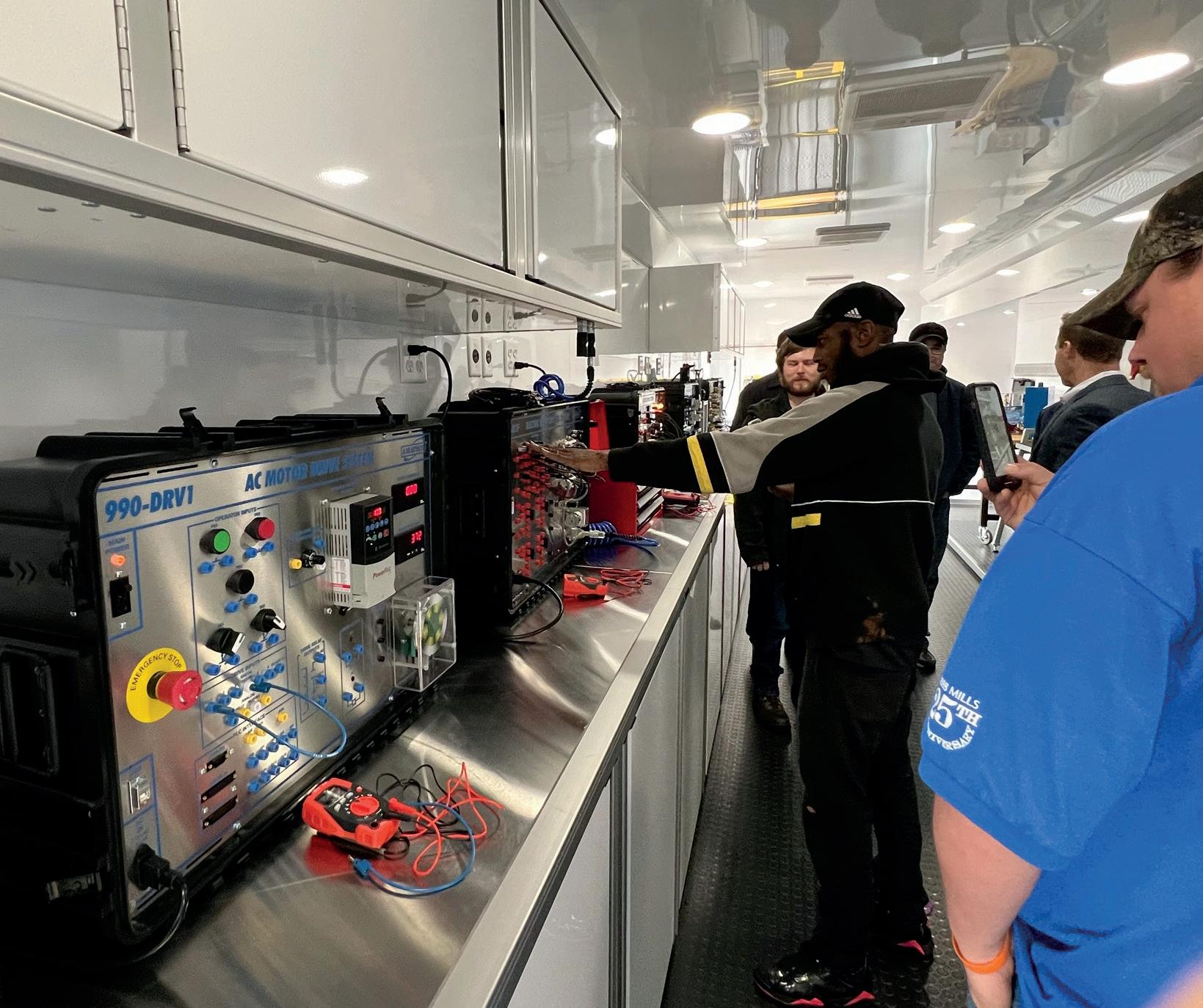
“Without a doubt, this mobile training lab with the latest industry-approved training equipment will give Southern Crescent Technical College the flexibility and tools to make a greater impact on the workforce development efforts in this region,” SCTC President Irvin Clark says. “We are committed to providing solutions to our business and industry needs and will continue to look for innovative methods to evolve and grow a qualified and highly skilled workforce.”
With the new lab, SCTC will support workforce development projects for municipalities, upskill current staff at an employer’s place of work, train job seekers looking to gain new skills, and work with the next generation to develop skills and interest. Open session mechatronics training will be offered in six-to-12-week cohorts targeting incumbent workers, as well as unemployed and underemployed workers wishing to increase their skill level.
“As Butts County recruits new industry to the area, the need for skilled labor continues,” says Bob White, executive director of the Butts County Industrial Development Authority. “The addition of this mobile training lab is a major step in providing the skill sets needed to deliver the workforce we need for our community to grow and prosper.”
“Providing our industry partners and incumbent workers with the flexibility they need, paired with skills they desire to make their businesses more successful, is a win-win for everyone involved,” says Larry Alford, south metro regional manager with the Georgia Manufacturing Extension Partnership at Georgia Tech.
“Anything that you need to know for a job in manufacturing can be taught inside this trailer,” says industrial systems technology student Timothy Holt, who works in the automation department at Coca-Cola, and hopes that the training he is receiving at Southern Crescent Technical College will help him advance his career. “I hope that more and more people will be able to train for a career using the equipment in this lab. We need more skilled labor to fill jobs, and I’m excited to see how this mobile lab will support those efforts.”
The Georgia Board of Nursing recently reported that 375 nurses earned their associate of science in nursing (ASN) at Southern Regional Technical College (SRTC) from 2019 to 2022. That number is the highest ASN graduation rate of TCSG institutions and the fourth highest among all ASN programs offered at colleges and universities in Georgia.

Georgia’s high demand for nurses continues to grow. The severe nursing shortage is due in part to a rapidly growing population and an increase in older nurse retirement. The shortage rose to critical levels during the COVID-19 pandemic, when over 100,000 nurses across the nation left their posts. Georgia is one of the states most affected by nursing scarcity, and rural Georgia is particularly vulnerable.
“Graduating well-trained, qualified nurses is mission-critical for us here in South Georgia,” says SRTC Nursing Program Chair Athalena Benton. “Hospitals, clinics, and physicians’ offices across our service delivery area depend on us to provide them with a steady stream of capable nurses who graduate prepared to care for patients.”
SRTC’s former Dean of Nursing Tammy Bryant now serves as state director of curriculum for allied health for TCSG. Currently, she is also the president of the Georgia. Board of Nursing. Bryant credits the rigor and practicality of SRTC’s nursing program with its graduation and career readiness success rates, adding that the nursing program at SRTC maintains a 100% graduate job placement rate.
“Technical education provides students with real hands-on skill and experience, which is the most important thing in nursing,” says Bryant. “SRTC’s nursing students graduate fully prepared to begin their careers in healthcare, and the program’s clinical partners recognize that.”
SRTC offers the ASN program in Thomasville and Tifton, as well as a nursing bridge program in Moultrie and Thomasville, which transitions licensed practical nurses to registered nurses. The program adheres to guidelines set forth by the Georgia Board of Nursing with a focus on strict admissions requirements and a rigorous testing regimen to produce only top performing nurses. With 11 credentialed instructors, the program upholds the student-to-faculty ratios designated by the Georgia Board of Nursing of 25:1 in the classroom and 10:1 in clinical settings. In two years or less, both tracts prepare students to graduate as practitioners who can provide safe, effective nursing care in a variety of healthcare settings.
“Graduating well-trained, qualified nurses is mission-critical for us here in South Georgia.”
- Athalena Benton, SRTC nursing program chairSouthern Regional Tech nursing students
West Georgia Technical College (WGTC) recently welcomed Delta Air Lines’ Ground Support Equipment (Delta GSE) division to the college’s Regional Workforce Training Center on the LaGrange campus to begin the next phase of their ongoing partnership.
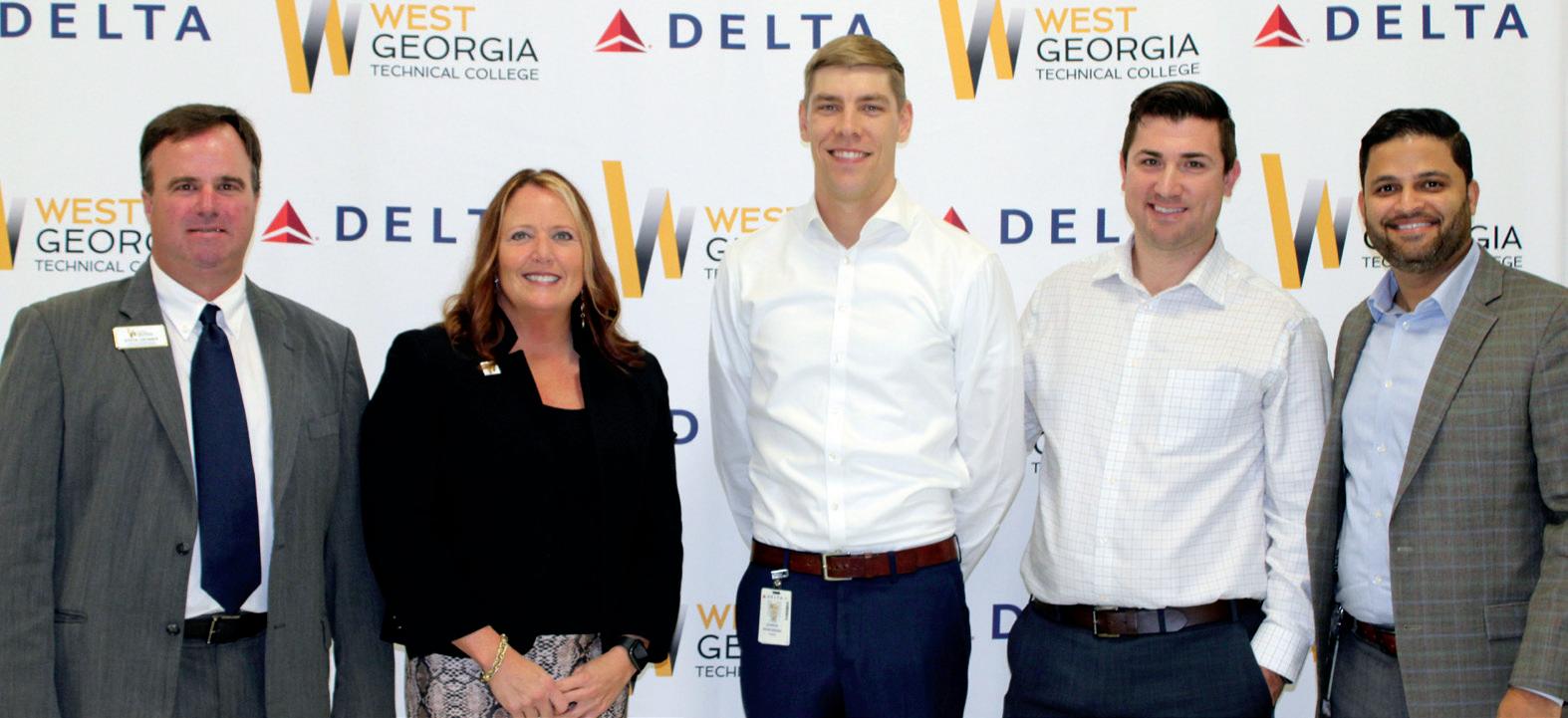
WGTC and Delta GSE announced their initial partnership in early 2022 after the college was selected to provide skills gap assessments for Delta GSE employees. Since then, WGTC precision manufacturing and maintenance instructors have performed assessments on over 650 existing Delta GSE employees from across the U.S.
The assessments provided Delta GSE data that showed specific skill gaps in the existing workforce at multiple airport locations across the United States. At the completion of the skills assessments in November 2022, and after further analysis of the data by Delta GSE, it was found that follow-up training was in the best interest of its employees to become more proficient at maintaining ground support equipment at all airports serviced by Delta.
“It is an honor to partner with Delta Air Lines,” WGTC Assistant Vice President of Economic Development Steve Cromer says. “After assessing Delta GSE employees, we were able to design an accelerated training program to enable the employees to become more proficient in their highly technical roles. The partnership between WGTC and Delta GSE highlights the mission of the Technical College System of Georgia and will ensure a well-prepared and better-equipped workforce in the short term and for years to come.”
Delta GSE employees work behind the scenes to help keep Delta’s global airline operation running smoothly by performing preventive maintenance and repairs for the huge fleet of vehicles and equipment responsible for refueling and towing airplanes, conveying luggage , de-icing airplanes, and transporting passengers.
In phase two of the partnership, approximately 800 Delta GSE employees will receive customized training from WGTC instructors in the areas of mechanical systems, electrical systems, motor controls, programmable logic control systems, and hydraulic systems.
Since January 2023, Delta has sent approximately 10 to 12 Delta GSE employees every week from across the nation to WGTC’s Regional Workforce Training Center. The employees attend multiple weeks of the training program to sufficiently cover all the identified skills gap areas. The training is scheduled to continue into 2024.
“We are honored to be tasked with training Delta GSE employees and excited to welcome them to LaGrange,” says WGTC President Dr. Julie Post. “This partnership allows us to provide pathways for these employees to grow professionally and reinforces our reputation as a premier provider of skilled employees with advanced technical training.”
Delta’s Managing Director of Airport Operations Azeem Mistry hopes the partnership will be the start of many more, as the company continues to come out of the last three years of the pandemic.
“The secret sauce of Delta has always been investment and growth,” Mistry says. “Our value proposition is truly improving the quality of lives of our people and the communities that we serve, and this partnership is a fitting example of that. This is going to be one of those investments that we make in the future of the airline and in the future of West Georgia.”
WGTC’s economic development division provides essential training to clients that want to achieve maximum results and efficiencies by building relationships with regional businesses and industries to make sure that they have access to exceptional training for their employees that is customized to their needs.
One could describe Wiregrass Georgia Technical College’s mechatronic student Brandon Howell as a modern-day renaissance man. Before Howell graduated from high school, he began his college career with the Wiregrass dual enrollment program. Since then, he has received an associate of applied science degree and a diploma in commercial electrical construction. He has also earned technical certificates of credit in basic electricity technician, electrical maintenance technology, industrial electrical assistant, industrial electrician, and industrial motor control tech. He is currently enrolled in the college’s associate of applied science degree in mechatronic technology. This renaissance man isn’t just earning degrees in the advanced manufacturing career field, he’s also taking his education and skills to the next level through an apprenticeship at Ace Electric.
Howell’s education, skills, and on-the-job training helped him win gold medals two years in a row at the Georgia SkillsUSA competition in Electrical Construction Wiring. Gold medal winners earn an opportunity to compete at the National SkillsUSA competition, and in the 2022 National SkillsUSA competition, Howell placed third in the nation in Electrical Construction Wiring.
“Ace Electric is extremely proud to be a part of Brandon’s journey in becoming an electrician. His commitment and focus through Ace’s successful apprenticeship program in partnership with Wiregrass Georgia Technical College, as well as the SkillsUSA competition, reflects in his work both in the classroom and on our job sites,” says Ace Electric Training Manager Greg Terry. “That’s why apprenticeships are essential in our
industry. Technical education and hands-on experience offer a comprehensive learning environment for students like Brandon to excel in their field. He is a model employee, and Ace is extremely lucky to have him on our team.”
“Wiregrass is very proud of Brandon and what he has accomplished while attending Wiregrass,” says Wiregrass Georgia Technical College President DeAnnia Clements. “Last summer he received the Georgia Postsecondary 2022 Dr. John L. Scott Award for Excellence in Individual Competition for having the highest individual score at the National SkillsUSA. This shows the hard work our faculty and our partners at Ace Electric have invested in this young man.”
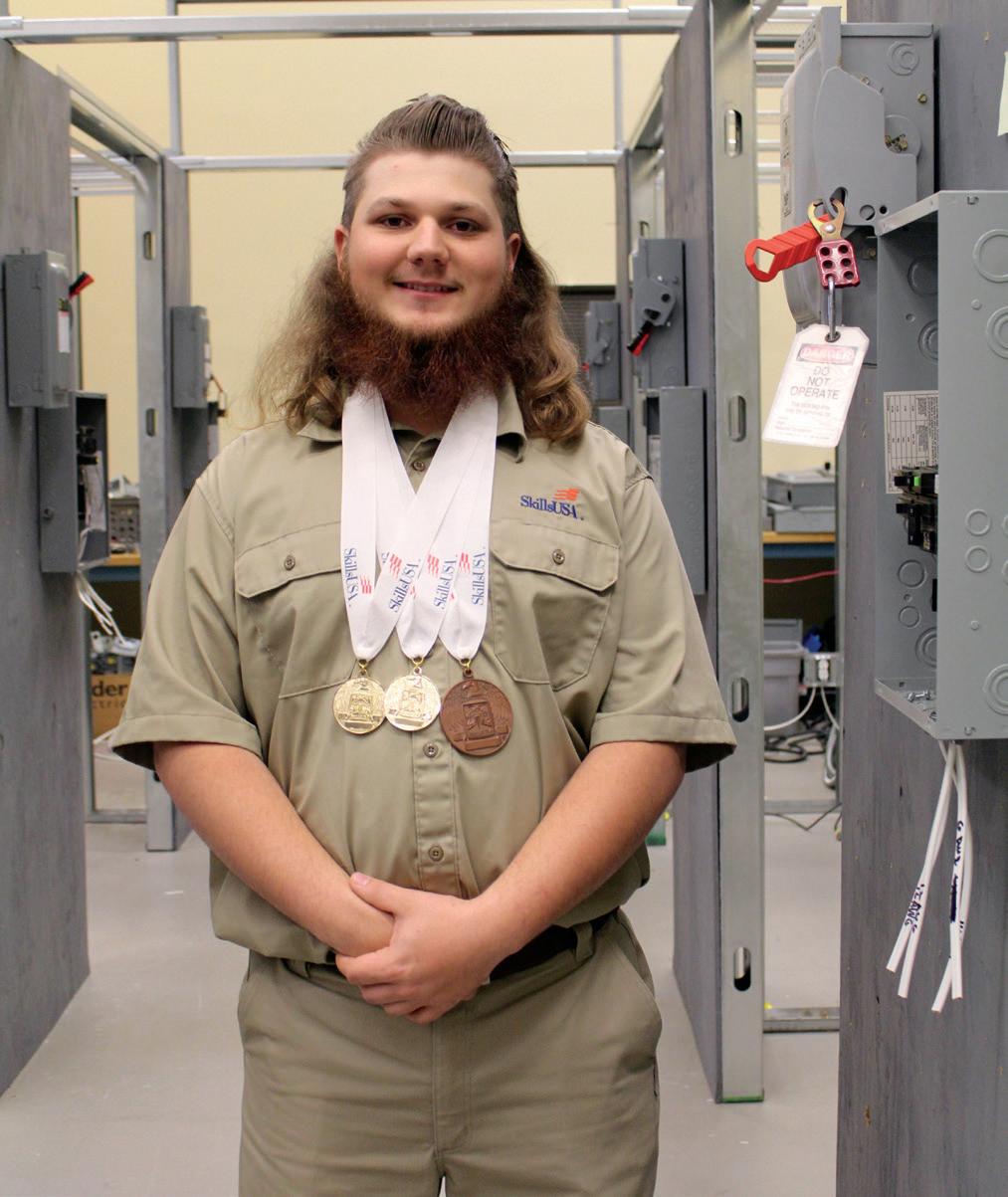
“What I am learning from Wiregrass along with my experience doing an apprenticeship with Ace Electric, is setting me up for my future by giving me classroom knowledge that I apply to real world situations that I come upon on the job,” Howell says. “My advisors and instructors at Wiregrass were the ones who encouraged me to compete in SkillsUSA, and they supported me on my journey throughout my competitions. The college has prepared me for the workforce by having excellent instructors and hands-on training utilizing equipment that is used in the industries.”
Howell took advantage of the education, skills development, and on-the-job training opportunities offered to all students at Wiregrass Tech. When he graduates again from Wiregrass, he will have positioned himself not only as one of the top electrical construction wiring professionals in the nation, but as a proficient employee in the fast-moving world of advanced manufacturing.
In Georgia, we’ve invested more than $5.3 billion in our wireless and wireline networks from 2020 to 2022.

At AT&T, we have invested in our communications networks, our people and communities across Georgia for nearly 145 years. We are committed to doing our part to bring connectivity, and the economic opportunity that comes with it, to more Georgians. That’s why, in Georgia, we invested more than $5.3 billion in our wireless and wireline networks from 2020 to 2022. Keeping communities connected. At AT&T, it’s how we do business.

THAT’S WHY WE INVESTED $1M WITH THE TECHNICAL COLLEGE SYSTEM OF GEORGIA TO IMPROVE AND EXPAND ACCESS TO COMMERCIAL DRIVER’S LICENSE TRAINING
